National Geographic content straight to your inbox—sign up for our popular newsletters here
- THE BIG IDEA

Why travel should be considered an essential human activity
Travel is not rational, but it’s in our genes. Here’s why you should start planning a trip now.

In 1961, legendary National Geographic photographer Volkmar Wentzel captured two women gazing at the surf off Peggy’s Cove, Nova Scotia. This and all the other images in this story come from the National Geographic image collection.
I’ve been putting my passport to good use lately. I use it as a coaster and to level wobbly table legs. It makes an excellent cat toy.
Welcome to the pandemic of disappointments. Canceled trips, or ones never planned lest they be canceled. Family reunions, study-abroad years, lazy beach vacations. Poof. Gone. Obliterated by a tiny virus, and the long list of countries where United States passports are not welcome.
Only a third of Americans say they have traveled overnight for leisure since March, and only slightly more, 38 percent, say they are likely to do so by the end of the year, according to one report. Only a quarter of us plan on leaving home for Thanksgiving, typically the busiest travel time. The numbers paint a grim picture of our stilled lives.
It is not natural for us to be this sedentary. Travel is in our genes. For most of the time our species has existed, “we’ve lived as nomadic hunter-gatherers moving about in small bands of 150 or fewer people,” writes Christopher Ryan in Civilized to Death . This nomadic life was no accident. It was useful. “Moving to a neighboring band is always an option to avoid brewing conflict or just for a change in social scenery,” says Ryan. Robert Louis Stevenson put it more succinctly: “The great affair is to move.”
What if we can’t move, though? What if we’re unable to hunt or gather? What’s a traveler to do? There are many ways to answer that question. “Despair,” though, is not one of them.

In this aerial view from 1967, wall-to-wall seaside sunbathers relax under umbrellas or on beach towels in Ocean City, Maryland .

A 1967 fall festival in Guadalajara, Mexico , starred traditionally costumed musicians and dancers.
We are an adaptive species. We can tolerate brief periods of forced sedentariness. A dash of self-delusion helps. We’re not grounded, we tell ourselves. We’re merely between trips, like the unemployed salesman in between opportunities. We pass the days thumbing though old travel journals and Instagram feeds. We gaze at souvenirs. All this helps. For a while.
We put on brave faces. “Staycation Nation,” the cover of the current issue of Canadian Traveller magazine declares cheerfully, as if it were a choice, not a consolation.
Today, the U.S. Travel Association, the industry trade organization, is launching a national recovery campaign called “ Let’s Go There .” Backed by a coalition of businesses related to tourism—hotels, convention and visitor bureaus, airlines—the initiative’s goal is to encourage Americans to turn idle wanderlust into actual itineraries.
The travel industry is hurting. So are travelers. “I dwelled so much on my disappointment that it almost physically hurt,” Paris -based journalist Joelle Diderich told me recently, after canceling five trips last spring.
(Related: How hard has the coronavirus hit the travel industry? These charts tell us.)
My friend James Hopkins is a Buddhist living in Kathmandu . You’d think he’d thrive during the lockdown, a sort-of mandatory meditation retreat. For a while he did.
But during a recent Skype call, James looked haggard and dejected. He was growing restless, he confessed, and longed “for the old 10-countries-a-year schedule.” Nothing seemed to help, he told me. “No matter how many candles I lit, or how much incense I burned, and in spite of living in one of the most sacred places in South Asia, I just couldn’t change my habits.”
When we ended our call, I felt relieved, my grumpiness validated. It’s not me; it’s the pandemic. But I also worried. If a Buddhist in Kathmandu is going nuts, what hope do the rest of us stilled souls have?
I think hope lies in the very nature of travel. Travel entails wishful thinking. It demands a leap of faith, and of imagination, to board a plane for some faraway land, hoping, wishing, for a taste of the ineffable. Travel is one of the few activities we engage in not knowing the outcome and reveling in that uncertainty. Nothing is more forgettable than the trip that goes exactly as planned.
Related: Vintage photos of the glamour of travel

Travel is not a rational activity. It makes no sense to squeeze yourself into an alleged seat only to be hurled at frightening speed to a distant place where you don’t speak the language or know the customs. All at great expense. If we stopped to do the cost-benefit analysis, we’d never go anywhere. Yet we do.
That’s one reason why I’m bullish on travel’s future. In fact, I’d argue travel is an essential industry, an essential activity. It’s not essential the way hospitals and grocery stores are essential. Travel is essential the way books and hugs are essential. Food for the soul. Right now, we’re between courses, savoring where we’ve been, anticipating where we’ll go. Maybe it’s Zanzibar and maybe it’s the campground down the road that you’ve always wanted to visit.
(Related: Going camping this fall? Here’s how to get started.)
James Oglethorpe, a seasoned traveler, is happy to sit still for a while, and gaze at “the slow change of light and clouds on the Blue Ridge Mountains” in Virginia, where he lives. “My mind can take me the rest of the way around this world and beyond it.”
It’s not the place that is special but what we bring to it and, crucially, how we interact with it. Travel is not about the destination, or the journey. It is about stumbling across “a new way of looking at things,” as writer Henry Miller observed. We need not travel far to gain a fresh perspective.
No one knew this better than Henry David Thoreau , who lived nearly all of his too-short life in Concord, Massachusetts. There he observed Walden Pond from every conceivable vantage point: from a hilltop, on its shores, underwater. Sometimes he’d even bend over and peer through his legs, marveling at the inverted world. “From the right point of view, every storm and every drop in it is a rainbow,” he wrote.
Thoreau never tired of gazing at his beloved pond, nor have we outgrown the quiet beauty of our frumpy, analog world. If anything, the pandemic has rekindled our affection for it. We’ve seen what an atomized, digital existence looks like, and we (most of us anyway) don’t care for it. The bleachers at Chicago ’s Wrigley Field; the orchestra section at New York City ’s Lincoln Center; the alleyways of Tokyo . We miss these places. We are creatures of place, and always will be.
After the attacks of September 11, many predicted the end of air travel, or at least a dramatic reduction. Yet the airlines rebounded steadily and by 2017 flew a record four billion passengers. Briefly deprived of the miracle of flight, we appreciated it more and today tolerate the inconvenience of body scans and pat-downs for the privilege of transporting our flesh-and-bone selves to far-flung locations, where we break bread with other incarnate beings.

Landscape architects work in their Rio de Janeiro, Brazil , studio in 1955.

A tourist photographs a towering century plant in St. Thomas, U.S. Virgin Islands, in 1956.
In our rush to return to the world, we should be mindful of the impact of mass tourism on the planet. Now is the time to embrace the fundamental values of sustainable tourism and let them guide your future journeys. Go off the beaten path. Linger longer in destinations. Travel in the off-season. Connect with communities and spend your money in ways that support locals. Consider purchasing carbon offsets. And remember that the whole point of getting out there is to embrace the differences that make the world so colorful.
“One of the great benefits of travel is meeting new people and coming into contact with different points of view,” says Pauline Frommer, travel expert and radio host.
So go ahead and plan that trip. It’s good for you, scientists say . Plotting a trip is nearly as enjoyable as actually taking one. Merely thinking about a pleasurable experience is itself pleasurable. Anticipation is its own reward.
I’ve witnessed first-hand the frisson of anticipatory travel. My wife, not usually a fan of travel photography, now spends hours on Instagram, gazing longingly at photos of Alpine lodges and Balinese rice fields. “What’s going on?” I asked one day. “They’re just absolutely captivating,” she replied. “They make me remember that there is a big, beautiful world out there.”
Many of us, myself included, have taken travel for granted. We grew lazy and entitled, and that is never good. Tom Swick, a friend and travel writer, tells me he used to view travel as a given. Now, he says, “I look forward to experiencing it as a gift.”
Related Topics
- TRAVEL PHOTOGRAPHY
- VINTAGE PHOTOGRAPHY
You May Also Like

Don’t rely on social media: Here’s why you should keep a travel journal

How to take perfect portrait photos

What's new in London's museums ahead of King Charles III's Coronation

Explore 6 of history’s most infamous scams and hoaxes

We swapped baths for showers—but which one is better for you?

An antique process helps this photographer capture coastlines bound by Celtic soul

Do you have an inner monologue? Here’s what it reveals about you.
- Environment
History & Culture
- History & Culture
- Coronavirus Coverage
- Mind, Body, Wonder
- Paid Content
- Terms of Use
- Privacy Policy
- Your US State Privacy Rights
- Children's Online Privacy Policy
- Interest-Based Ads
- About Nielsen Measurement
- Do Not Sell or Share My Personal Information
- Nat Geo Home
- Attend a Live Event
- Book a Trip
- Inspire Your Kids
- Shop Nat Geo
- Visit the D.C. Museum
- Learn About Our Impact
- Support Our Mission
- Advertise With Us
- Customer Service
- Renew Subscription
- Manage Your Subscription
- Work at Nat Geo
- Sign Up for Our Newsletters
- Contribute to Protect the Planet
Copyright © 1996-2015 National Geographic Society Copyright © 2015-2024 National Geographic Partners, LLC. All rights reserved
7 Personal Benefits of Travel
:max_bytes(150000):strip_icc():format(webp)/greg-rodgers-adventure-ed92646b25f247049e53af6d36f6c15f.jpg)
Forget milling around in your finest evening wear, Singapore Sling in hand: You'll be lucky to get peanuts. Flying isn't quite the party it was in Sinatra's days, and lots of time, energy, and money are expended to leave home, so why travel? How long do the personal benefits of travel last?
Getting away from home and stepping outside of your usual routine is beneficial for both mind and body. The long-lasting personal benefits of visiting a foreign country far outweigh the costs and time to get there.
The great travel writer Pico Lyer said: "Travel is not really about leaving our homes, but leaving our habits." Here are seven ways that travel, especially international travel, will enhance your life.
Travel Sharpens the Mind
You've done your old routine for so many years that you could run through it on autopilot. Being dropped into a new environment engages a dormant part of your mind and gets those synapses firing again.
Suddenly, you'll be required to navigate unfamiliar places, read foreign languages , try new things, make quick decisions, and choose your new eating and sleeping schedule.
Unlike at home, all the new sights, sounds, and places will require mental processing and filing. Your brain will welcome the workout! Once you return home, you'll be sharper than ever for better organizing and sprucing up your daily routine.
A Shift in Perspective
"Nobody comes back from a journey the way they started it." — Unknown
Being exposed to new cultures and people will greatly shift your paradigm and create a healthier perspective once you return back home. Seeing different social classes creates compassion and really makes you feel more blessed and content. Large portions of the world's population have to deal with daily threats such as hunger, disease , and landmines .
A hard day at work suddenly doesn't seem so bad when you see people in developing countries toiling in sun-scorched fields from morning to dark, or begging for a drink of water.
A Chance to Try New Things
"Do not follow where the path may lead. Go instead where there is no path and leave a trail." — Ralph Waldo Emerson
While you may branch out at home from time to time by trying new restaurants or splurging on expenditures, traveling kicks you out of the comfort zone and forces you, for better or worse, to try new things!
Even if you don't enjoy your first attempt at scuba diving , at least you'll be able to relate in a new way the next time you see it in a movie or hear someone talking about it.
Becoming a well-rounded individual enhances self-confidence and will help you find new material for conversation in social settings with a wider variety of people.
Who knows, you may accidentally discover your new favorite food or find out that you want to pursue a new career in karaoke!
Meet New People
"A journey is best measured in friends, not in miles." — Tim Cahill
You'll meet far more friendly people on the road than you will under ordinary circumstances at home.
Other travelers are always looking to share experiences, give tips on places to go, and meet people from all over. Striking up a conversation with other travelers is extraordinarily easy.
A polite "so where are you from?" breaks the ice quite easily and may lead to lasting friendships with people from all over the world.
See the Real Deal
"To travel is to discover that everyone is wrong about other countries." — Aldous Huxley
Until you visit a place and form your own opinions, your understanding only comes from what you were taught in school, read in books, or saw on media, which may or may not be a complete truth.
Don't over-research your upcoming destination in guidebooks. Do your best to avoid building a bias toward a place or installing mental filters before you visit. Wait to form your own opinion, remaining objective until you can make up your own mind.
Exercise and Sunshine
Sure, you could just go sweat in the gym under fluorescent lighting, but chances are that you'll be much more active from day to day while on the road, regardless of whether your trip is an adventurous one or simply a relaxing beach trip .
You could be exploring new cities on foot, hiking , swimming, walking between places, and hopefully soaking up some needed sunshine while doing so. And it's guaranteed to smell better than the gym.
Come Home Renewed
After stepping away from home for a while, you'll return with renewed energy, a new set of mental filters, and ready to take on the next big project or challenge. Call it a life reboot.
Getting away for some time, even though it requires effort, will greatly enhance your attitude and productivity once you return home. Sure, you may have some mail piled up and matters to attend, but those are simple challenges easily knocked out.
Breaking up the monotony for a while is a great way to reduce stress and give your life an injection of excitement. Don't be surprised if shortly after your return, you're already counting down days until the next trip!
11 Ways to Beat Your Post-Travel Depression
9 Tips for Traveling With Kids During the Pandemic
The Pros and Cons of Solo Travel
Travel Editors and Writers Share Their Favorite Food Crawls for 7 US Cities—From New Orleans to Austin
Bike Travel Is Surging Around the World. Will It Last?
The Good and Bad of Pokemon Go for Travelers
The 10 Best Places to Buy Luggage of 2024
Tips and Advice for Dealing With Homesickness
10 Hotel Add-On Charges to Avoid
The Unexpected Perks of Solo Travel
What Documents Do I Need for Mexico Travel?
I Went on a 60-Day Duolingo Streak Before My Trip to France—Here's How It Went
Zicasso Travel Agents Offer Custom Vacations for Adventurous Travelers
Tips for Traveling Solo With a Tour Group
What Is the Future of Couchsurfing?
9 Best Travel Apps for a Great American Road Trip

- [ April 12, 2024 ] Empowering Vulnerable Communities in Uganda Africa
- [ April 12, 2024 ] Humanitarian Volunteering in the Peruvian Andes Children
- [ April 11, 2024 ] Health and Equality for Women in Congo Ethical Volunteer
- [ April 5, 2024 ] Best Rated Yoga Retreats in Europe Articles
- [ January 18, 2024 ] Teach Art at Artistic Center in Tanzania Africa
Travel for Good
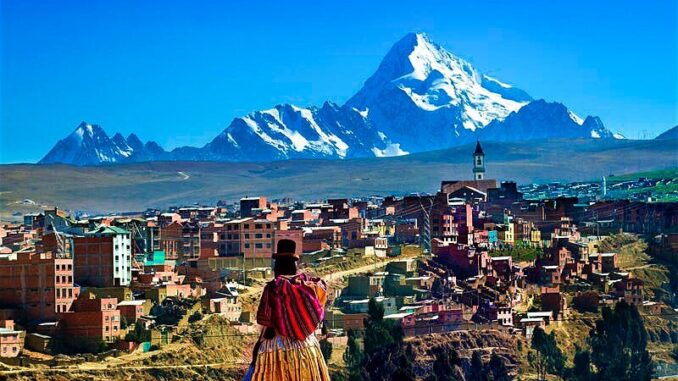
Travel for Good Meaning
There is not a one-size-fits-all policy when it comes to travelling. Addressing the question of how can I travel for good requires tapping into understanding the very reason you are embarking on a journey before you’ve even left the door.
Travel has the power to impact not only yourself but those that you cross or surround you before, during and even after you travel. You may be influenced to travel for a good cause after research has led you into discovering some impact you are passionate about. You travel to do good in supporting the initiation and playing your role in carving its path to, in return, carve your own.
Perhaps the good meaning is how exploring a new destination makes you feel. How stepping foot in a completely different setting ignited by new sceneries, smells and tastes make you feel. You travel for that good feeling.
Why Would You Travel for Good?
Travel can be a force for good.
We have already seen that travel can be a force for good. If you choose to travel purposefully, the impact on the local communities can be huge. Not only does community-led travel lead to unique experiences, but it also allows you to learn and engage with new cultures whilst making a positive impact. By being directly involved with a community or project that betters the destination, you see first-hand the future social and economic development that your involvement is making on the community. Remember, you are always a guest in these locations, and you will learn and grow far more than you can give. This approach is one of the most rewarding feelings!
Travel for Personal Growth
Travel has external benefits on the community that surrounds you. But, the internal impacts of travel on personal growth can be profound. Travel helps broaden the mind and teaches you lessons you can’t learn sitting at home. Whilst there can be negative and positive aspects of travelling, all of these will help you build confidence.
The confidence that travel enables you is perhaps one of the most rewarding things. Whether that be by taking the plunge into a wilder ocean, you would never have dared to dive into on home soil. It’s a moment that connects you even more to yourself and the country.
Perhaps you experience personal growth from a negative experience. You get lost in the midst of a medina-like city, or you lose a valuable item. You have to take your own initiative to solve the situation, which, in doing so, allows you to grow. Whilst these moments may seem awful at the time, the growth that it enables is truly transformational!
Travel for Good Food
One of the greatest perks of travel is that it awakens the senses. There are so many joys we experience at the moment as we travel. You travel for good company, for good food, and good music. You travel to immerse yourself into something you may never have dreamed of engaging with before. If you’re ever in two minds about travelling to a particular spot, try the local cuisine. Do it! Food puts you in a heightened state that will increase the intensity of the memories you make and cherish at that moment forever.
Travel for Good Ideas
Travel can inspire a new way of thinking that may transform your future travel experiences. Engaging with projects abroad may inspire you to do the same on home soil or in a completely new destination. There are many forms of travelling for good meaning. We’ve described some of the examples below and how they differ so you can decide what best fits your needs.
Social Enterprises
Social enterprise-powered travel enables you to support a project where a community need has been identified, and your impact is directly assisting in cultivating a solution. A social enterprise requires active engagement and an in-depth level of involvement. In doing so, this connects you on a deeper level with the people of the destination at hand. It creates one of the richest travel experiences by cultivating interaction, participation and exchange with locals.
Conservation Travel
Conservation travel creates a deep connection for travellers with nature by supporting the protection of the land. It ensures that money infused into travel goes towards the maintenance and support of natural wildlife and lands. Multiple organizations pioneered this form of travel, including WWF and ATTA, who use innovation to align the industry with nature conservation.
Ecotourism is a form of travel that unites social enterprises and conservation travel into one entity. Essentially, it’s responsible travel to natural areas that sustain the well-being of local people through communication and education whilst also conserving the natural environment. Engaging with ecotourism allows you to assist in building environmental and cultural wellness with locals and nature. It can be both a positive experience for visitors and hosts and creates memorable travel experiences.
Locally run initiatives
You can also travel for good by visiting and supporting locally run initiatives and opportunities. When travelling, it’s always good to support smaller projects where the locals are at the heart of initiating the change. It’s a great way to travel for good as it means that residents can earn directly from the initiative whilst also learning key entrepreneurial and social development skills.
Travel for Good Destinations
Want to travel more responsibly, but you’re not sure where to start or go? We’ve got some great suggestions. Check out some of our favourite places that will set you on the right track for getting started.
Responsible Tourism in Tanzania
Tanzania has launched an initiative to encourage and promote a more sustainable tourism industry standard that focuses on protecting the culture and natural environment. Tourism businesses are supported toward a more sustainable economic business practice. It’s a good idea to keep an eye out for tourism initiatives associated with the RRT. That way, you know they have already gone through the relative processes to be more responsible in their approach to tourism.
Community-based Tourism in the Bolivian Amazon
Community tourism is one of the best ways to truly connect with local culture. In the Bolivian Amazon, it’s possible to visit the Chalalan Ecolodge, a joint initiative created in 1995 to provide employment opportunities through nature-based tourism. It was founded with Conservation International, which trained villagers in a broad range of management and tourism activities. It’s a great way to be involved with a community-based tourism initiative knowing that the income is going directly to the families.
Ecotourism in Costa Rica
You can find some great Ecotourism opportunities whilst travelling in Costa Rica. We’ve already highlighted the Monteverde Butterfly Gardens , which protects over 30 species of butterfly. They even offer a 10-week volunteering programme. If you don’t have time for that, taking a tour of their beautiful gardens is a great way to support the project.

Conservation Tourism in the Caribbean
We’ve already told you about The Wider Caribbean Sea Turtle Conservation Network (WIDECAST) in this article . Initiatives like these are great to get involved with and often have programmes to participate in the conservation process. For example, with WIDECAST, your work can be anything from monitoring the nesting areas to assisting with the hatching process if you hit the right season. It’s a great way to not only assist in protecting the environment but educate yourself as you travel.
Volunteer Abroad Grants
Volunteering is a great way to travel for good without spending so much money to do so. In fact, volunteering abroad has been globally recognized as a great way to broaden your horizon and enrich the lives of those you meet along the way. Thanks to this recognition, you can find lots of grants that give every individual an equal opportunity to have this experience, as they can sometimes be expensive. You can find a great list as a resource from goversease.com here .
Travel for Good Quotes
Looking for some inspiring phrases to kickstart your travelling for good? You can check out a few of our favourite awe-inspiring phrases below.
- “The real voyage of discovery consists not in seeking new landscapes, but in having new eyes.” Marcel Proust.
- “Responsible travel is not only better for our world, it’s also more interesting and memorable. Responsible tourism is the future of travel.” Simone Reeve.
- “Tourism is important because it can create sustainable local economies. I’d much rather have 1,000 tourists going up the Tambopata than 1,000 gold miners.” Frans Lanting.
- “Don’t destroy what you came to enjoy.”
So now you’ve discovered what it means to travel for good meaning. What form of good-meaning travel appeals to you most? Feel free to share your thoughts in the comments section below.
Found this article useful? Pin it!
1 Trackback / Pingback
- 7 Unique Ways to Document Your Travel Adventures | True Travellers Society
Leave a Reply Cancel reply
Your email address will not be published.
Save my name, email, and website in this browser for the next time I comment.
This site uses Akismet to reduce spam. Learn how your comment data is processed .
Copyright © 2024 | MH Magazine WordPress Theme by MH Themes
Science & Environment
- History & Culture
- Opinion & Analysis
- Destinations
- Activity Central
- Creature Features
- Earth Heroes
- Survival Guides
- Travel with AG
- Travel Articles
- About the Australian Geographic Society
- AG Society News
- Sponsorship
- Fundraising
- Australian Geographic Society Expeditions
- Sponsorship news
- Our Country Immersive Experience
- AG Nature Photographer of the Year
- Web Stories
- Adventure Instagram
Travel for good

In 2023, ‘sustainable’ is more than just a buzzword. With the post-Covid resumption of travel, many travellers are choosing a different, gentler path. They’re giving extra consideration to how their travels affect the environment, other cultures, and the socioeconomic bottom-line of their destinations.
Not just another passing fad, sustainable and conscious travel is now mainstream.
But what does it actually mean?
What is sustainable travel?
Internationally, the lead organisation for conscious travel is the Global Sustainable Tourism Council (GSTC), a not-for-profit organisation that sets criteria that act as global standards for sustainability in tourism.
While the concept of sustainable tourism may immediately bring to mind environmental aspects, according to the GSTC, the term encompasses four pillars. These are sustainable management, socioeconomic impacts, cultural impacts and environmental impacts.
Sustainable travel overlaps with many other terms. Conscious travel means actively thinking about where, when and the way we travel, and eschewing mass tourism. Cultural travel refers to travelling to learn about, and benefit those from another background. Slow travel is seeking immersive experiences rather than quick box-ticking, and regenerative travel means leaving a place better than you found it. All of these approaches to travel have the goal of travelling ‘for good,’ and increasingly, data show this is how people want to travel.
What travellers want
In 2022, Tourism Australia conducted a research project across prospective travellers in 20 key international markets. The results showed that over 75 percent of respondents were committed to sustainability in some way.
A broad range of sustainable practises were important to the respondents when travelling, including ethical treatment of wildlife, respecting and preserving the cultural heritage of a destination, supporting local businesses, off-setting carbon emissions and protecting natural environments.
Significantly, when presented with a range of experiences, around 80 per cent of respondents chose the more sustainable option.
Phillipa Harrison, managing director of Tourism Australia explains that while Australia has always attracted visitors for its fauna and environment, sustainability is now a factor in decision-making.
“Sustainable practises by tourism operators are no longer a nice-to-do, they are good business hygiene, and sustainability is no longer pigeon-holed as just environmental. It encompasses understanding of impact on culture and community too.”
These sustainable tourism operations do impact positively on the communities in which they operate. For example, Luxury Lodges of Australia, a portfolio of high-and lodges and camps operating in regions across Australia has measured their reach.
Penny Rafferty, executive chair of Luxury Lodges of Australia, explains the lodges deliver over 250 experiences.
“In order to do that, they partner with over 4000 other local businesses, from wildlife and specialist guides, Traditional Owners, transport and experience operators, artists, distillers, winemakers, food producers and craftspeople,” she says. “That is an enormous halo effect.”
The rise of cultural travel
According to Phillipa Harrison, another encouraging result of Tourism Australia’s recent survey was the increased attention given to Indigenous tourism.
“In terms of Australia’s tourism offering there is a very strong connection between sustainability and cultural travel, with our First Nations people arguably the pioneers of sustainability, with more than 60,000 years as custodians of country,” she says.
Phillipa explains there is increased awareness that Indigenous experiences can be found all over Australia, encompassing traditional and also contemporary experiences.
“Whether it’s exploring the coastline at Port Stephens on a quad bike with Sand Dune Adventures, to doing the Burrawa Bridge Climb experience, scaling the heights of the Sydney Harbour Bridge with an Indigenous guide, there is so much to do and experience.”
Further encouraging the growth of cultural tourism, various Indigenous tourism bodies are promoting businesses around the country.
Rob Taylor is the chief executive officer of the West Australian Indigenous Tourism Operators’ Council (WAITOC), and says in 2016, there were 65 Aboriginal tourism businesses in WA, mostly in the Kimberley. In 2023, the state is home to over 180 Aboriginal tourism businesses, an Aboriginal tourism academy and a dedicated business hub.
“You think about remote communities where there’s not much chance to make money,” Rob says. “Tourism allows them to keep culture alive by sharing language, sharing their knowledge while staying on country and earning money to live by, so I think it is an important industry.”
According to Rob, Covid-19 accelerated growth for Indigenous tourism in WA.
“The majority of Australians have never been on an Aboriginal tour, and wouldn’t have a clue what’s in their backyard,” Rob says. “But when the borders were closed, some of the areas like up in the Kimberley were even busier than when the borders were open because Western Australians couldn’t go anywhere else. So people were going to those areas and basically doing Aboriginal tours because it’s one of the things they probably haven’t done before.”
Beyond merely a fun holiday experience, Indigenous tourism can play a vital role in wider cultural understanding and reconciliation.
“Most Australians don’t know the real Aboriginal culture,” Rob says. “They only know what they see in the news, which is usually bad things. Just as many bad things happen with non-Indigenous people, but it seems to be highlighting all the bad things rather than all the good things. I think if they’re going along and learning about Aboriginal culture, they’ll better understand.”

Greenwashing versus sustainable
With sustainable travel now front of mind for so many travellers, it has become a lucrative sector. Many would like to cash in on the trend, and this can sometimes lead to false or embellished sustainability claims.
The term ‘greenwashing’ describes these dubious claims, and for many travellers, deciphering the greenwashing from genuinely ethical travel experiences can be a minefield.
One method of choosing a sustainable operator is to ask questions. Look for tourism operators who have committed to measurable achievements, rather than overarching statements, and are willing to engage in conversations on the topic.
Another way to travel more consciously is to seek tourism providers with a meaningful sustainability accreditation.
Internationally, many accreditations exist, of varying quality. In Australia, two companies offer programmes recognised by the GSTC, namely EarthCheck and the not-for-profit Ecotourism Australia. Both companies administer rigorous certification standards around conscious travel, and choosing a tourism provider displaying one of these certifications helps to guarantee the activity is sustainable.
Ecotourism Australia has been working in the conscious travel sector for more than 30 years. Initially, the focus was the Eco Certification programme, which certifies nature-based tours, accommodations and attractions.
Elissa Keenan, chief executive officer of Ecotourism Australia, explains that with the rise of conscious travel, the concept itself has evolved to more fully encompass GSTC’s four pillars of sustainability; social, environmental, cultural and economic factors.
“It’s not just about environment, although it’s incredibly important in terms of minimising impact,” Elissa says. “For example, people now have a far higher expectation that their travel positively impacts the local community.”
In recent years, Ecotourism Australia has expanded to recognise sustainability efforts across non-nature-based tourism businesses. Companies like breweries, city hotels and non-nature tours can now apply for the Sustainable Tourism accreditation.
Acknowledging that many business owners may not know where to begin their accreditation journey, Ecotourism Australia, in partnership with Tourism Australia has launched a new programme called Strive 4 Sustainability.
“Tourism operators are hearing this buzzword sustainability, but they’re not quite sure what to do with it,” Elissa says. “We’re hoping that this programme starts to demystify what that means. It’s really designed to answer the question for operators which we hear all the time – where do I start?”
The programme provides operators with a scorecard across the four pillars of sustainability, and advice on how to improve.
For some travellers, finding a sustainable tourism operator is not enough, and they prefer to visit a region where sustainability is embedded in the community. Ecotourism Australia now certifies Eco Destinations, and in 2019 the Port Douglas Daintree area, QLD, became the first destination accredited. The other certified Eco Destinations are Margaret River WA, Coffs Coast NSW, Central Coast NSW and Bundaberg, QLD, with many more applications in the pipeline.
Achieving Eco Destination status is a rigorous process, usually taking several years.
“Generally, the application is led by the local council,” Elissa explains. “The reason for that is because it includes so much about their infrastructure in terms of waste, water, and energy. But it also requires an absolute commitment from the regional tourism authority and from local businesses, really working together.”
According to Elissa, the benefit for the consumer is clear.
“What it says for a traveller is this is a destination that’s really committed to their sustainability journey,” she says. “They’re not necessarily just about visitor numbers and how to maximise them.”
Similarly, EarthCheck offers various science-backed certifications for nature-based and non-nature-based tourism operators and destinations. EarthCheck also has a sustainability academy, with micro-courses to help people and businesses embed sustainability into their organisations, including a design certification to assist developers to construct sustainable buildings.
The flying issue
Globally, aviation accounts for around 2.5 percent of all CO 2 emissions. With Australia’s vast and isolated geography, aviation is the elephant in the room. While many airlines offer passengers the chance to offset their carbon emissions by contributing towards tree planting, it can be sometimes difficult to ascertain their effectiveness.
The International Air Transport Association (IATA) represents airlines globally and has facilitated an industry movement to reduce aviation emissions to net zero by 2050.
Daniel Bloch, assistant manager of sustainable aviation fuel (SAF) for IATA says biofuel-based SAFs will be the major contributor to reducing sector emissions until at least 2035. The SAF biofuels are made from feedstock, the first generation of which were typically food-grade crops and oils, which could potentially distort the agricultural economy.
Second generation feedstocks use various forms of waste fats, such as inedible animals fats, used cooking oil and trap grease, which would otherwise need disposal.
However even these waste fats are in limited supply, and third generation feedstocks are emerging; naturally or regularly occurring wastes from agriculture, woody residues, municipal solid waste and landfill. It can contain animal, food or human waste and even plastic.
“That really is an important distinction with biofuels,” Daniel says, “The feedstock is the determining factor in just how sustainable the biofuel will be. In essence, we want to be repurposing inputs that would have otherwise not have been utilised and sent to landfill or incineration, which in turn corresponds with a carbon emitting output.”
Along with a developing market for small electric aircraft, planes may soon be powered by green hydrogen, with Airbus already releasing prototypes. But for now, Qantas and Airbus, are planning to establish an Australian SAF industry and the Australian government has announced funding for a SAF Council, aimingto drive a domestic SAF industry.
Ways to travel consciously
Aside from aviation, there are already ways conscious travellers can choose more sustainable options. Many travellers seek to minimise their carbon footprint by reducing fossil fuel usage, and a people-powered mode of transport is an excellent choice.
Travellers may take a self-guided cycling tour of the Clare Valley wineries in South Australia, explore Western Australia’s Ningaloo Reef by kayak, or discover Tasmania’s best multi-day hikes. There are many bonuses to these forms of travel, including the meditative connection to nature that comes from a quiet, slow journey compared with rushing through multiple destinations.
In pre-pandemic days, cruising was an estimated five billion-dollar industry for Australia, and Australians are the biggest cruising nation per capita. While the cruise industry itself is not famous for its sustainable practices, expedition cruising in particular (the more adventurous cruises to wild places) is finding new ways to be greener.
Several companies have incorporated hybrid diesel-battery technology, which is said to reduce carbon emissions by 20 percent. Engine heat is recycled to the cabins and water heaters. Kitchen waste and sewage are fed to the ship’s bio-digesters where enzymes reduce waste to a benign sludge.
Growing environmental awareness sees education and scientific research taking centre stage. Passengers join science lectures and participate in citizen science projects, such as seabird surveys and water quality checks.
Citizen science is on the rise in other tourism contexts, too, and the Great Barrier Reef offers prime examples. The programme called Eye on the Reef offered by many tour operators, asks visitors to upload photos from their snorkelling or dive experience to an App, which records where certain rare species, or pest species like the crown-of-thorns starfish, have been sighted. The information gathered helps to inform reef management.
The Great Barrier Reef is also home to regenerative tourism opportunities. Guests can be a ‘marine biologist for a day’ joining reef surveys, and divers can get hands-on with coral restoration projects, attaching pieces of naturally broken corals to a frame to help restore areas damaged by climate change or natural processes.
Other purposeful travel on the Great Barrier Reef includes visiting the Turtle Rehabilitation Centres at Fitzroy Island or at the Cairns Aquarium, where injured or sick turtles are cared for and hopefully released. Entry fees fund the necessary resources to rehabilitate the threatened turtles.
Regenerative travel is happening on the land too, including the restoration of wildlife habitat. In Victoria, visitors can join the not-for-profit Koala Clancy Foundation to plant koala habitat trees.
For those who don’t want to get their hands dirty, there are ways to support others regenerating the land.
Many food and wine producers are opting to heal their degraded properties by farming in ways that are gentler on the land, using integrated pest management (like employing ducks to eat the snails), permaculture (where all organic waste is recycled into usable nutrients) and reducing chemical usage. Travellers can connect with these producers at farm-to-table restaurants or by visiting organic cellar doors.
Even some huge cattle and sheep stations are trying to heal the damage of decades of overgrazing. In Western Australia, the owners of Wooleen Station are supplementing their income with tourism while they vastly reduce stock and grazing pressure on their land, offering hosted stays in their historic homestead and regenerative agriculture tours.
Indigenous tourism is often intrinsically linked to regenerative activities. Near Cairns, the Mandingalbay Hands On Country Eco Tour combines a boat ride from the city with a Traditional Owner-guided walk through the bush tucker-filled rainforest and visitation funds important Indigenous ranger projects.
Even large city hotels are now expanding sustainable initiatives beyond merely offering to not wash your towels to ‘save the environment.’ Travellers can book a hotel that has reduced single-use plastics, through initiatives like swapping disposable amenities bottles for larger, refillable bottles and replacing plastic bottled water with filtered tap water. Some accommodation providers are supplementing fossil-fuel usage with solar, and some are utilising smart technology to save power, with sensors that power-down air conditioners when you step out of the room.
While there are many ways in which travellers and operators can tread more lightly on the planet and care for cultures, sustainability is a journey.
According to Penny Rafferty, any progress deserves encouragement, and positive or constructive feedback is always useful.
“Don’t let perfection be the enemy of good,” she says.
With the continued evolution of how we travel, maybe one day the term ‘sustainable travel’ won’t need to exist. Instead we’ll just have ‘travel,’ and its conscious nature will be implied.

Floating first
Colour fills the skies above Northam, Western Australia, as the Top Guns of the balloon world chase glory in the Women’s World Hot Air Balloon Championship.

An unexpected Pacific paradise
Visiting Micronesia’s islands and atolls offers an unexpected rare glimpse into remote communities steeped in centuries-old cultural traditions.

Go beyond: the ultimate guide to outback travel
Exploring the outback is a rite of passage for adventurous Aussie families. Here’s all you need to know for a successful, safe and fun experience.
Watch Latest Web Stories

Birds of Stewart Island / Rakiura

Endangered fairy-wrens survive Kimberley floods

Australia’s sleepiest species

The Joy of Travel – 20 Reasons Why Travelling is Good for Your Career, Personal Growth and Soul
By Author Rossi Thomson
Posted on Last updated: 5th September 2022
Categories Lists , Travel , Travel Experiences
Travelling seems to be the buzzword on everybody’s lips these days.
With cheap flights and options that vary from short city breaks and luxury staycations to round-the-world trips, it has never been easier (or more affordable) to pack a bag and go. For a day, a weekend, a week, a month or even more.
Seeing amazing architecture, admiring centuries-old pieces of art, tasting new foods and accumulating memorable experiences to last you a lifetime becomes a quasi-addiction that you are only too happy to feed.
I call it The Joy of Travel .
In other words, that indescribable feeling you get when you make the first step on a new journey to discover yet another portion of the world. It doesn’t matter if the journey is of a thousand miles or much, much less. What matters is that it makes you feel alive.
Yet, soon the people around you (like parents, employers and close friends) may start questioning your choice to travel.
- Why do you spend so much money on travelling ? Don’t you have a mortgage to pay?
- Why do you need to go there when you have all that you may want at home? Did you know that they don’t sell marmite in shops abroad?!
- Why do you need to go on another city break this year? Haven’t you already been to three?
- Why are you dragging your kids to yet another museum with art by people we have never heard of? Don’t you know that kids simply want to play?
- Why did you take a sabbatical instead of concentrating on your career?
- Why there is a gap in your CV? It seems like you value having fun over working hard.
- What if we hire you and then you leave our company in order to travel more?
These are all difficult questions that everyone who loves travelling has been pressurised with. At least once. Often, countless times.
Yes, on the surface, regular travelling may seem disruptive to an established daily routine which includes family obligations and a good job. It is also draining in terms of money and paid vacation time.
Yet, travelling gives you so much more in return. From the deeply satisfying feeling of being connected to other people and the world to an improved skill set and higher stress threshold.
So, in order to help you deal with those nagging and niggling questions about your travel habits which you may be getting from friends, relatives, colleagues and your (current or potential) boss, here are twenty reasons why travelling is actually good for you.
Read on, enjoy, and use as appropriate!
The Joy of Travel –
20 reasons why travelling is good for your career, personal growth, and soul, 1. travel helps you hone your decision-making skills.
With so many options in terms of travel, you quickly learn to make complex decisions about where to go and when, what accommodation to book and what sights to see. You know that you can’t cram it all into a couple of days, so you precision-pick what you are interested in and what is not your cup of tea. You learn to have at all times several variables in mind. For example:
- money – how much you can afford to spend on accommodation, food and sightseeing;
- distance – how far from your point of interest you can stay; and
- time – how many hours you have at your disposal at each place on your schedule.
The more you travel, the more you hone your decision-making process.
Sooner, you find it easier to make decisions with regards to everything else in your life. At work, this streamlined approach and the ability to juggle several variables and different outcomes is what sets you apart from the rest.
2. Travel Helps You Develop Your Research Skills
Research is a big part of both study and work processes nowadays. The ability to research new ways to do things and having the skills to find out what your competitors are up to can be the decisive factor between failure and success. Both in business and your personal life.
Well, have you noticed how much research you need to do everytime you plan a trip?!
From finding the best tickets in terms of time slots and prices to discovering those hidden gems that all the other tourists miss, a well-conducted research is at the basis of your successful trip.
You can easily transfer your research skills from your travels to your job: monitoring industry leaders’ websites for promotions, discovering blogs and articles by local experts, unearthing little-known bits of information both online and in print.
Research helps save money and find valuable data. Being good at research will take you to the forefront of your field.
3. Travel Helps You Learn to Better Communicate Your Expectations
You can’t be reticent when you travel, especially if you travel as a couple or as a part of a group.
Failing to tell your partner that you really, really want to visit a particular sight may lead to your not seeing it all. People rarely are able to read minds and get tired of always having to ask you what you want to do. Plus, you usually have limited time at each destination. And, once you have left it, you may never have the chance to go back.
So, you quickly learn to communicate exactly what you want to see and do during a particular trip.
Making your expectations clear is a valuable skill in any work environment. It puts everybody on the same page as to what needs to be done and achieved. It also helps prevent conflicts or misunderstandings as no-one likes to have to second-guess what people around them think.
4. Travel Helps You Develop Your Negotiation and Compromise Skills
All this is very good but what happens when you and your travelling partner expect different things from a trip (assuming that you communicated them clearly to one another – see point 3 above).
This is when you soon develop your negotiation skills. You agree to do one thing as long as they agree to something proposed by you. You suggest that you are happy to go to the sea, but it would be nice if next year they come to the mountains with you.
Or, if everything else fails, you both agree to spend a bit of time apart. So, you go to the museum you have always wanted to see and your partner relaxes by the pool all morning book in hand.
It’s all a question of achieving mutually acceptable compromises. Which make travelling so much more enjoyable.
Being a good negotiator can open many professional doors for you. From being able to negotiate the best salary and perks for yourself to being in control during a difficult meeting with a supplier, it all comes down to seeing what the other party is offering, knowing what your limitations are and then marrying both as best as possible without you or the other side losing face.
5. Travel Helps You Fine-Tune Your Organisational and Scheduling Skills
Once you have settled on a destination, it’s time to begin the planning stage. Soon, you become a master of compiling complex schedules. After all, you want to experience the joy of travel to the max. So, even after a strict elimination process, you still pick to do many, many things within one day. In all honesty, back home it would take you weeks to complete the same number of activities.
Still, anything is possible, you reassure yourself. You can definitely:
- arrive early morning;
- drop your stuff at ‘Left Luggage’ at the train station;
- queue (while the queue is still tiny) to climb to the top of Bruneleschi’s dome of the Gothic Cathedral of Santa Maria del Fiore;
- spend a moment in the adjacent Baptistry;
- walk up to Accademia, pick your pre-booked ticket and simply fall in love with Michelangelo’s David;
- then walk down to Palazzo Vecchio and Piazza dei Signori;
- admire the statues in the Loggia della Signoria;
- pick your pre-booked tickets and spend a spellbinding hour and a half in the Uffizi Gallery;
- walk down to Ponte Vecchio to see the views and the goldsmiths’ shops;
- then pop down to Michelangelo’s birth house followed by a quick visit to the Cathedral of Santa Croce in order to see the tombs of some of Italy’s most notable sons;
- have a sit-down meal at a local restaurant tucking into some Tuscan delights;
- pick your luggage and get on the train to Pisa that same evening; and
- book into your hotel for a good night sleep.
Based on a day I planned for myself and spent in Florence, Italy some years ago. It all worked like a charm and was interspersed with lots of gelato-eating, photo-taking, and window-shopping, too.
Even if your travel style slows down with time, this ability to organise your day and schedule activities in an organic manner (taking in consideration local opening times, the influx of tourists and the walkable distances in town) is a valuable skill.
Being organised, efficient and able to set up and follow a schedule is something to be proud of and it certainly helps a lot both in your family and professional lives.
6. Travel Helps You Be More Flexible and Think on the Spot
Things happen when you least expect them. This seems especially valid when you are on the road.
Last summer our flight from Treviso, Italy to Stanstead, England was canceled just past midnight.
What to do? We spent the night at a hotel (paid by the air company) and in the morning we travelled close to four hours to Bergamo where we were placed on another plane. Then, in accordance with the legal framework, we claimed compensation and, after several phone calls and emails, were paid a small amount for our troubles.
It was inconvenient, unpleasant, and very, very hot. We were travelling with a small child and some rather heavy luggage. But there was nothing we could do to make the plane come pick us up from Treviso airport. Instead, we adjusted ourselves to the situation and managed to reach England after all.
The ability to be flexible is highly valued. Knowing that in spite of your best efforts and adherence to plan, things can still go wrong, will free up space in your mind to think on your feet. This way you are able to react according to the actual circumstances rather than in line with what you want to be happening right now.
7. Travel Helps You Understand the Power of Money and Budgets
Two euros (or pounds) for a coffee doesn’t sound that much. A new top and a new bag are the order of the day when you need a little bit of cheering up. Unfortunately, these spontaneous expenses quickly add up and then you wonder why you are always short of cash towards the end of the month.
When you really want to travel and have amazing experiences, you soon realise that the only thing that stops you from doing it is not having enough money. After all, transport, insurance, accommodation, and food are not free.
Hence, you soon start not only to save any spare euro that you have but also to judge the necessity of each purchase through the prism of your travel plans. A new pair of earrings for 10 euros?! This equals your food budget for a day in a far-flung place. A night out on the town costing you at least 50 euros?! This may buy you a slightly more comfortable hotel room rather than having to stay at a hostel again.
In other words, you quickly learn to prioritise your purchases and to meticulously budget for your time abroad.
On the other hand, once you are at your destination, you are only too aware that not sticking to your daily budget can be the difference between having a great time and finding yourself in financial trouble far away from home. With no immediate support network to help you along, spending above budget 20 euros frivolously every day may be the difference between eating the last few days of your trip or not.
Being good with money and being able to stick to budgets are highly valuable skills both in personal and professional plans. At a time of overconsumption and of companies cutting corners only too willingly, being able to show that you are a dab hand at prioritising expenses and saving money may be your strongest feat.
8. Travel Helps You Sharpen Your Eye for Bargains
In this financial line of thought, travel can also help you develop an uncanny ability to spot a bargain from a hundred feet.
Buying a combined ticket for three sights will save you one third of their individual prices? Done! Waiting for the sales in order to get a new cabin-size suitcase and save 50% off its original price? Excellent!
At the same time, you soon start to differentiate between a real bargain and a false one.
Buying something in a package may not always translate into financial savings. Especially, if due to lack of time, you only end up doing one of the pre-paid things.
Real bargains are great not only for the money you save but also for giving you that fabulous feeling that you have gotten extra value against a portion of the full price.
Knowing the shortcuts and the techniques for achieving bargainous prices will help the budgets of both your family and your company. This will earn you praise and more available money to spend on other (hopefully travel-related) stuff.
9. Travel Helps You Get Out of Your Comfort Zone
People tend to stick to what they know. Be it other people, fashion styles, and even places.
This is why being the newcomer in a tight-knit group can be such a daunting prospect. And why some people tend to spend their every holiday over thirty years at the same resort.
When you embrace the joy of travel for what it really is, i.e. exploring the world and its many different faces, rather sooner than later you need to get out of your comfort zone.
- You may need to get up really early in order to catch a plane. Even though you may not be an early riser at all.
- You may need to approach people and ask in a foreign language (and mainly with your hands) how to get from point A to point B. Even though you are anxious just thinking about talking to strangers.
- You may need to get your point across when you are unhappy about a service. Even though you are non-confrontational to a fault.
Travelling gets you places and most of them are beyond the confines of what you know. Being able to navigate the unknown is a valuable skill and state of mind.
It makes you more self-assured, more confident, more open to the world.
Well-based confidence can give you a competitive edge and get you far ahead on your career path.
10. Travel Helps You Find Creative Ways to Overcome Obstacles
Obstacles may present themselves at any time when you travel.
It could be:
- luggage not arriving at the same time as you;
- weather that is not as nice as the forecast promised;
- large crowds visiting the same sights as you even though the travel guidebook that you read promised that they were off-the-beaten-track.
It could be anything, really. For example, many people come to Italy expecting it to be always sunny and nice outside. But here (especially in Northern Italy) it rains and even snows. So, what to do when you imagined sun-soaked walks, gelato in hand, but instead you are faced with a downpour.
Well, instead of locking yourself in your hotel room and complain on social media about the injustice of it all, you put your creative hat on. You capitalise on things that the country is famous for and which are weather-impervious. Like Italy has lots of thermal baths and spas, large expos, cooking classes, great indoor places for children to play, and so much more that can be done inside (see the full list here , in fact).
This ability to come up with creative solutions to obstacles which may threaten to derail your plans will come in handy in your professional endevours, too. Capitalising on your travel experiences, you may be the person to come up with an out-of-the-box suggestion as to how to overcome a problem your company is facing.
11. Travel Helps You Learn How to Mediate Between People
When you travel with other people (family, colleagues or friends), sooner or later there will be a situation which will make everyone jump against everybody else.
One of your group wants to go to the beach and another wants to shop?! Cue an argument that can spoil the whole day.
Stepping in with a calm head and mediating between people can dissipate the stress. Allowing everyone to express how they feel and setting up firm but fair rules for a respectful exchange is a difficult task but someone has to do it. If you accept the challenge and don’t let emotions rule, everyone will be thankful and much happier at the end of it all.
Mediation is a valuable skill. Knowing when to let people talk and helping them express themselves in a constructive manner will earn you kudos at work and at home.
12. Travel Helps You Expand Your Horizons
Have you ever thought that your country has the best art, the most interesting history and the best looking and most hospitable people?
Well, travel can change your set ideas about the world.
You may come to realise that people have different ways to do the same thing. That certain foods taste better abroad. That every country has unique nature, beautiful art, and lovely people. Just like yours.
This enriches your soul and makes you more appreciative of things which before you might have easily dismissed.
Travel helps you expand your expectations of the world. Hence, you are better prepared to work in a multicultural environment and have a stronger foundation to deal with a team with diverse cultural norms.
13. Travel Helps You Experience a Sense of Purpose and Achievement
In a world overloaded with information which makes us question how happy we are with what we have, travel can bring us closer to that elusive feeling of feeling content.
There is nothing better than the sense of achievement after a long day of exciting sightseeing when, in a short amount of time, you have seen so much.
Be it a visit to an art gallery to enjoy the company of the Old Masters. Be it a hike through a gorgeous place. Be it a food tour savouring your way through the flavours of a nation.
Travel can really make you feel purposeful and full of energy. After all, travelling for most people equals achieving their dreams of seeing certain fabled places and experiencing them for themselves. There is nothing better than having your dreams become reality.
Having this sense of purpose and achievement makes you a happier, calmer person, too. And it propagates into all of the different spheres of your life.
14. Travel Helps You Develop Your Interests
Chances are you travel to places that interest you in order to see things that interest you, too.
Often, lost in the stress of daily life, the first thing we forget to take care of is our hobbies and our personal interests. We may not notice it at first, but making time for them becomes more and more difficult when faced with a demanding family and job.
Travel may be the only chance we get to reconnect with what is important to us.
I used to have a very stressful, high-power job that kept me chained to the computer up to 12 hours a day. Monday to Friday with the weekends often taken over, too. Going on short breaks to Italy to experience its art, food and sun helped me stay sane. Just knowing that Venice was only two hours away from London and that I could easily get there and see all that artistic beauty was enough to give me a bit of respite.
Other people travel in order to practice their photography, to eat new foods, to develop their artistic skills.
When we are too caught in our daily lives, travel opens a little bracket allowing us to re-centre on ourselves, to think about what we want to do with our lives. It also gives us the impetus to start making the changes we need in order to focus more on our own interests (both creative and purely personal).
15. Travel Helps You Awaken Your Creativity
Faced with the exuberance of the world, your heart and your soul soon begin to need to be surrounded by colour and excitement every waking moment.
It could be something as simple as buying colourful fabrics and authentic souvenirs abroad in order to give your home a touch of happiness and creativity.
Or, it could be that after a while you may begin to feel a desire to replicate on home turf the wonderful things that you’ve seen on your travels abroad.
For example, many people are inspired to start a business after falling in love with a particular destination. From importing its food to organising trips to it – the sky is the limit when you feel the creative sparkle in your soul.
I started my blog Rossi Writes led by my excitement of having just moved to live in Italy . Three years later I am still at it and writing has been a great outlet for me during moments of feeling bleak and down.
16. Travel Helps You Get Physically Active
In a world where spending all your time in front of a computer is an acceptable way to lead your life, travel gets us moving.
Getting from point A to point B requires that we leave the house and get on a plane (or train, car, boat). Then, once at our destination, we use our feet to get to know it.
By walking around we see the most exciting, most beautiful things. It could be a walk through a museum; it could be a hike through a stunning landscape. The important thing is that we use not just our mind, but also our body in order to experience the world.
17. Travel Helps You Test Your Resilience to Stress
Being able to work under pressure is a basic job requirement these days. We are supposed to be able to juggle several things at once both at work and home. Obviously, without breaking a sweat.
Travel is the perfect school to test and increase our resilience to stress.
Starting with expecting the unexpected and learning to deal with it, and ending with mastering the communication process with people from different cultures and with different attitudes, travel throws at us many curveballs at any one time.
It may feel scary at the start, but you soon adapt yourself to it all. From learning that eating on your own at a restaurant is not an insurmountable task to not expecting that everything and everyone has to stop to tend to your needs. Travel is character-shaping and -strengthening.
18. Travel Helps You Become More Aware of Health and Safety
At home you may be living in a safety bubble guaranteed first by your parents and then by your partner and/or community. Travel can shift your perspective about the world.
Soon you learn to read people and situations better and to make decisions based not on emotions and fleeting wants but on how safe the experience will be. You learn to keep your guard up. You realise that you are in charge of your decisions and your belongings.
You stop seeing yourself as a fragile flower that needs constant supervision and help. Instead, you act as a grown-up person who can stand up for herself and judge a situation based on observed and perceived dangers.
From simple things like deciding where to eat based on hygiene to much more complicated situations when you need to decide in a split second how to extricate yourself from some potentially unpleasant circumstances, you learn to trust your sixth sense. To appreciate how safe the environment is and to take only measured risks.
19. Travel Helps You Appreciate What You Have
At the end of a trip (be it of several weeks or a day-long) there is nothing better than getting back to your own bed. At least for me.
Having witnessed what the world has to offer – from its most beautiful, most inspiring offerings to its (sometimes) darker side – you begin to look at home with different eyes.
You may have been unsatisfied with your lot in life, but having seen how other people live (and still smile no matter what), you learn to value so much more what you, yourself, have achieved.
What you have may not be loads, but suddenly just it being there, waiting for you to return, becomes a driving force.
Travelling is great! Having something or someone to return to is what gives you roots.
20. Travel Helps You Feel More Connected
Travelling – actively exploring new places and learning about them – makes you feel more connected with the world as a whole. You observe and learn how other people, other cultures live. And through the contact with them, you connect better both with your inner self and those around you.
Through the different experiences you have abroad you learn more about yourself – what makes you tick, what makes you happy and what makes you sad. Through this knowledge, you feel more committed to yourself as a person, more willing to stand up and fight for your dreams.
Through the positive experiences you accumulate when you travel, you feel more engaged with humanity. More open to other people, their stories and their point of view.
And this connection, this feeling of being alive, of belonging is what gives us the strength to continue forward.
Thank you for reading! Please, leave me a comment, pin the image below or use the buttons right at the end to share it on social media.
For more stories like this you can follow me on Facebook and subscribe to my weekly strictly no-spam newsletter.
angeladowdy
Friday 22nd of January 2021
Hi Rossi, I am so impressed with this article! Would you possibly allow me to use some quotes from this ...I'm writing an article about The Joy of Discovery through Travel ! I would certainly give you the credit. Also you can have a look at my website https://embracesouthernstates.com/ (focus on Southern USA). Exciting to find a soul who shares my JOY !!
Dear Angela,
Thank you for your comment and for your kind words about my blog post. You are very welcome to place a link to my article in your writing. Unfortunately, I don't allow direct quotes in line with the advice of the copyright attorney who helped me after a large number of my blog posts and photos were stolen. Thank you for your understanding.
Best wishes,
Sunday 24th of February 2019
Wow....amazing article, Rossi! Absolutely loved it! Spot on, insightful, so well written - I’d always thought travel was good for the soul and fostered personal growth (not to mention aiding in understanding people of other cultures which in turn promotes PEACE), but until reading your article I didn’t realize in just how many ways it can make you a better, stronger, smarter, more self reliant person! Travel rocks! And it’s sooo much more fun than sitting in a classroom... Also, I agree with all your “20 Reasons” and found myself thinking several times, “...that is SO true! I never thought of it that way...” when thinking about my own experiences with travel. Travel is a marvelous teacher. I’m so glad I found your blog.
Monday 25th of February 2019
Thank you for your very kind words, Lisa! I am glad that my blog post resonated with you. I wrote it very spontaneously and had a lot of fun putting it together. It's nice to know that somebody else finds it interesting. Best wishes,
Sonia M Checchia
Friday 27th of April 2018
I can't tell you how much I love this article. Thank you.
Saturday 5th of May 2018
Thank you very much for your very kind words. I really enjoyed writing this blog post. :) Best wishes, Rossi
Sharing is Caring
Help spread the word. You're awesome for doing it!

- GENERAL TRAVEL

Why Travel?

Julia is an avid traveler, lifelong artist, theater geek, interior designer, future author, and o...
- button]:border-none [&>button]:bg-white [&>button]:hover:cursor-pointer [&>button]:hover:text-cyan-400"> button]:hover:text-cyan-400 [&>button]:bg-white hover:cursor-pointer" height="1em" width="1em" xmlns="http://www.w3.org/2000/svg">
There are as many reasons to travel as there are mountains to climb and sunsets to admire: to learn, to grow, to become, to breathe fresh air, to see new horizons, to dive into new depths, to hear strange words. But, don’t take my word for it— there are plenty of philosophers and fellow travelers out there that will back me up as to why traveling is good, and just how important meaningful travel is .
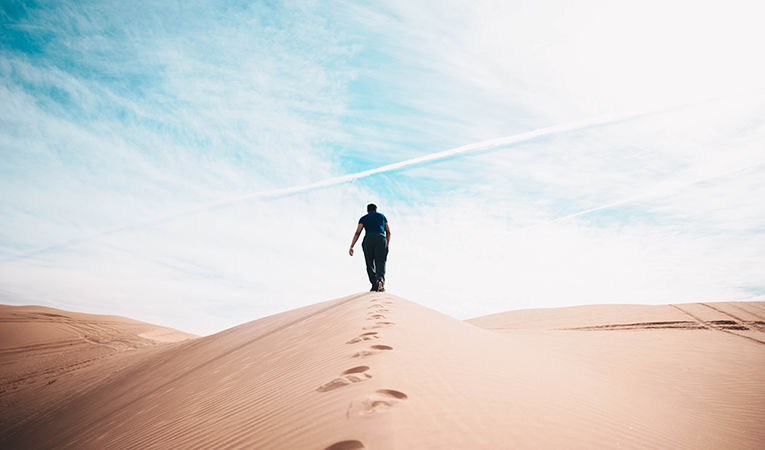
“I travel not to go anywhere, but to go. I travel for travel's sake. The great affair of moving." Robert Louis Stevenson
Travel writer Paul Theroux claims that “...the wish to travel seems to me characteristically human: the desire to move, to satisfy your curiosity or ease your fears, to change the circumstances of your life, to be a stranger, to make a friend, to experience an exotic landscape, to risk the unknown.”
Robert Louis Stevenson says, “I travel not to go anywhere, but to go. I travel for travel's sake. The great affair of moving."
Activist and novelist Lisa St Aubin de Terán wrote, “...it might be said that a great unstated reason for travel is to find places that exemplify where one has been happiest. Looking for idealized versions of home— indeed, looking for the perfect memory.”
Yet, when all is boiled down to a single drop, we travel to define: ourselves, the world, and life. With each footstep, this definition can change. It is a definition that is open-ended, one that is influenced by every experience and new border crossing. It is a definition without a clear answer, and one that will keep evolving as long as we keep traveling.
It is also the most valuable definition that we will write, as it gives significance to all of our interactions. Even if the meaning itself changes, its importance remains undisputed:
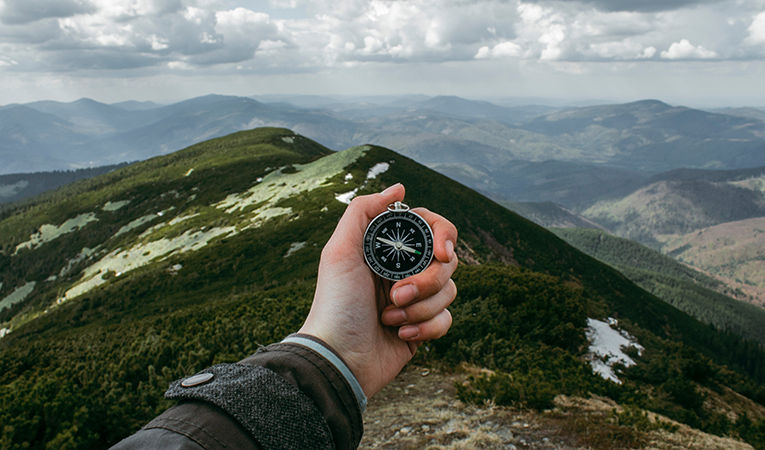
“Not until we are lost do we begin to understand ourselves.” Henry David Thoreau
Why travel? We travel to define ourselves .
In the words of Henry David Thoreau: “Not until we are lost do we begin to understand ourselves.” There is no motivation to step outside of our comfort zone until we understand that what lies on the other side is worth the risk, and it is in one of the high loops of this wild roller coaster of life, when everything is upside down and rushing past you too fast and you start to feel like a little child , that we truly open our eyes and feel alive.
It is difficult to paint an accurate self-portrait if we are limited by the color palette and dimensions of our canvas. Growing up in a familiar environment, with the same mentalities and events through the years, has a habit of spurning growth. It is not until challenges arise that we evolve, and until we come in contact with new ideas that our own minds can give birth to fresh thoughts. New countries break apart our mentalities and stereotypes, allowing us to put ourselves back together again how we wish.
Perhaps Paul Theroux says it best: “You go away for a long time and return a different person – you never come all the way back.” It is impossible to travel and remain unchanged. We develop, gaining new roots and leaving old thought patterns behind. Coming into contact with foreign cultures, languages, activities, causes, religions, and landscapes, we find undiscovered interests and begin to view the world differently. We learn patience, we practice good faith, we adapt new skills, and we discover that what we took as “normal” isn’t so normal after all.
St. Aubin de Terán wrote, “I wanted to find myself in a distant place, and new things to care about. The importance of elsewhere was something I took on faith. Elsewhere was the place I wanted to be.” Whether it is a long weekend away to the beach, a summer study abroad program , or an internship on the other side of the world , meaningful travel converts “elsewhere” as a synonym to the opportunity to grow. Priorities change, the new page is always blank, and our person alters alongside the journey.
[ Answer “Why travel abroad?” with the help of our online advisors ]

“You go away for a long time and return a different person – you never come all the way back.” Paul Theroux
Why travel? We travel to define the world .
There is a Moorish proverb that states: “He who does not travel does not know the value of men.” It is easy to pretend that we know how other people live and how other countries look, based on news broadcasts, socialized stereotypes, and Aunt Hilda’s crazy stories, but it is not until we tighten our own boot laces and hike out to see the world, that we replace myth with fact.
When we experience a stranger’s hospitality and observe how others treat others and their land, we can start to assign worth to other populations— and to mankind in general. Living the nomadic life and immersing ourselves into experiences , we see enough to make our own generalizations... and then learn that they will forever be broken and never remain the same. Participating in other cultures’ realities gives us a glimpse of the life beyond the travel books and even the most “authentic” tourist activities.
An immigrant himself, Dagobert D. Runes muses that “people travel to faraway places to watch, in fascination, the kind of people they ignore at home.” This couldn’t be more true. At first, travel might be associated with big monuments and fancy museums, but the longer we spend on the road, the more synonymous “travel” becomes with “living,” and we realize that there are more similarities between us than there are differences.
Before we know it, we are reaching out to the locals, looking for non-touristy neighbourhoods, and longing for meaningful connections. Sitting at a street café during our lunch break while working abroad in Portugal , we observe everyday life, and we see our own neighbours back home in these strangers’ shoes. When we see ourselves reflected in people on the other side of the world, it is a humbling experience that puts life in perspective . Sometimes, we just need to travel a thousand miles to realize what we left behind and what we carry with us.
[ Travel Advice to Remember When You Feel Unsure of Yourself ]
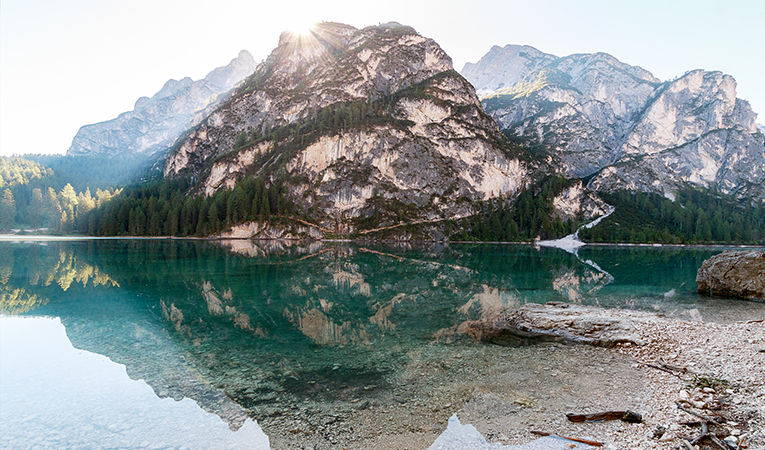
“I wanted to find myself in a distant place, and new things to care about. The importance of elsewhere was something I took on faith. Elsewhere was the place I wanted to be.” St. Aubin de Terán
Why travel? We travel to define life .
Perhaps most importantly, travel gives a new meaning to life; it opens our eyes to the things that matter, takes us by surprise, and leads to the (wonderfully) unexpected— only for us to realize that that is exactly where we need to be. Theologian Abraham Joshua Heschel ponders that, “The beginning of our happiness lies in the understanding that life without wonder is not worth living.”
It is precisely this wonder for life and the quest to find definition that serves as the greatest motivator to living a fulfilling life, both abroad and at home.
Ultimately, travel presents us with a new mindset for life . Henry Miller writes, “One’s destination is never a place, but a new way of seeing things,” while historian Mary Ritter Beard says, “Travel is more than the seeing of sights; it is a change that goes on, deep and permanent, in the ideas of the living.” While enjoying the journey more than celebrating the destination, we grow an appreciation for the process, rather than the mere result. We learn to laugh at our blunders, shed fear of getting lost, cope with failure, let go of things that we do not need, and foster gratitude for the small things in life.
Getting out of our shells to globetrot or spend a semester volunteering with marine animals leaves a footprint on our being that lasts long after passport stamps fade (and almost as long as those turtles that you helped from becoming extinct are going to live). We come back more confident individuals, charismatic storytellers, and humbled souls that know that the journey toward knowledge is one that never ends.
As philosopher Martin Buber states, “All journeys have secret destinations of which the traveler is unaware.”
[ 9 Things You’ll Only Understand if You’ve Found Yourself Through Travel ]
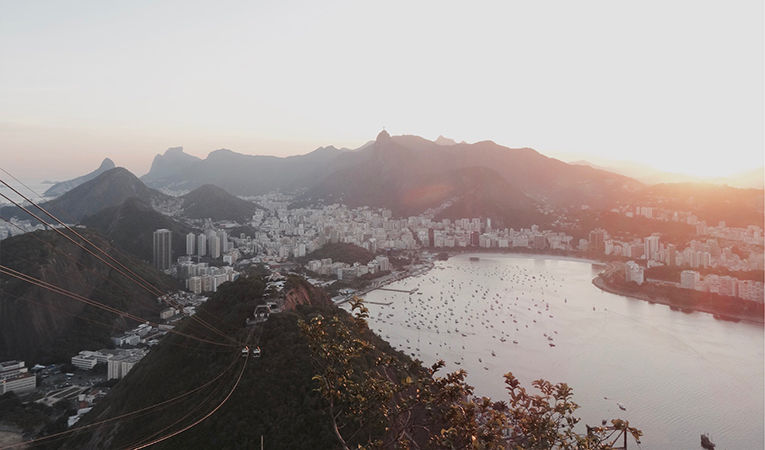
“All journeys have secret destinations of which the traveler is unaware.” Martin Buber
Why traveling is good— and traveling with these programs is BETTER
“There were times when I felt uncertain and hesitant, but these were the moments in which I learned the most about myself. I valued every single aspect of my abroad experience, and I could not recommend it more to anyone curious about exploring the world and themselves.”
- Maria, IES Abroad Amsterdam, Netherlands
“I learned to step out of my comfort zone and get to know people that I would've originally thought I had nothing in common with. I learned to respect Greek culture and adapt to their way of doing things so that I would not come off as rude. I learned to embrace differences and that language barriers don't mean I can't communicate with someone.”
- Kassidy, Athena Study Abroad Paros Island, Greece
“I have learned so much about myself, the culture, and most importantly, I have developed strong communication and survival skills. This was my first time in China and not knowing the language was terrifying at first for me; however, TEAN made everything so much smoother and I blended right in.”
- Chan Thai, TEAN Shanghai, China
“Travel is more than the seeing of sights; it is a change that goes on, deep and permanent, in the ideas of the living.” Mary Ritter Beard
Why travel — why not?!
So, what are you waiting for? Pack your bags (or leave them behind) and start making your path there and writing your own story. Whichever way you decide to go, it will be a journey to remember!
Find inspiration with incredible travel programs today

Explore Programs on GoAbroad.com
Related Articles

By GoAbroad Writing Team | 6 minutes ago

By Julia Zaremba | 1 hour ago

By Cecilia Polanco | 1 hour ago

By GoAbroad Writing Team | 1 hour ago
Popular Searches
Study abroad programs in italy, study abroad programs in spain, marine biology study abroad programs, study psychology abroad, fall study abroad 2024, spring study abroad programs, recommended programs.

2569 reviews
International TEFL Academy

1682 reviews
International Volunteer HQ [IVHQ]

1919 reviews
MAXIMO NIVEL

563 reviews
Intern Abroad HQ
For Travelers
Travel resources, for partners.

© Copyright 1998 - 2024 GoAbroad.com ®
- Study Abroad
- Volunteer Abroad
- Intern Abroad
- Teach Abroad
- TEFL Courses
- Degrees Abroad
- High School Abroad
- Language Schools
- Adventure Travel
- Jobs Abroad
- Online Study Abroad
- Online Volunteer Programs
- Online Internships
- Online Language Courses
- Online Teaching Jobs
- Online Jobs
- Online TEFL Courses
- Online Degree Programs
Goodwall Blog

Join Now! Download the Goodwall App
You'll be able to register on web soon! For now, download our app on your mobile device for the best experience!
- Self-Improvement
Why is Travel Important? Here Are 7 Important Benefits of Traveling
Wondering why travel is an important part of life here are the most impactful benefits of traveling, including health, happiness, and more.
As I write this, the world is in the midst of the second wave of the coronavirus crisis. Travel is far below the level it was at back in 2019, and it’ll be some time before it picks back up to pre-pandemic levels.
So, it feels a bit weird to write an article on the benefits of traveling and why travel is important.
But, travel will make a comeback. When it does, health and safety risks will remain. Many fair-weather travelers may be hesitant to return to the skies, roads, rails, and seas.
However, traveling is important and its benefits far outweigh the risks involved.

Want to Improve Yourself Each Day?
Sign up to Goodwall!
- Connect with improvement-focused people from 150+ countries
- Build valuable skills and experience
- Ask questions and get support when you need it
Download the app now to get started for FREE!
Here are some of the most important benefits of traveling:
1. Travel Makes You Happier
Sure, a travel experience easily makes you happier by getting you away from your daily grind. And, if you can get away from your parents, kids, freelance work , pets, homework, piano lessons, part-time job , studying for exams or any other things possibly weighing you down, that will definitely put a smile on your face, to say the least.
However, travel makes you happier in another way, as well. According to a study by Amit Kumar, Matthew A. Killingsworth, and Thomas Gilovich from Cornell University, that money spent on doing something (called “experiential purchases”) will leave you with a longer-lasting sense of happiness than money spent on having something (called “material purchases”).
The study says that “waiting for experiences tends to be more positive than waiting for possessions.” And, it goes on to say that “people derive more happiness from the anticipation of experiential purchases and that waiting for an experience tends to be more pleasurable and exciting than waiting to receive a material good.”
Related Read : The Best Work-Life Balance Quotes to Know
2. Travel Lets You Disconnect & Recharge
One of the best things you can do for your mental health every now and again, especially as a busy college student with an evening job or a young professional working 12-hour shifts, is to disconnect in order to recharge.
Working or studying for days, weeks, and months on end may help get you where you’re looking to go. However, you deserve a break every once in a while from the chronic stress. If not, you may suffer from burnout, depression, anxiety, and a whole host of other problems and ailments.
If traveling to a foreign country or experiencing a different culture doesn’t sound like a true break from everyday life and its stressful situations, stay local or do a solo trip to someplace remote and serene. The important thing for your is to unwind. That’s a health benefit and travel tip all rolled into one!
3. Traveling Relieves Stress and Anxiety
In a randomized controlled trial conducted by Austrian researchers and published in the International Journal of Environmental Research and Public Health , one of the many great travel benefits is that it can reduce stress levels and anxiety.
The researchers found that even just one short-term vacation (~3 days in length) “independent of the mode, has large, positive and immediate effects on perceived stress, recovery, strain, and well-being.” Furthermore, the beneficial effects last quite a while after you return home. “The effects can still be detected at 30 days (recovery) and 45 days (well-being and strain) post-vacation.”
Just make sure the way you travel doesn’t cause you stress, either! If you have a fear of air travel or a disdain for family travel, go by rail or take a solo travel experience. The important thing is to break away from the chronic stress of everyday life in order to calm down and reset your mind.
Related Read : How to Set Goals You Will Actually Achieve
4. Travel Exposes You to New Things
When you travel, you are stepping outside your comfort zone, for one thing. Even if your destination is relatively nearby (across the country rather than internationally), you are still experiencing new things.
Mark Twain said it best in one of my favorite travel quotes:
“Travel is fatal to prejudice, bigotry, and narrow-mindedness, and many of our people need it sorely on these accounts. Broad, wholesome, charitable views of men and things cannot be acquired by vegetating in one little corner of the earth all one’s lifetime.”
5. Travel Exposes Others to New Things
When you meet someone new, whether it’s in another town nearby or in a city halfway around the world, they also are meeting you. And, just as you’re being exposed to new foods, culture, languages, traditions, and so forth, they’re also getting a taste of yours. Just remember to be a good ambassador for your hometown, values, and beliefs!
When you visit a new place, meet new people, and learn about a new culture, whether through group travel or when traveling solo, the benefit to your life is immense, but it also benefits your friends, family, and other loved ones. Not only will you get to experience new things, but you’ll also bring what you learn back to your school, workplace, and hometown.
Related Read : 15+ Best Educational Podcasts to Listen to for Everyday Learning
6. Travel Makes You Physically Healthier
If you’re an active individual and asking why is travel important, there are some great benefits of traveling in store for you! From running through airports and train stations to make that tight connection to hiking through uneven terrain on your mountain climbing adventures to getting some vitamin D as you catch some rays on the beach, there are many reasons why travel is beneficial to your health.
According to a study by the Global Commission on Aging and Transamerica Center for Retirement Studies, in partnership with the U.S. Travel Association, travel decreases the risks of heart attacks and makes your brain healthier. The study determined that men who take an annual vacation are 30% less likely to die from heart disease, among other findings.
7. Traveling Can Boost Your Creativity
Are you a student, artist, writer, photographer, chef, advertising manager, or video game designer struggling with coming up with your next great idea? Traveling can help! If you’re looking to reignite your creativity, head on to Kayak and start booking some international flight tickets.
“Foreign experiences increase both cognitive flexibility and depth and integrativeness of thought, the ability to make deep connections between disparate forms,” Adam Galinsky, a professor at Columbia Business School, tells The Atlantic . Cognitive flexibility plays a major role in overall creativity, defined as the ability for a person to be able to entertain various ideas and viewpoints one after the other.
So, when it’s safe to do so, get back out there and travel.
You’ll improve your happiness and mood, get exposed to new things, strengthen your mind and body, remove stress and anxiety, and so much more!
Got any questions, feedback, or other great reasons why travel is important? Let us know in the comments below, and thanks for reading!
Related Read : 21+ Growth Mindset Quotes to Know for Success, Happiness & Fulfillment
Download our app today!
Cancel reply.
Your email address will not be published. Required fields are marked *
Write a Response...
Email Address *
Save my name, email, and website in this browser for the next time I comment.
1. Traveling broadens your perspective.
2. It allows you to see the world from a different angle.
3. It helps you to learn new things.
4. It makes you more tolerant and understanding
It’s fascinating that you point out that traveling offers a great way to relieve anxiety. I’ve been having a lot of anxiety for the past three months because of my divorce, so I’m considering booking a tour of Europe this summer. I’m going to look for a good business that offers tours of Europe.
Love this Christian, it keeps me do travel multiple times a year. Thank you so much.
I am Ain from Malaysia. I’m looking for contents to be used on my school assignment about travelling and I found your website would be so helpful for me and my group members. In this assignment , we are required to choose our international destination. In this assignment , we are going to make a report paper and two products (brochure and presentation). This work won’t be published online. We would like to include flight ticket to our destination , foods , place to stay , transportation and more. So , here I would like to ask for your permission to use contents from your website. This is the link to the content that me and my group members would like / might to use:
https://www.goodwall.io/blog/benefits-of-traveling/
I hope you can approve my permission. That would be great for us!
Thank you very much & stay safe!
Your Privacy
How Travel & Tourism can be a force for good
Travel & Tourism values what is most precious in our world- our environment, wildlife, history, culture, and our people. It can be a great catalyst for growth in local economies, providing good-quality jobs, opportunities for innovation and business creation and funds for conservation- and ultimately having a tremendous social impact. It also supports diversity and inclusion, employing and offering opportunities to people and communities from all walks of life, including minorities, youth, and women.
Here are a few insights to show you how Travel & Tourism truly makes a difference to millions of people’s lives and their livelihoods:
Travel & Tourism accounted for 10.4% of employment in 2019; that is 1 in 10 jobs on the planet .

Globally, for every 34 international visitors to a destination, 1 new job is created.

Women account for 54% of Travel & Tourism’s employment worldwide , specifically in accommodation food services, and the tourism sector has almost twice as many women employers as other sectors. Not only is it a driver of diversity and creates opportunities for inclusion.

For every $1 generated in direct Travel & Tourism GDP globally, more than $2 is generated on an indirect and/or induced basis. That means that Travel & Tourism has a multiplier effect.

Small and Medium-Sized Enterprises account for 80% of the Travel & Tourism sector , highlighting how the sector drives innovation and entrepreneurship. Think of that small business you encountered on your last trip: it could be the local backpacker’s you stayed with, a local artisan you bought jewellery from or a community programme where you learnt to make a traditional meal with a local person. Amazing small businesses like that are a big part of the sector and your trip helps those businesses and employees in big ways.

Thanks to Travel & Tourism, Small Island Developing States, which account for less than 1% of the global population, received nearly 5% of total global international spending. Quite simply, Travel & Tourism help transfer wealth and supports the growth of nations and communities, especially the smaller ones. If you are already planning a trip for when you feel comfortable to travel, consider what a big impact your holiday on a small island can do for the local economy.

1 direct job in Travel & Tourism creates a total of 3 jobs . You may wonder how this is possible. Well, for every direct job created in Travel & Tourism globally, nearly 2 new jobs are created on an indirect or induced basis.

Let’s not forget how Travel & Tourism can positively support wildlife conservation, from generating income to help protect endangered species to helping encourage government investment in conservation.
Taking a trip is wonderful and knowing that trip can be a force for good makes it even better! Read our new paper on social impact for more information and some great real-life examples of how Travel & Tourism can be a force for good.
Written by Tiffany Misrahi, VP Policy and Lethabo-Thabo Royds, Content Programme Co-Ordinator World Travel & Tourism Council

In the early 1920s, Italy had fewer than a million international arrivals each year. By 2000, it was over 60 million. At its peak, almost 100 million people visited Italy in 2019, and tourism was more than 10% of the country’s economy. “Italy just has so much to offer,” says Andrea Grisdale, chief executive of Italian Connection Bellagio. “It’s all about the people”.
LGBT+ travel is not only a means for exploration and leisure; it has become an influential market within the Travel & Tourism industry. As societal acceptance and equality continue to advance, LGBT+ people are increasingly comfortable expressing their identities openly, including during their travels.
Victoria shares her top tips for solo travel.
The city is called 'The Paris of South America' not only because of its European architecture, which came from the massive immigration we had in the late 19th and early 20th centuries, mostly from Spain, Italy, and France, but also because of its 'Bon Vivant' lifestyle.

Italy has been a consistently popular destination for what seems like decades. With draws such as authentic cuisine, stunning scenery, charming locals and endless history, one could see why it wouldn’t be challenging to remain at the top of most people’s travel to-do lists.

Rwanda’s rich culture, wildlife-filled national parks and endless nature-focused adventures are just waiting to be discovered by you!

Visiting Rwanda is the experience of a lifetime. You can count on a warm welcome and dramatic scenery. Rwanda is known as the land of a thousand hills, rich in biodiversity and wildlife living throughout its volcanoes, montane rainforest, and sweeping plains. Travellers come from far and wide to glimpse the magnificent gorillas, but there is so much more to see and experience.

Are you someone that has never dared to dine alone or buy a cinema ticket for one? If so, you might be wondering, “How can I go to an entire country on my own??” Well, you can.
London’s cycle Quietways almost feels like a treasured secret and therefore, many Londoners are seemingly unaware of their existence. The Q2 spans 14 km, beginning in Clerkenwell and concluding in Walthamstow, and offers a multitude of delicious eateries, sites and parks to visit along your journey.
Inspiring women and the countries they call home
How your responsible wildlife trip can be a force for good.

Travel Should Be a Force for Good
As the travel industry begins its recovery, afar’s editor in chief calls for it to come back better than it was before..
- Copy Link copied

The pandemic has shown us how such destinations as Amsterdam can feel when relieved of the burdens of overtourism.
Photo by Gebhart de Koekkoek
AFAR editor in chief Julia Cosgrove made the following remarks to introduce a discussion of how travel can make the world a better place on AFAR Live, an online gathering of travel leaders. This edition of AFAR Live took place on April 30, 2020.
At AFAR we truly believe in the power of travel as a force for good, fueled by our strong, unwavering mission to inspire, guide, and enable people to have deeper, richer, and more fulfilling experiences.
We believe that every traveler is a steward of the world. And that being a good traveler means being a good guest.
Since AFAR launched in 2009, we have been committed to celebrating our core brand values of curiosity, open-mindedness, and cultural diversity.
Today, as travel has come to a standstill and our audience of the world’s best travelers is stuck at home, it’s more imperative than ever that we continue to speak to and engage with the global citizens who share our mindset and believe in the power of travel to transform communities and individual lives for the better. Because when we can travel again, they’ll be the first out the front door, the first into the car, the first into the plane, the first into the hotel.
How travel can be more sustainable
Before this pandemic, the biggest threat to travel was overtourism—too many people going to the same place, at the same time, to take the same picture, to share with the same group of people. Remember bragging rights and FOMO? That feels like a lifetime ago, right? I have a suggestion: Let’s not go back to that reality.
At AFAR, we believe the beauty of travel is that it isn’t a monoculture, and we want to keep it that way.
As we begin to emerge from our homes, it’s going to be more critical than ever that we go to places that aren’t overrun with people; that we visit in shoulder seasons or off-peak times of year; and that we commit to seeking out untrammeled destinations and lesser-known sights.
At AFAR, we believe that by focusing on the right kind of travel—purpose-driven, conscientious, and responsible—we can help educate and inform our readers about what we can all do to travel smarter and lessen our footprint along the way.
There’s a great deal of talk right now around sustainability and travel. We don’t see those two things as mutually exclusive. Rather, when sustainability is done right, it’s good for the traveler and it’s good for the travel business.
We break down sustainability into three categories: environmental, cultural, and economic. We know that travel makes individuals more aware of their place in the world and makes the world more connected. Travel fosters empathy, which in turn leads to real economic change. We know that by supporting local economies built on travel and tourism, and by valuing experiences over things, travelers can make a huge impact on local communities and the global economy. This approach influences what AFAR covers and how we cover it.
Sustainability will be an even more critical part of the conversation as the world starts to open up again. The climate crisis is upon us, and even the anecdotal positive environmental indications to come out of this period of lockdown—the clear Himalayan skies , South Africa’s napping lions , those wandering goats in Wales —won’t be forgotten. But other stories are emerging, too—of humans considering their impact and using this crisis as an opportunity to make change.
In Milan, where congestion and pollution have plummeted, city officials are converting 22 miles of street s into dedicated bicycling spaces. Paris just announced a 400-mile network of temporary cycle routes.
Our travel should reflect our values
The pandemic has revealed a world without travel. We are learning what we had taken for granted; what we miss the most; what we long to see again. We feel connected to each other—all of us, throughout the world—in a way we never have before. As the world looks toward recovery, the AFAR team will be exploring what travel means now and looking ahead, with hope, to where travel is heading.
One thing that’s here to stay: AFAR readers want travel that reflects their values.
Consumers are increasingly looking for companies to act with purpose and to be leaders in issues that matter to them. The right kind of travel means many things, but is based on some core ideas: transformative travel; traveling more deeply to experience a place like a local; pursuing destinations that aren’t overcrowded; and going off the beaten path in on-the-beaten-path places. This is our approach to travel, and we’ve been delivering it to audiences for more than a decade. Our brand voice isn’t preachy or earnest because we know that at its core, travel is also about delight and wonder.
Travel is also about making individuals more aware of their place in the world and making the world more connected.
Bruce Poon Tip, the CEO of G Adventures whom we honored two years ago as part of our Travel Vanguard , put it so well at our awards show in New York: If done right, travel can be the world’s most successful form of wealth redistribution.
The lens that we see the world in is “Travel as a Force for Good”: more inclusive, more sustainable, more about leaving the world in a better place than we’ve found it. Governments, companies, and individuals can help plan for a post-coronavirus future in a more conscious way. As travelers, we can do our part with every spending decision we make.
We have a once-in-a-century opportunity to build a better travel industry and a better world. One that values people and the future of our planet. One that’s smarter and more human-centric. Shannon Stowell, the head of the ATTA, and a 2019 AFAR Vanguard honoree, was recently quoted in a piece by Forbes . He said: “I really hope that companies and professionals will not try to go back to what we considered ‘normal’ because normal was not very responsible as an overall industry. The opportunity now is for leaders to lead and do the right thing by rebuilding smarter, which may mean smaller, and demand that travelers also behave as though travel is a privilege, not a right.”
I will close by imploring all of you on the call today: Let’s think about ways to embrace a growth mindset. Let’s not squander this opportunity to rethink how we view travel. Let’s be more deliberate citizens of the world. As members of this important industry that fuels so much good, let’s all be the better travelers who lead the way.
>>Next: What Travel in the Age of Coronavirus Will Look Like

Atlas & Boots
The UK's most popular outdoor travel blog

95 most inspirational travel quotes ever penned
Our favourite inspirational travel quotes have encouraged us to travel with abandon over the years. Perhaps they will do the same for you…
For us, there is no such thing as luxury travel; travel is, by default, a luxury. It is a privilege provided by the country of our birth, a privilege that many are not as fortunate to enjoy.
Sometimes, we have to pinch ourselves at just how ridiculous our lives have become: an ex-teacher and jobbing writer travelling the world for a living. It is absurd, it is astonishing, it is luxury.
When I first went travelling at 21 years old, my father gave me this quote scrawled on a piece of card.
It infused me with wanderlust. It encouraged me to get out of my comfort zone, make the most of my time, see the world and enjoy the freedom that comes with being on the road. It remains one of the most inspirational travel quotes I’ve read (even if Twain did not actually say it).
Today, 20 years and almost 100 countries later, it’s still in my wallet. Despite its tattered and dishevelled appearance, it’s every bit as important to me now as it was then.
With that in mind, we’ve collated our most beloved inspirational travel quotes to encourage readers to “explore, dream and discover” for themselves.
inspirational travel quotes
1. “To my mind, the greatest reward and luxury of travel is to be able to experience everyday things as if for the first time, to be in a position in which almost nothing is so familiar it is taken for granted.” – Bill Bryson
2. “The world is a book and those who do not travel read only one page.” – St. Augustine

3. “Travel is never a matter of money, but of courage.” – Paulo Coelho
4. “With age, comes wisdom. With travel, comes understanding.” – Sandra Lake
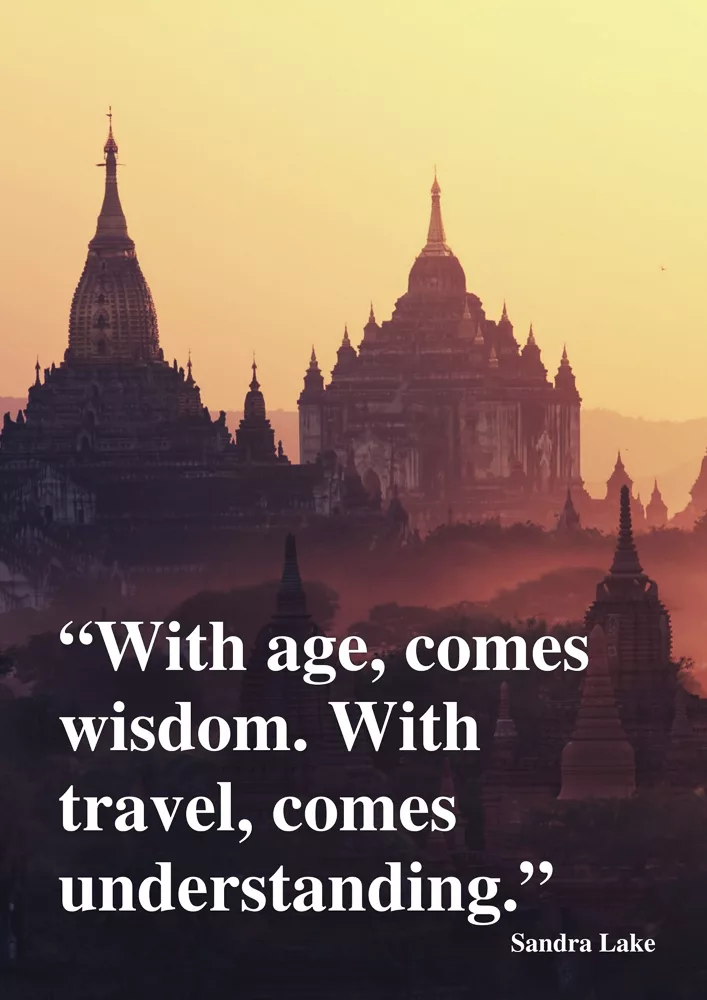
5. “When overseas you learn more about your own country, than you do the place you’re visiting.” – Clint Borgen
6. “Travel is fatal to prejudice, bigotry, and narrow-mindedness.” – Mark Twain

7. “Don’t tell me the sky’s the limit when there are footprints on the moon.” – Paul Brandt
8. “The man who goes alone can start today; but he who travels with another must wait till that other is ready.” – Henry David Thoreau
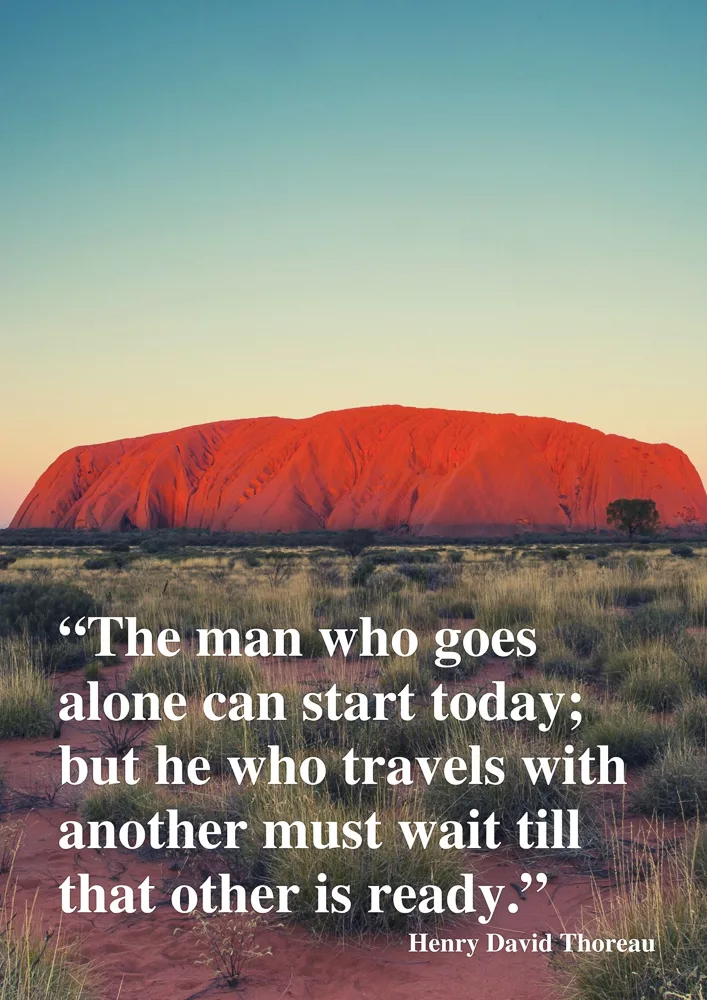
9. “The first condition of understanding a foreign country is to smell it.” – Rudyard Kipling
10. “A journey of a thousand miles must begin with a single step.” – Lao Tzu

11. “When preparing to travel, lay out all your clothes and all your money. Then take half the clothes and twice the money.” – Susan Heller Anderson
12. “No place is ever as bad as they tell you it’s going to be.” – Chuck Thompson
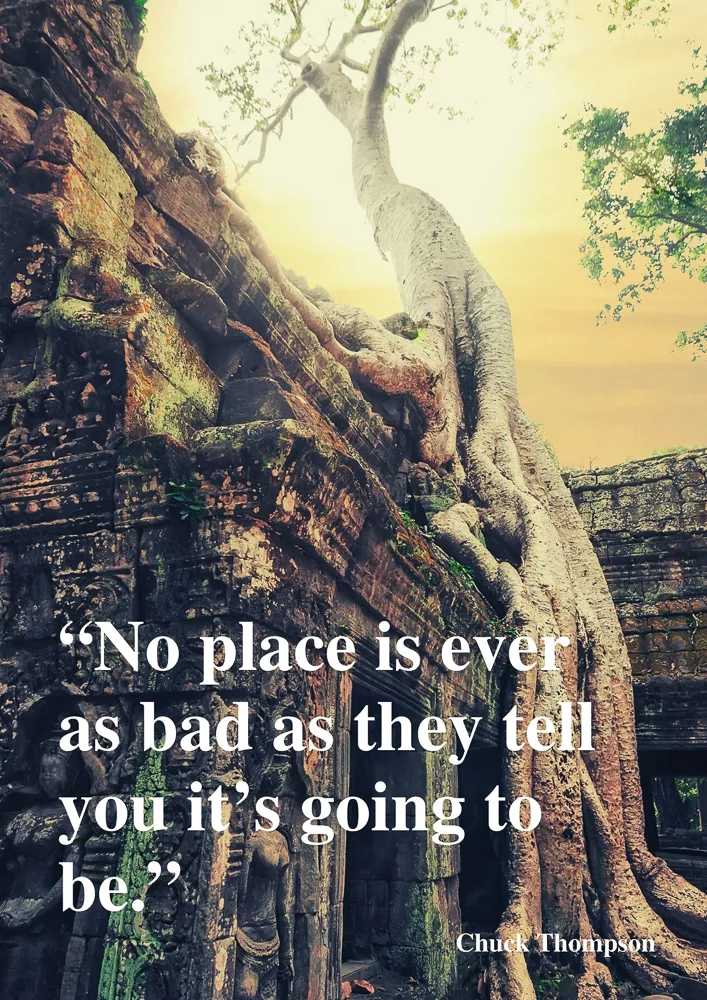
13. “We live in a wonderful world that is full of beauty, charm and adventure. There is no end to the adventures we can have if only we seek them with our eyes open.” – Jawaharlal Nehru
14. “A good traveler has no fixed plans and is not intent on arriving.” – Lao Tzu

15. “There is no moment of delight in any pilgrimage like the beginning of it.” – Charles Dudley Warner
16. “A ship in harbor is safe, but that’s not what ships were built for.” – John A. Shedd
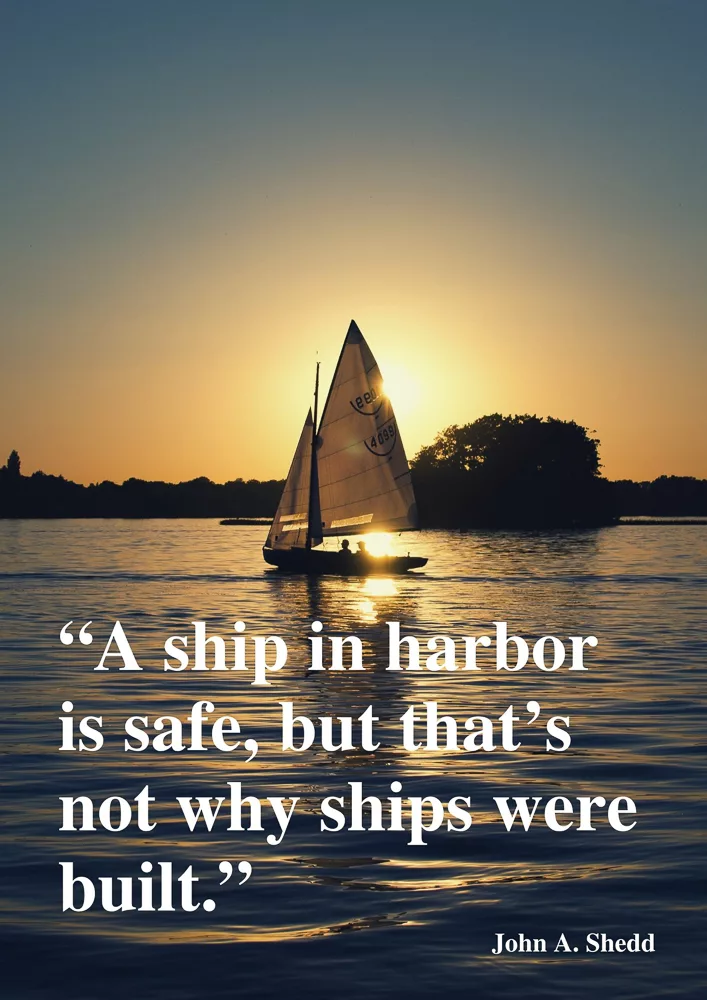
17. “Tourists don’t know where they’ve been, travelers don’t know where they’re going.” – Paul Theroux
18. “Not all those who wander are lost.” – J. R. R. Tolkien

19. “Do not follow where the path may lead. Go instead where there is no path and leave a trail.” – Ralph Waldo Emerson
20. “Like all great travelers, I have seen more than I remember, and remember more than I have seen.” – Benjamin Disraeli
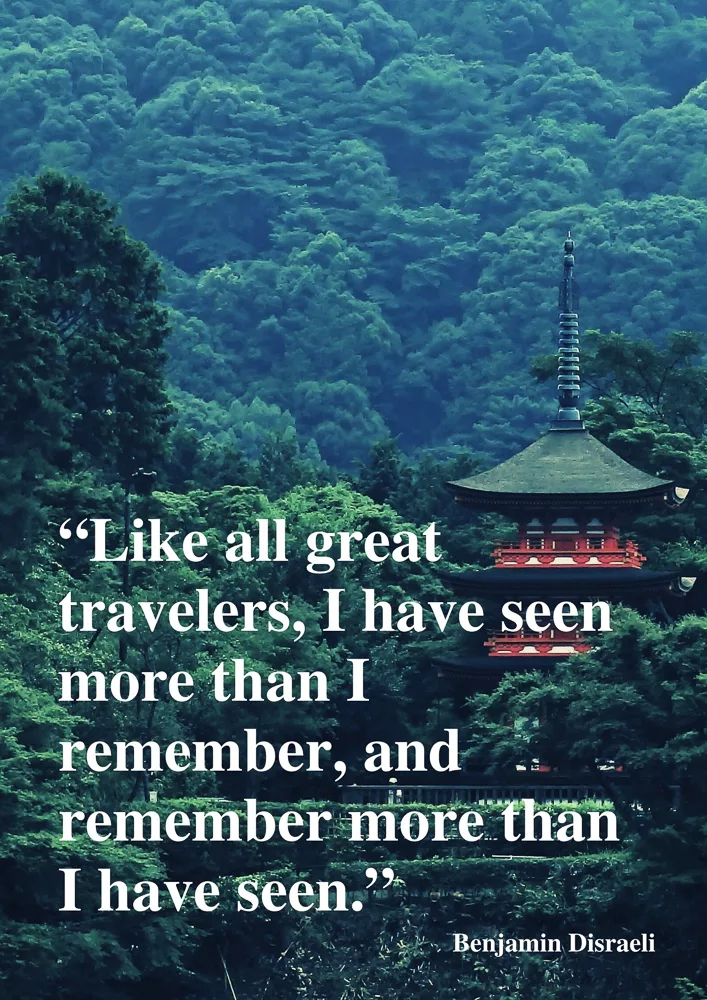
21. “Once a year, go somewhere you’ve never been before.” – The Dalai Lama
22. “No one realizes how beautiful it is to travel until he comes home and rests his head on his old, familiar pillow.” – Lin Yutang

23. “What you’ve done becomes the judge of what you’re going to do – especially in other people’s minds. When you’re travelling, you are what you are right there and then. People don’t have your past to hold against you. No yesterdays on the road.” – William Least Heat Moon
24. “There are no foreign lands. It is the traveller only who is foreign.” – Robert Louis Stevenson
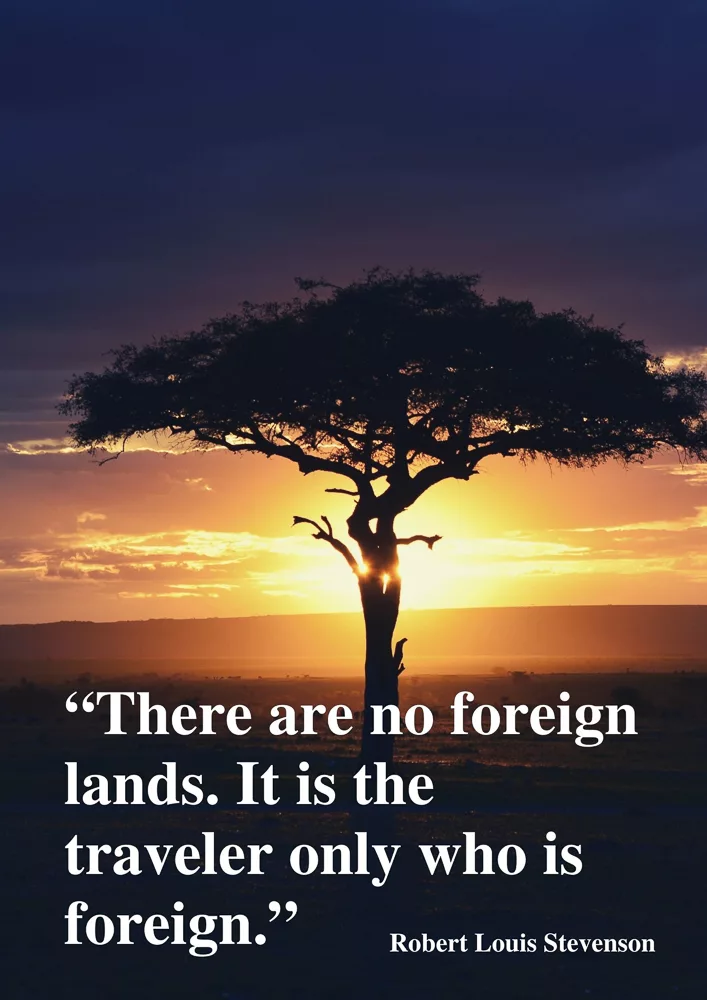
25. “Travel is glamorous only in retrospect.” – Paul Theroux
26. “A traveller without observation is a bird without wings.” – Moslih Eddin Saadi

27. “Your true traveller finds boredom rather agreeable than painful. It is the symbol of his liberty-his excessive freedom. He accepts his boredom, when it comes, not merely philosophically, but almost with pleasure.” – Aldous Huxley
28. “One’s destination is never a place, but a new way of seeing things.” – Henry Miller
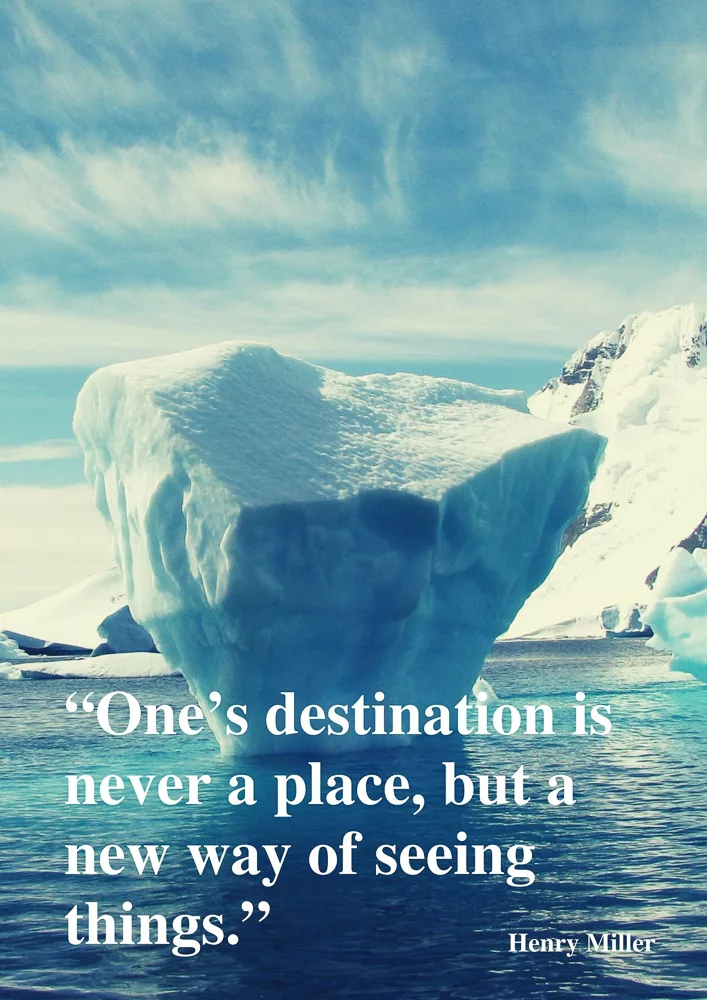
29. “All travel has its advantages. If the passenger visits better countries, he may learn to improve his own. And if fortune carries him to worse, he may learn to enjoy it.” – Samuel Johnson
30. “Wandering re-establishes the original harmony which once existed between man and the universe.” – Anatole France

31. “I can’t control the wind but I can adjust the sail.” – Ricky Skaggs
32. “We wander for distraction, but we travel for fulfilment.” – Hilaire Belloc
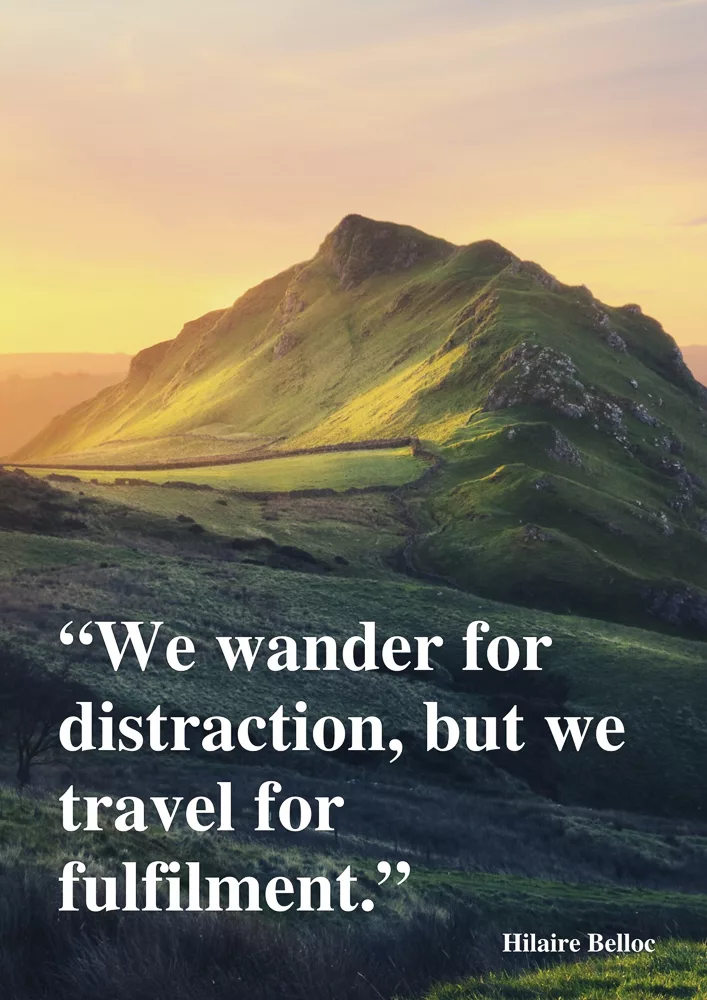
33. “People travel to faraway places to watch, in fascination, the kind of people they ignore at home.” – Dagobert D. Runes
34. “If you reject the food, ignore the customs, fear the religion and avoid the people, you might better stay at home.” – James Michener

35. “The use of travelling is to regulate imagination by reality, and instead of thinking how things may be, to see them as they are.” – Samuel Johnson
36. “You don’t have to be rich to travel well.” – Eugene Fodor
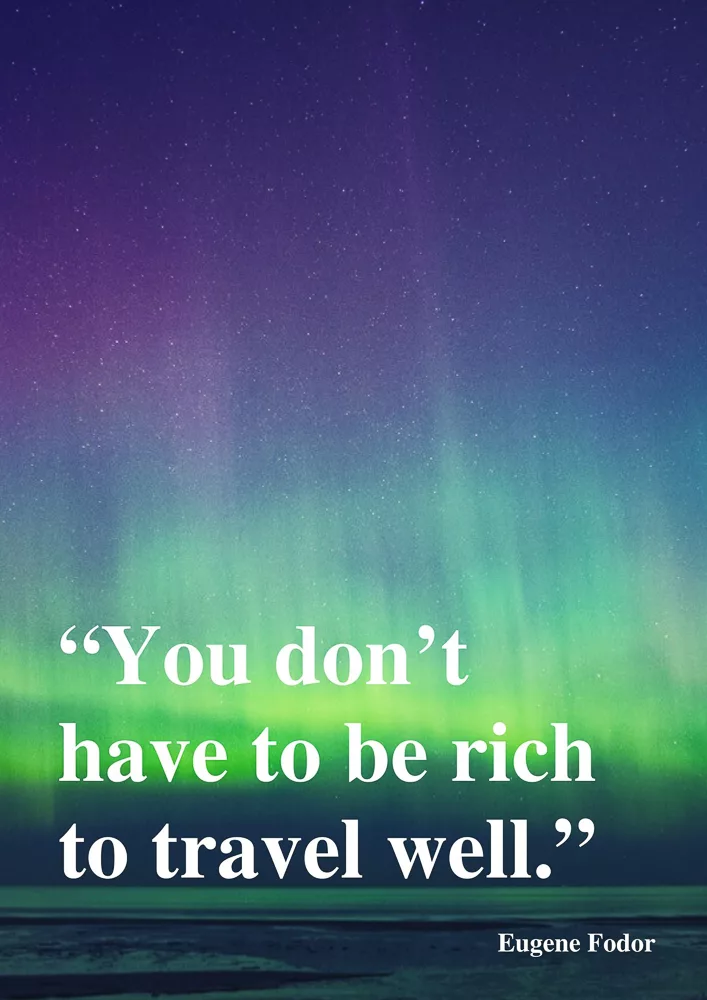
37. “Perhaps travel cannot prevent bigotry, but by demonstrating that all peoples cry, laugh, eat, worry, and die, it can introduce the idea that if we try and understand each other, we may even become friends.” – Maya Angelou
38. “All journeys have secret destinations of which the traveler is unaware.” – Martin Buber

39. “Two roads diverged in a wood and I – I took the one less traveled by.” – Robert Frost
40. “Travel and change of place impart new vigor to the mind.” – Seneca

41. “Traveling is a brutality. It forces you to trust strangers and to lose sight of all that familiar comfort of home and friends. You are constantly off balance. Nothing is yours except the essential things – air, sleep, dreams, the sea, the sky – all things tending towards the eternal or what we imagine of it.” – Cesare Pavese
42. “Once the travel bug bites, there is no known antidote, and I know that I shall be happily infected until the end of my life.” ― Michael Palin
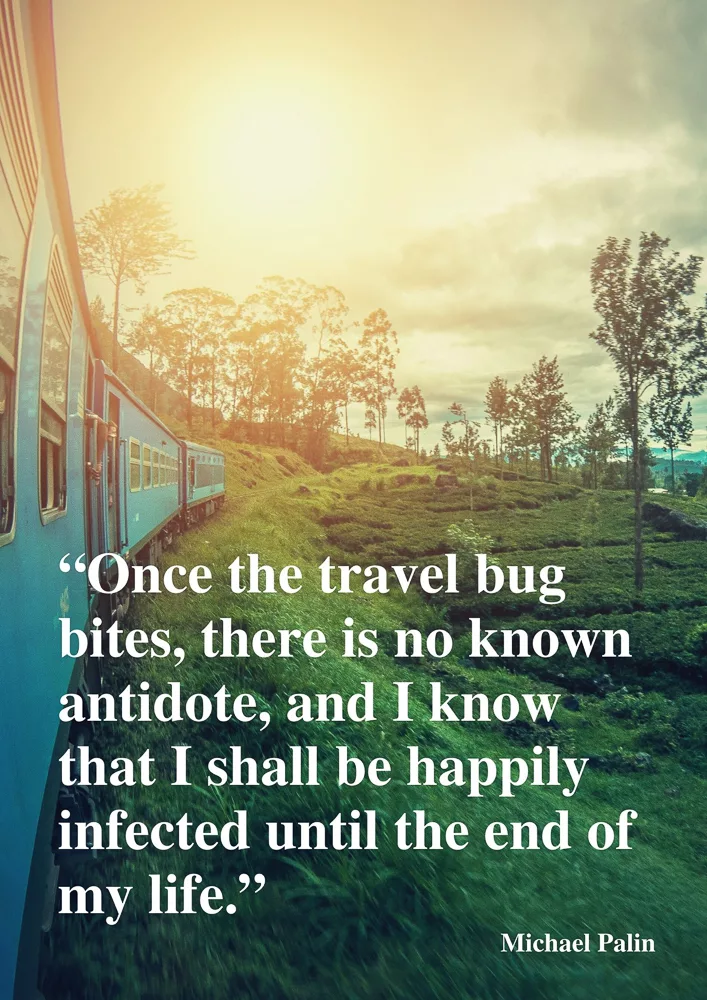
43. “A journey is best measured in friends, rather than miles.” – Tim Cahill
44. “A journey is like marriage. The certain way to be wrong is to think you control it.” – John Steinbeck

45. “When you travel, remember that a foreign country is not designed to make you comfortable. It is designed to make its own people comfortable.” – Clifton Fadiman
46. “There are far, far better things ahead than we leave behind.” – C.S. Lewis
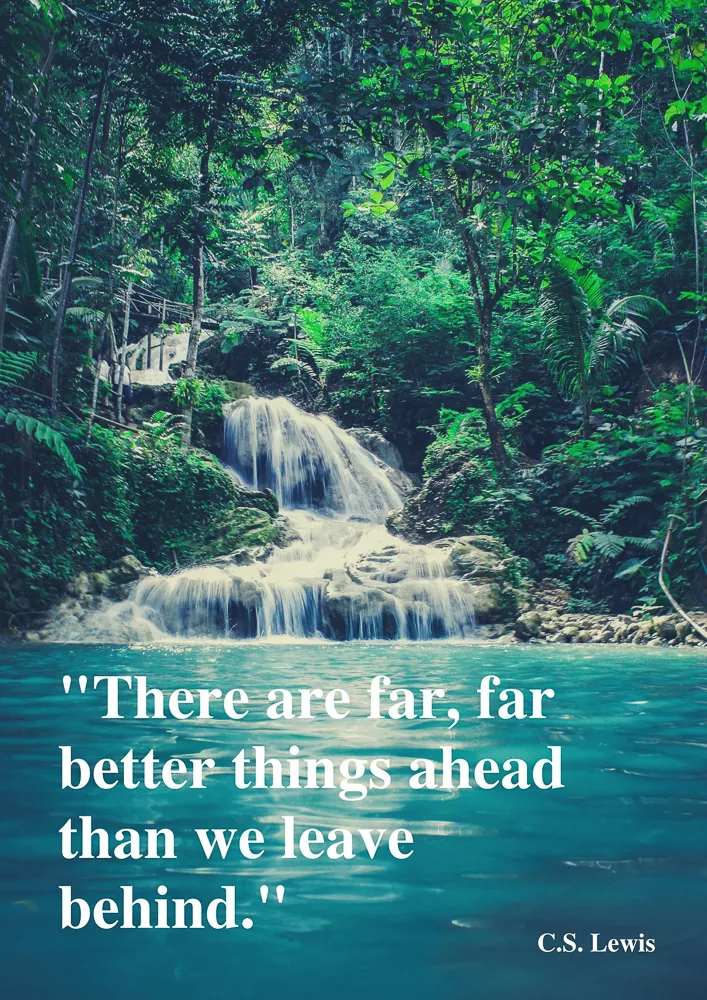
47. “Travel does what good novelists also do to the life of everyday, placing it like a picture in a frame or a gem in its setting, so that the intrinsic qualities are made more clear. Travel does this with the very stuff that everyday life is made of, giving to it the sharp contour and meaning of art.” – Freya Stark
48. “To travel is to discover that everyone is wrong about other countries.” – Aldous Huxley

49. “All the pathos and irony of leaving one’s youth behind is thus implicit in every joyous moment of travel: one knows that the first joy can never be recovered, and the wise traveller learns not to repeat successes but tries new places all the time.” – Paul Fussell
50. “I have found out that there ain’t no surer way to find out whether you like people or hate them than to travel with them.” – Mark Twain
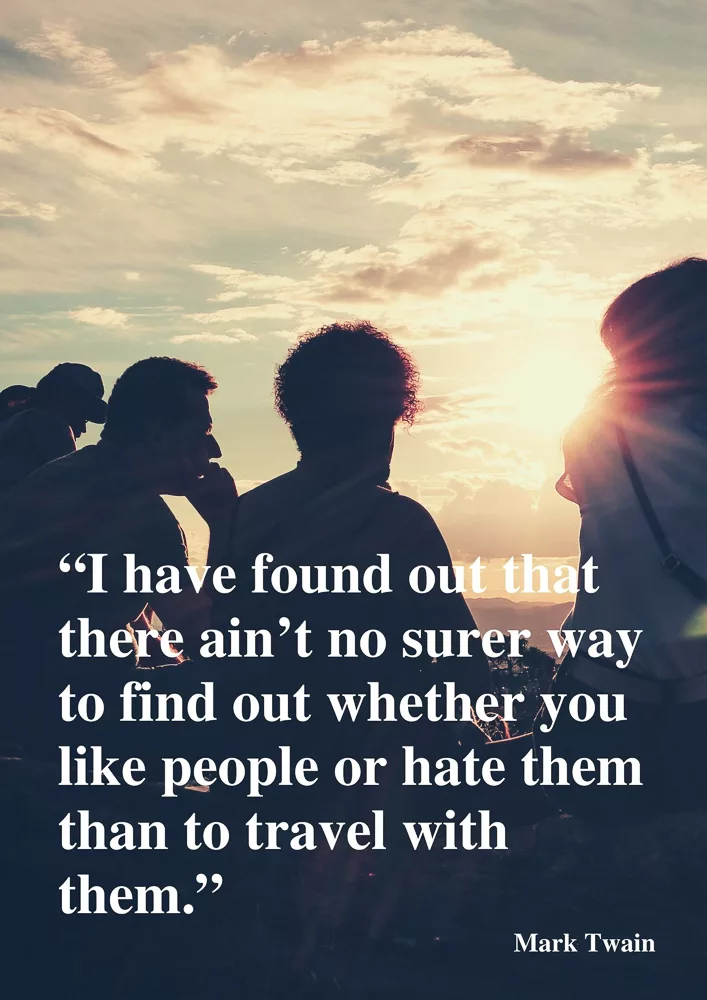
51. “The whole object of travel is not to set foot on foreign land; it is at last to set foot on one’s own country as a foreign land.” – G.K. Chesterton
52. “Too often travel, instead of broadening the mind, merely lengthens the conversation.” – Elizabeth Drew

53. “People don’t take trips, trips take people.” – John Steinbeck
54. “Stuff your eyes with wonder, live as if you’d drop dead in ten seconds. See the world. It’s more fantastic than any dream made or paid for in factories.” – Ray Bradbury
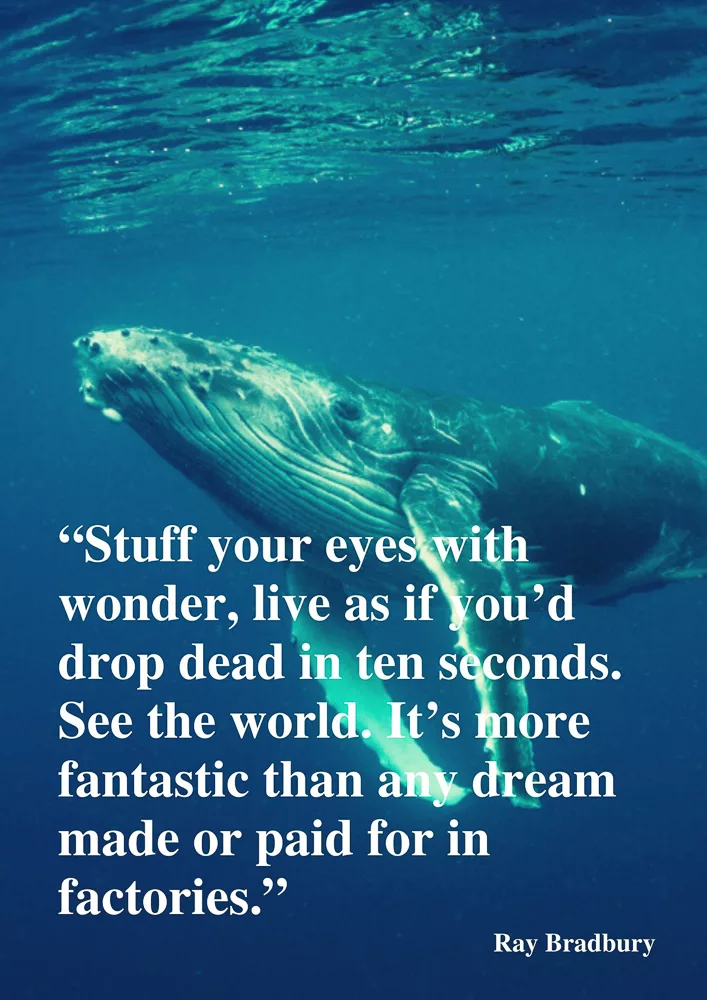
55. “Travel makes one modest. You see what a tiny place you occupy in the world.” – Gustave Flaubert
56. “The journey not the arrival matters.” – T. S. Eliot

57. “Time flies. It’s up to you to be the navigator.” – Robert Orben
58. “The real voyage of discovery consists not in seeking new landscapes, but in having new eyes.” – Marcel Proust
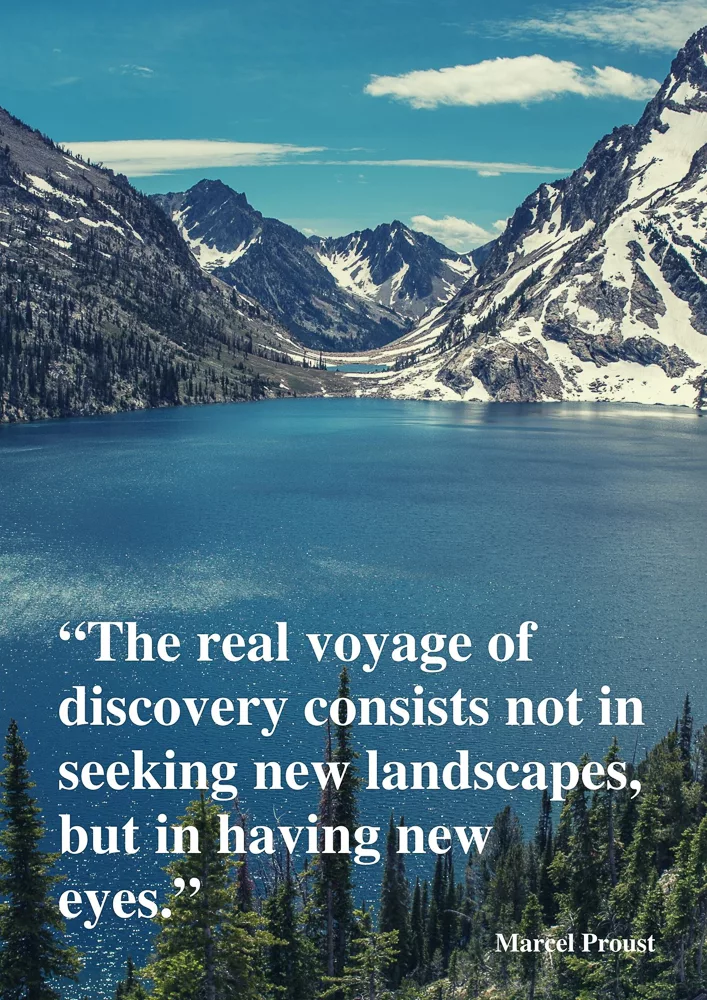
59. “I never travel without my diary. One should always have something sensational to read in the train.” – Oscar Wilde
60. “For my part, I travel not to go anywhere, but to go. I travel for travel’s sake. The great affair is to move.” – Robert Louis Stevenson

61. “If an ass goes travelling, he’ll not come home a horse.” – Thomas Fuller
62. “Travelling tends to magnify all human emotions.” – Peter Hoeg
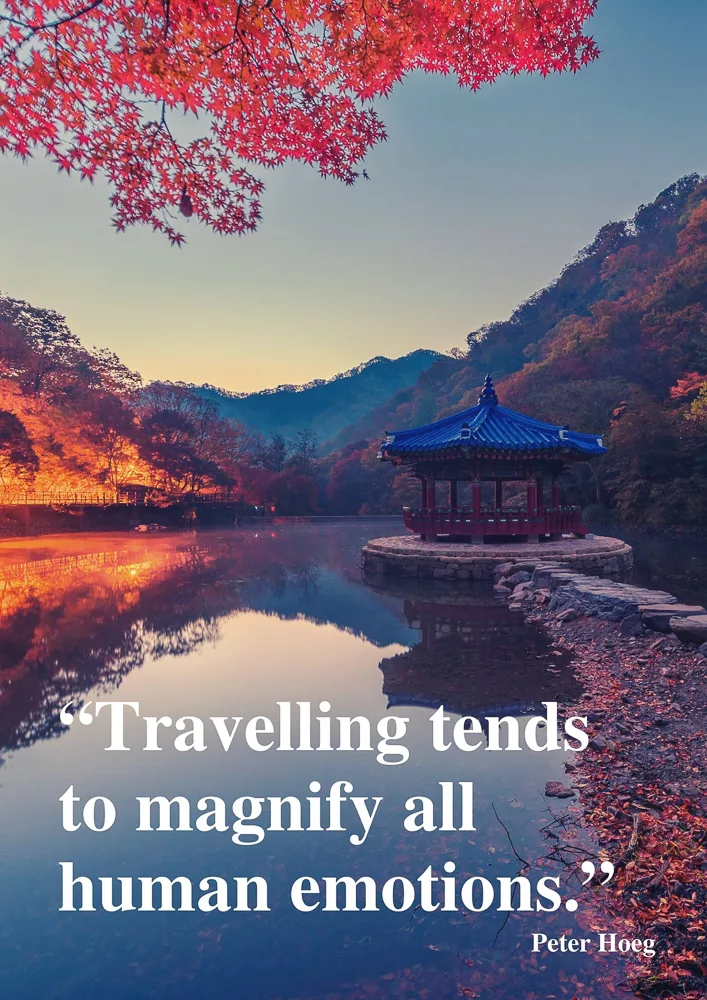
63. “To move, to breathe, to fly, to float, To gain all while you give, To roam the roads of lands remote: To travel is to live.” – Hans Christian Andersen
64. “To awaken quite alone in a strange town is one of the pleasantest sensations in the world.” – Freya Stark

65. “I am not the same having seen the moon shine from the other side of the world.” – Mary Anne Radmacher
66. “I always wonder why birds stay in the same place when they can fly anywhere on earth. Then I ask myself the same question.” – Harun Yahya
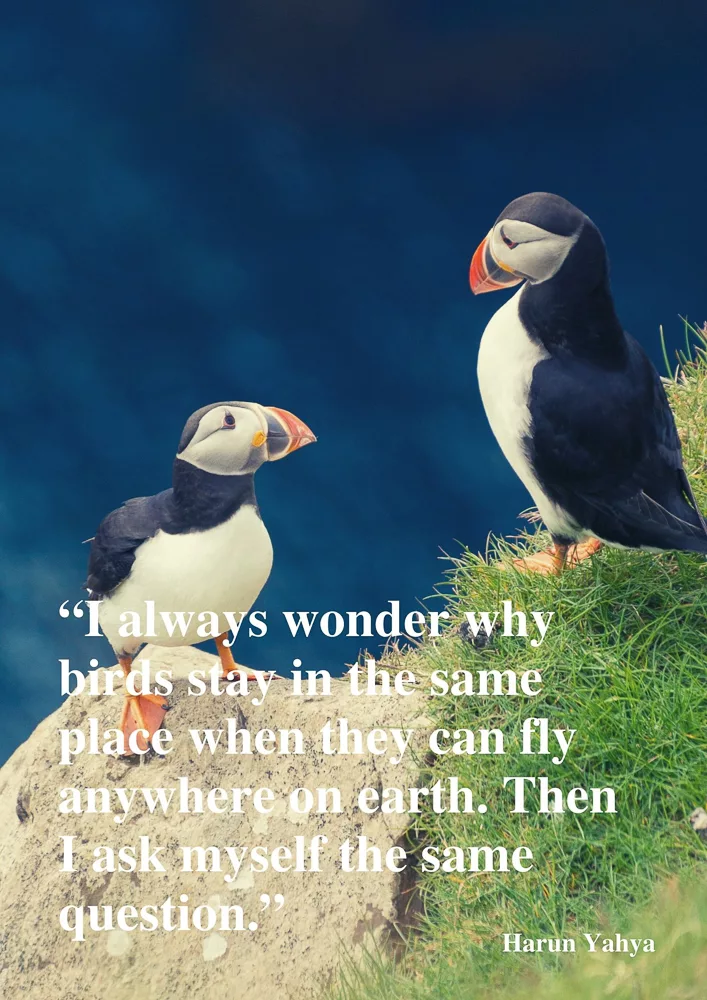
67. “I dislike feeling at home when I am abroad.” – George Bernard Shaw
68. “A wise traveler never despises his own country.” – Carlo Goldoni

69. “Man cannot discover new oceans unless he has the courage to lose sight of the shore.” – Andre Gide
70 “Traveling – it leaves you speechless, then turns you into a storyteller.” – Ibn Battuta
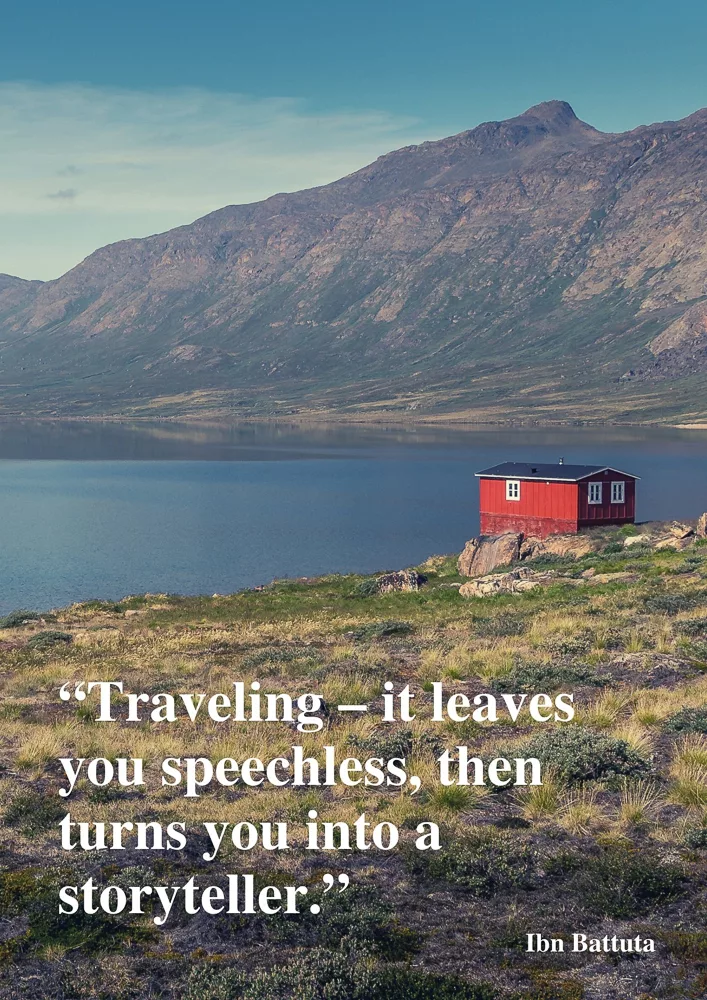
71. “We travel, some of us forever, to seek other places, other lives, other souls.” – Anais Nin
72. “Travel is more than the seeing of sights; it is a change that goes on, deep and permanent, in the ideas of living.” – Miriam Beard

73. “The gladdest moment in human life, methinks, is a departure into unknown lands.” – Sir Richard Burton
74. “A man of ordinary talent will always be ordinary, whether he travels or not; but a man of superior talent will go to pieces if he remains forever in the same place.” – Wolfgang Amadeus Mozart
75. “He who would travel happily must travel light.” – Antoine de St. Exupery
76. “Our battered suitcases were piled on the sidewalk again; we had longer ways to go. But no matter, the road is life.” – Jack Kerouac

77. “The more I travelled the more I realised that fear makes strangers of people who should be friends.” – Shirley MacLaine
78. “Live your life by a compass, not a clock.” – Stephen Covey
78. “Our happiest moments as tourists always seem to come when we stumble upon one thing while in pursuit of something else.” – Lawrence Block
80. “Take only memories, leave only footprints.” – Chief Seattle – or Si’ahl

81. “Life is either a daring adventure or nothing at all.” – Helen Keller
82. “It is not down in any map; true places never are.” – Herman Melville
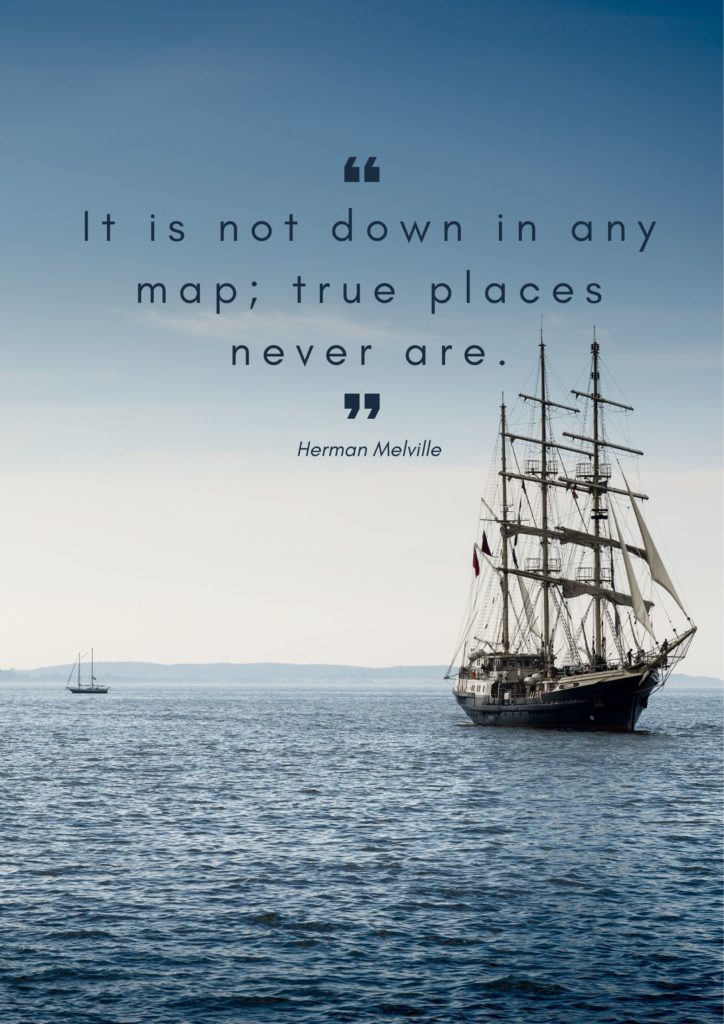
83. “We live in a world that is full of beauty, charm and adventure. There is no end to the adventures we can have if only we seek them with our eyes open.” – Jawaharlal Nehru
84. “The most beautiful thing in the world is, of course, the world itself” – Wallace Stevens
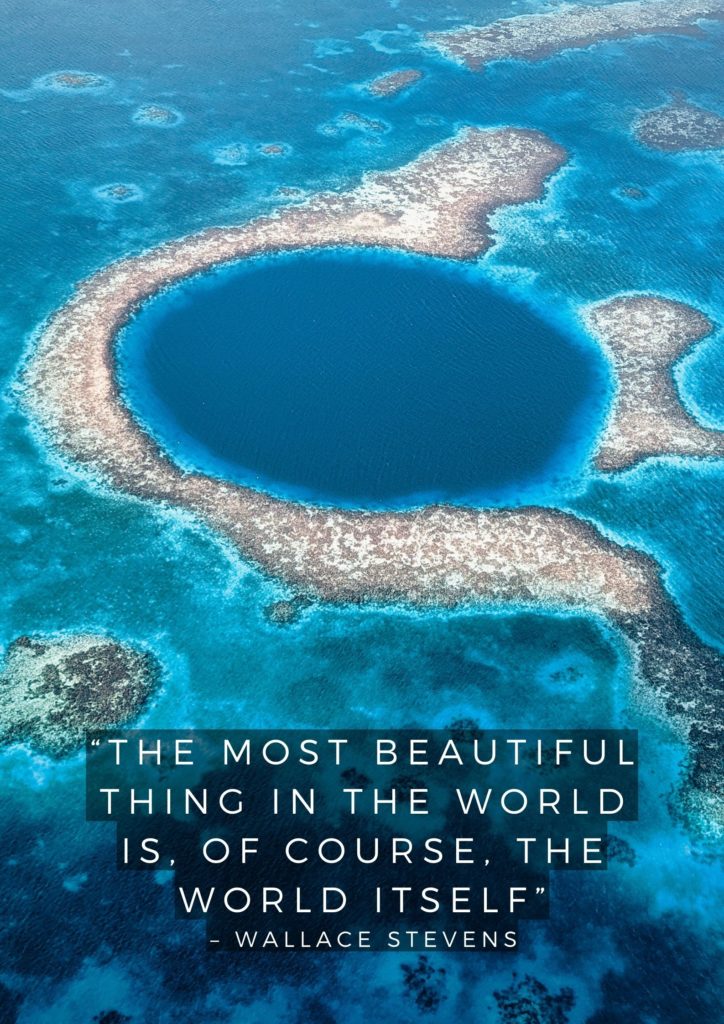
85. “Life begins at the end of your comfort zone.” – Neale Donald Walsch
86. “Paris is always a good idea.” – Julia Ormond (although it is often wrongly attributed to Audrey Hepburn)

87. “Stop worrying about the potholes in the road and enjoy the trip.” – Babs Hoffman
88. “Travel isn’t always pretty. It isn’t always comfortable. Sometimes it hurts, it even breaks your heart. But that’s okay. The journey changes you; it should change you. It leaves marks on your memory, on your consciousness, on your heart, and on your body. You take something with you. Hopefully, you leave something good behind.” – Anthony Bourdain
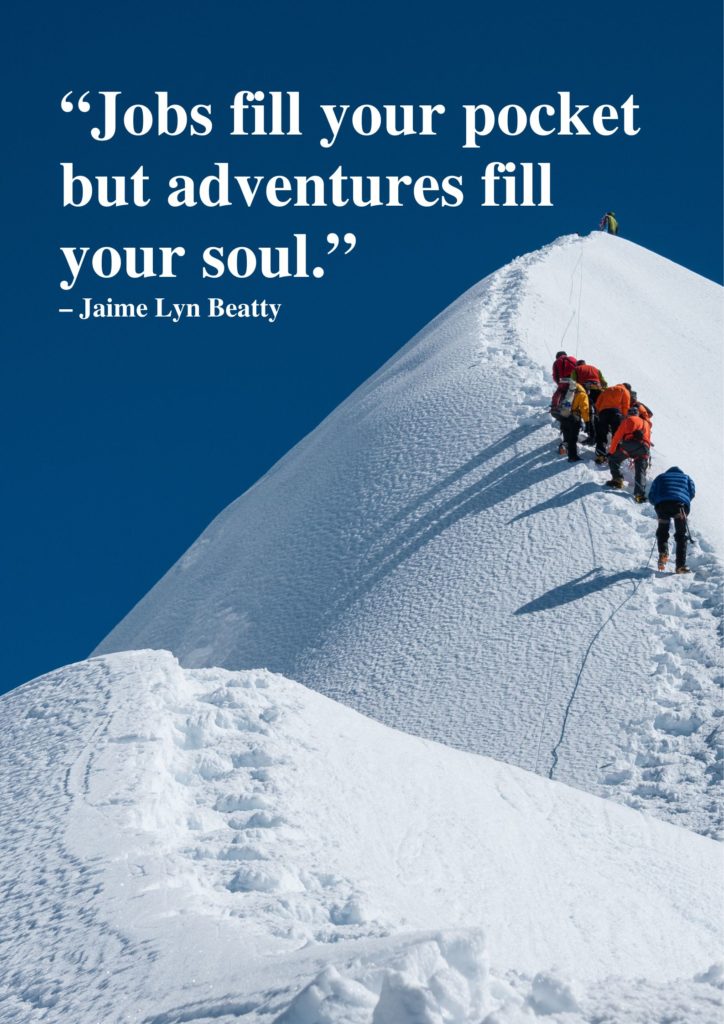
89. “Jobs fill your pocket but adventures fill your soul.” – Jaime Lyn Beatty
90. “It is in our nature to explore, to reach out into the unknown. The only true failure would be not to explore at all.” – Sir Ernest Shackleton
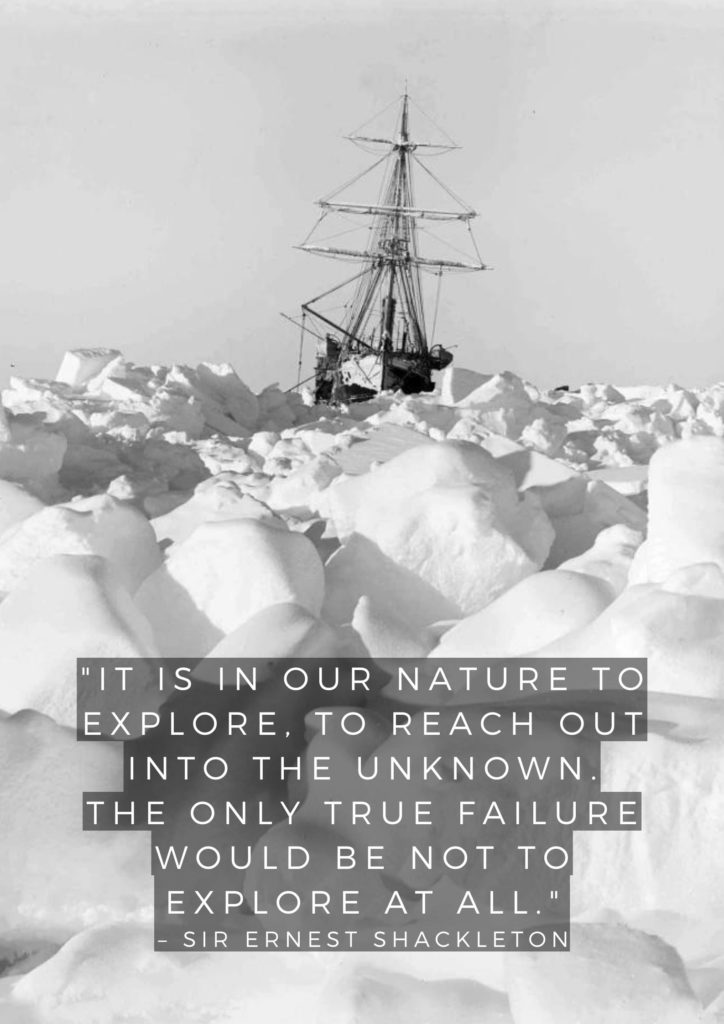
91. “Because in the end, you won’t remember the time you spent working in the office or mowing your lawn. Climb that goddamn mountain.” – Jack Kerouac
92. “Broad, wholesome, charitable views of men and things can not be acquired by vegetating in one little corner of the earth all one’s lifetime.” – Mark Twain
93. “Live with no excuses and travel with no regrets.” – Oscar Wilde
94. “Remember that happiness is a way of travel – not a destination.” – Roy M Goodman
95. “Twenty years from now you will be more disappointed by the things you didn’t do than by the ones you did do. So throw off the bowlines, sail away from the safe harbor. Catch the trade winds in your sails. Explore. Dream. Discover.” – Mark Twain (or possibly H Jackson Brown Jr )
Enjoyed this post? pin it for later…
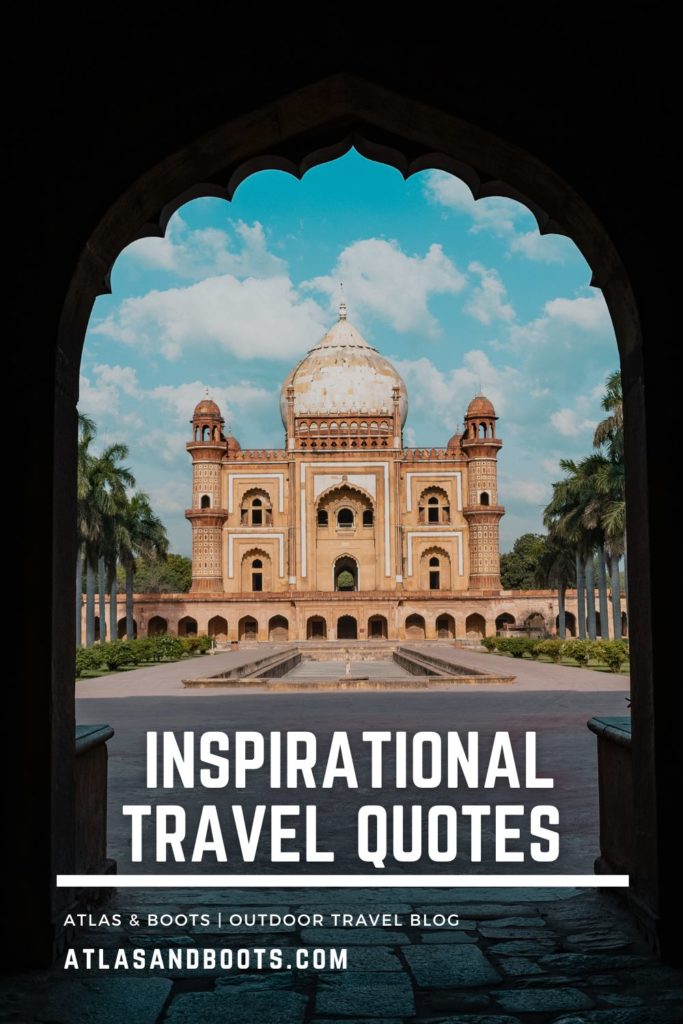
The Lonely Planet Ultimate Travel List is the definitive wish list of the best places to visit on earth – the perfect accompaniment to our selection of inspirational travel quotes.
You might also like:


How to Make Your Travel Meaningful
Written By: The Planet D
Travel Tips
Updated On: November 28, 2023
Many people feel that meaningful travel is strictly about going on a volunteering vacation, but there are many ways to make your travel meaningful. Dave and I have always added meaning to our travels. Be it traveling responsibly, raising money for a cause , stopping at sanctuaries or projects, and interacting with the locals, there are many ways to enrich your travels while making your life and other people’s lives better.
Table of Contents
How To Make Your Travel More Meaningful
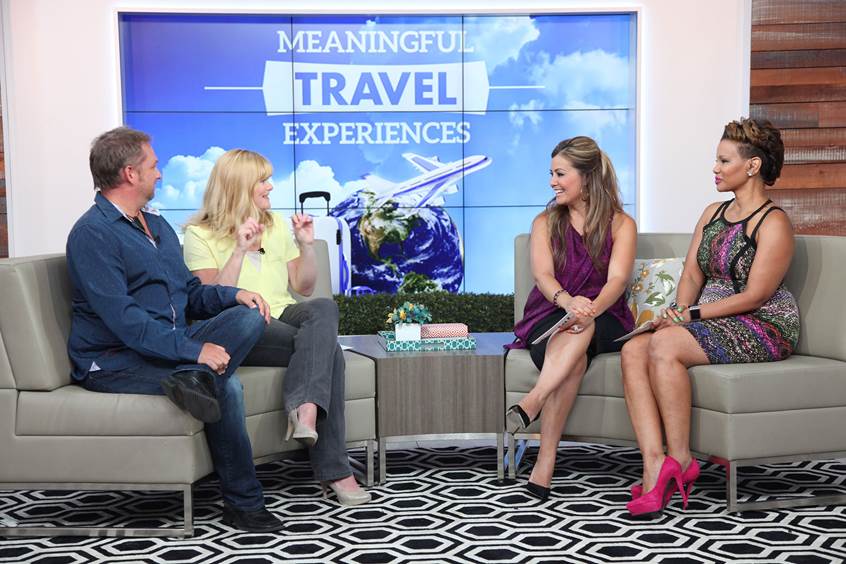
What is Meaningful Travel?
To us, meaningful travel is when travel enriches your life in some way. That could be done by focusing on making your own life better by discovering and learning new things about the world and yourself.
It can also be making the lives richer for the people you meet, the communities you visit, and the environments you explore . Meaningful travel is about being aware of your footprint and doing what you can to help the places that you visit.
Ways to Make Travel Meaningful
1. travel for a cause.

When we started ThePlanetD.com we originally focused on changing our own lives by cycling through Africa , but it evolved to helping others. We decided to ride for Plan Canada and raise funds and awareness for the “ Because I am a girl campaign. ” We stopped at projects along the way to see the work they did and share it with our readers. Read more: Best Travel Charities
The trip may have started with us wanting to do something epic in our travels, but it evolved to become a trip about discovery, education, and helping others.
We’ve found that the more we learn about the world and the cultures we visit the more it enriches our lives. The more you give back, the more you feel fulfilled. When volunteering or helping others you expect nothing in return, but it ends up giving you so much. It is the greatest feeling to know that you are making the world a better place in your own little way.

There are so many ways to make travel meaningful. While the first thought that comes to mind is to volunteer or to give money, thinking responsibly can make your travels more meaningful too. When we travel, we try to support the local economy by hiring local guides. When we land in a destination, we search for people who run their own companies and have their own small business.
2. Support Local Businesses
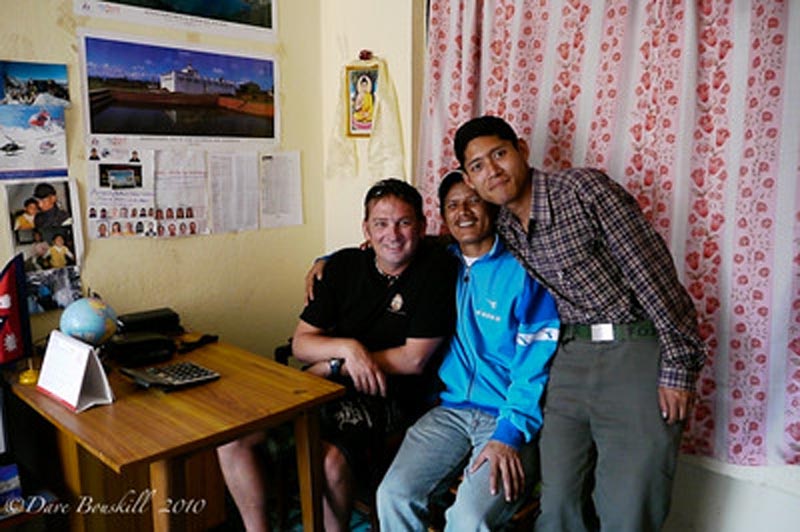
Just as we like to shop small and support small business in Canada, the same can be said for our travels. Small business makes the world go round and by shopping at local markets, hiring local guides, and eating at small family-run restaurants, you will be helping the economy of the place you visit and create a more meaningful travel experience for yourself.
We have remained friends with many of our guides and had a more authentic local experience by keeping our travels local and away from the resorts and packaged tours.
3. Raise Money for a Charity
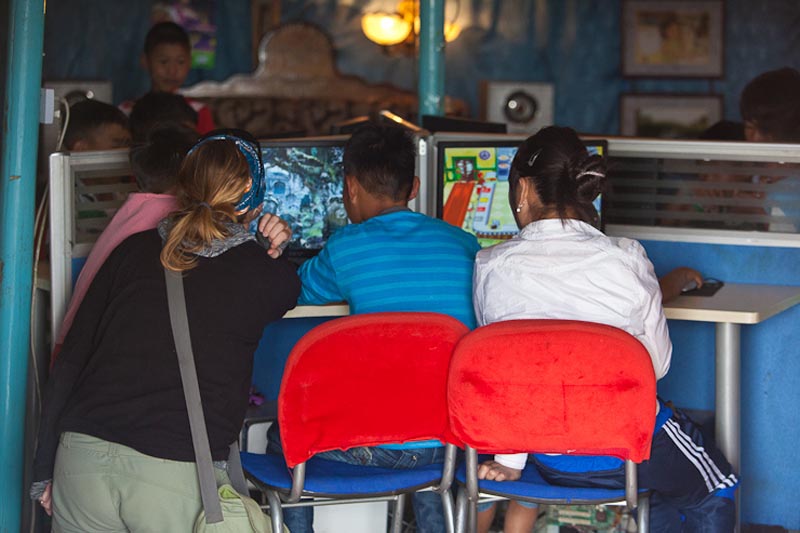
When we did the Mongol Rally, we drove across 2 continents for the Christina Nobel Foundation. A foundation based in Mongolia that houses and educates orphaned and abandoned children. When cycling the continent of Africa we raised funds and awareness for Plan Canada.
By being in the destinations, we could stop at projects and see where our money was going and how funds were being used. It gave our cause more of a purpose to put a human face to the charity. When we saw that they were benefitting directly from the money raised, we felt motivated to help more.
4. Visit a Charity
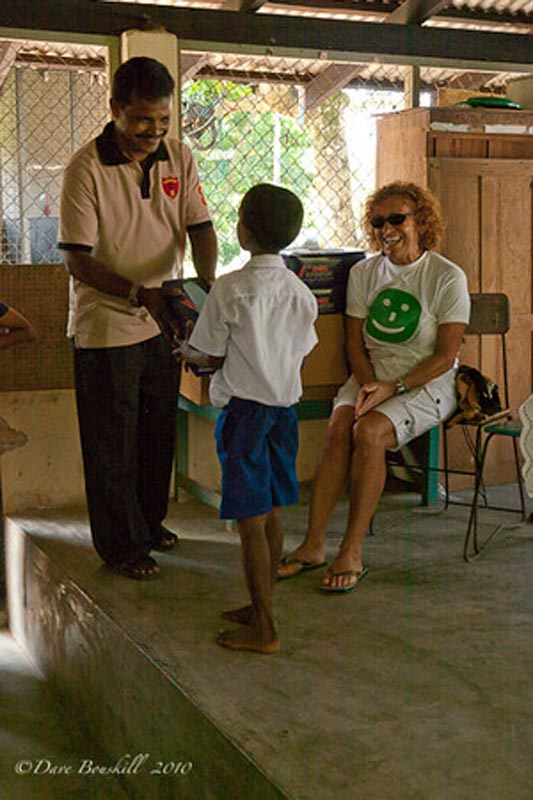
It’s easy to find a project to help or visit when you are traveling. Talk to the local people and ask them for advice.
In Sri Lanka, we met a tuk tuk driver named Ajith who became our friend. As we got to know him, we visited a charity that he started on his own to donate shoes to local school children. They’d otherwise be going to school bare foot in the jungle, but he raised funds to get them shoes and keeps working tirelessly to help the local economy.
Our guide Makau, in Kenya started a project to empower his own village . We visited his family and friends and he is working to bring water to his village, empower women and give them the means to go to school and he got them a cement maker to build a new school.
In China, we visited a school that helps handicapped children . We interacted with them, bought arts and crafts made by them and help to spread the word about their organization.
When visiting these charities, we see first hand where money is going and how it is helping. We can then spread the word, purchase local crafts and talk with people to find learn about their struggles and what we can do to help.
5. Book Local Guides
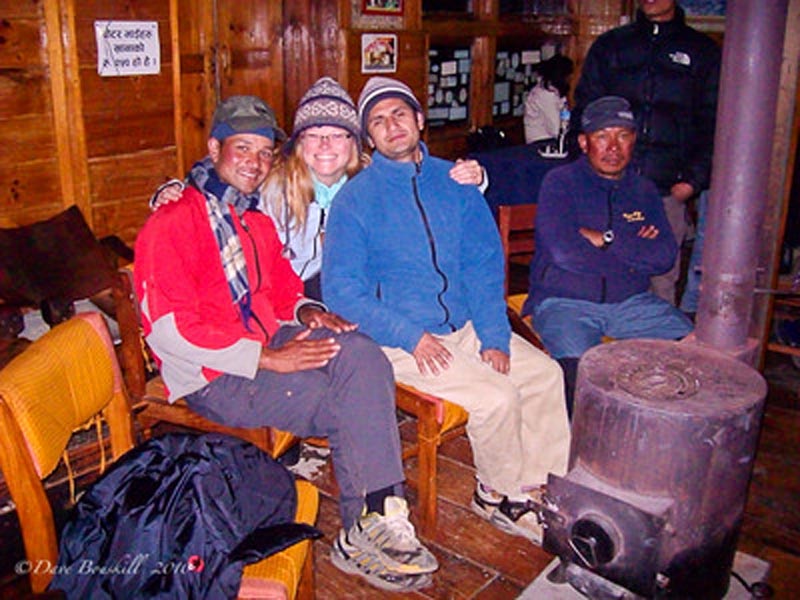
Hire Local Guides and shop and stay locally. When we climbed to Mount Everest Base Camp, Mount Kilimanjaro , Gunung Batur, and Mount Kinabalu , we hired local guides after we arrived in the country. It’s a great way to contribute to the local economy and to support small business and we made good friends doing it.
We still talk to our guides from Everest and Kili. Plus because we travelled with people from the area, they cared about their footprint, were respectful of culture, and filled with information for us to learn about the destination.
6. Shop Local
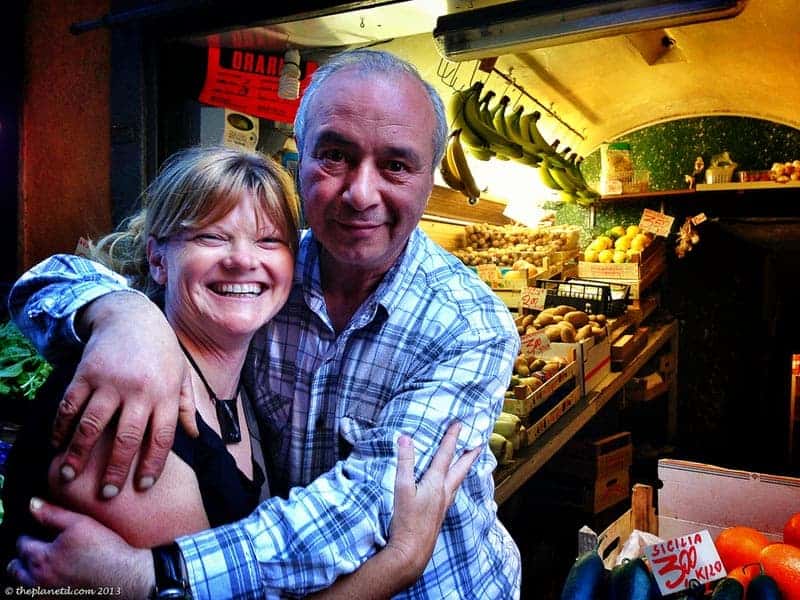
Local artisans make their money through tourism. So do farmers, local businesses and markets. Instead of buying at duty-free or at your resort, go to the market and buy local. It’s cheaper and it’s handmade and authentic. Plus you get to meet the people.
Other Ideas To Add Meaning To Travel – Self Growth
7. take a cooking class.
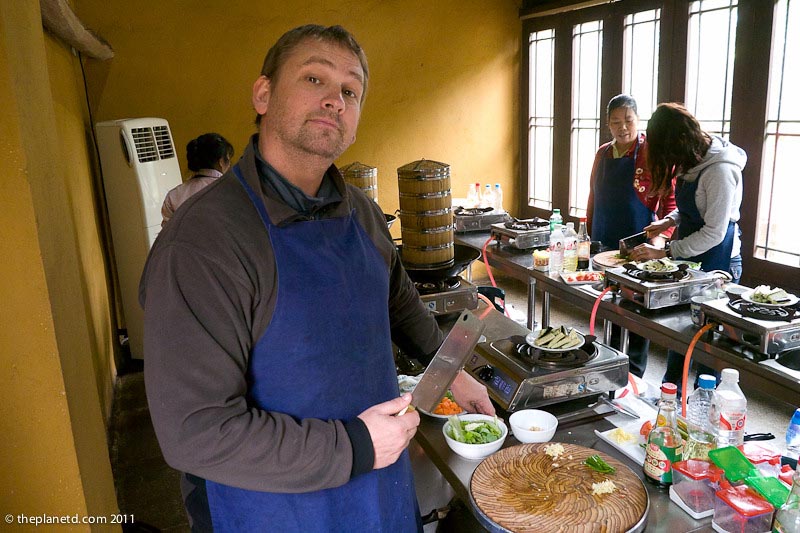
Food is the best way to experiences culture and a cooking course is an amazing way to meet locals and learn about their way of eating.
We’ve done cooking courses in China, Morocco, Thailand, Italy, Spain, and Greece and nearly every one of them takes you to the market to buy your fresh ingredients. This helps you support the local economy and mingle with the locals. We then normally go back to a private home or kitchen to learn how to prepare. It’s then a feast to enjoy!
8. Go on a Retreat
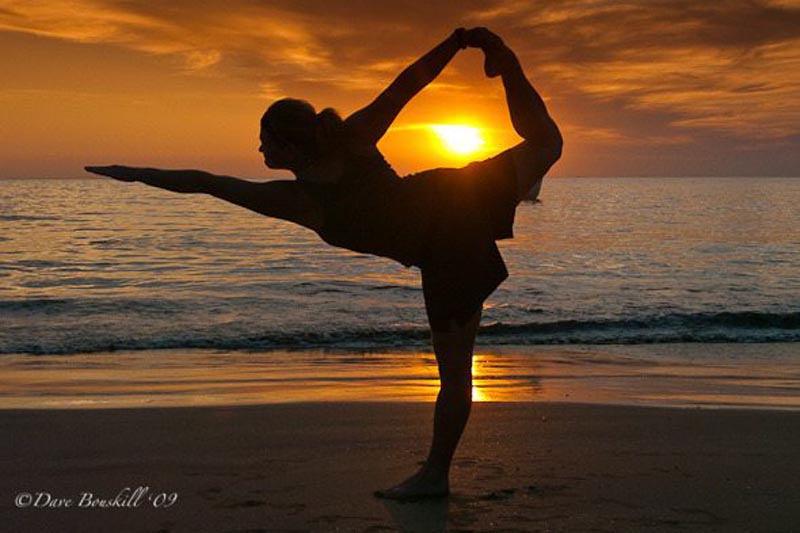
Yoga is not only amazing for well being and fitness, it’s popular around the world! Our best retreats have been when finding ones lead by local operators once we arrive in our destination.
We spent a month in India with a Swami we met on a beach for $2 a class! While others booked their retreats in North American paying thousands of dollars to take a course from a Western Instructor, we had an authentic experience and learned a lot about spirituality and culture in India while supporting a local business.
9. Wildlife Conservation

Elephant Sanctuaries, conservation areas and national parks are a way to add meaning to your travels meaningful. When local people see that animals bring tourist dollars, they’ll stop over hunting and start conservation.
In India, the tiger is nearly extinct, but now they’re working hard to bring it back and National Parks are being set aside to keep them safe. In Sri Lanka and Thailand there are elephant organizations that are helping elephants live in peace . We visited an elephant orphanage in Kenya where orphans are reintegrated back into the wild. When tourists show up to sanctuaries they show that there is an interest in saving and supporting wildlife.
10. Attend a Festival

An amazing way to get to know local culture and meet people is to attend a festival. We’ve had some of our most memorable travel experiences when attending a celebration. From the annual pilgrimage up Adams Peak in Sri Lanka, to Thaipusam in Malaysia and Holi in India, and Songkran in Thailand.
it has added new meaning to our travels. Festivals help us to understand the beliefs and religions of countries we visit and it helps us make new friends and meet new people. Read more: The Best and Biggest Festivals Around The World
There are countless ways to make your travels more meaningful. All you have to do is take the first step. Think about what you love and how you want to help and you too will be having a more fulfilling travel experience.
Why meaningful travel is beneficial?
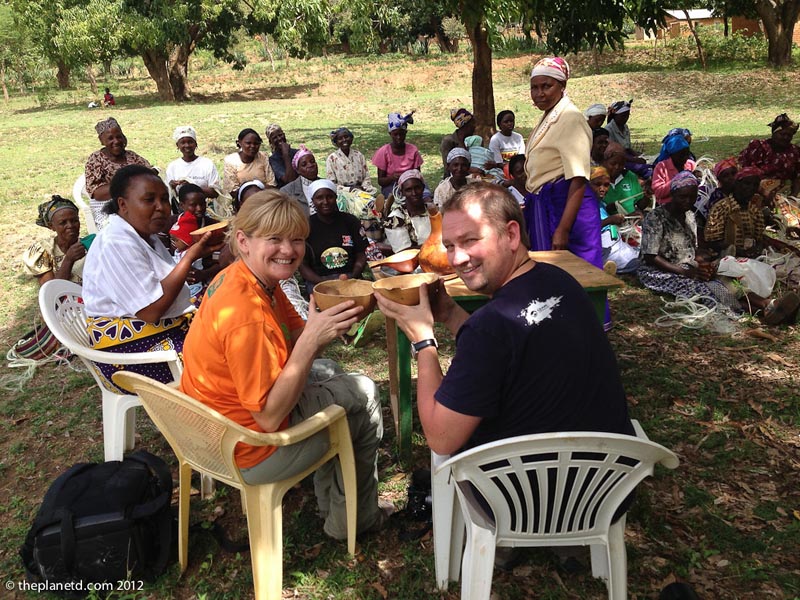
Not only does it help the communities that you visit, it also helps you. We’ve always said that travel is the best education anyone could have. It breaks down barriers and strips away prejudice. It opens people’s minds and when you come home, you pass on your thoughts, observations, and feelings about the places you visit.
As Mark Twain said “ Travel is fatal to prejudice, bigotry, and narrow-mindedness, and many of our people need it sorely on these accounts. Broad, wholesome, charitable views of men and things cannot be acquired by vegetating in one little corner of the earth all one’s lifetime .” See other inspiring travel quotes .
So much of meaningful travel helps with sustainability too. When you volunteer or help with conservation, it keeps communities or wildlife reserves from being exploited. So much of meaningful travel is simply about being aware of your environment and respecting customs and culture.
meaningful travel – Things to Remember
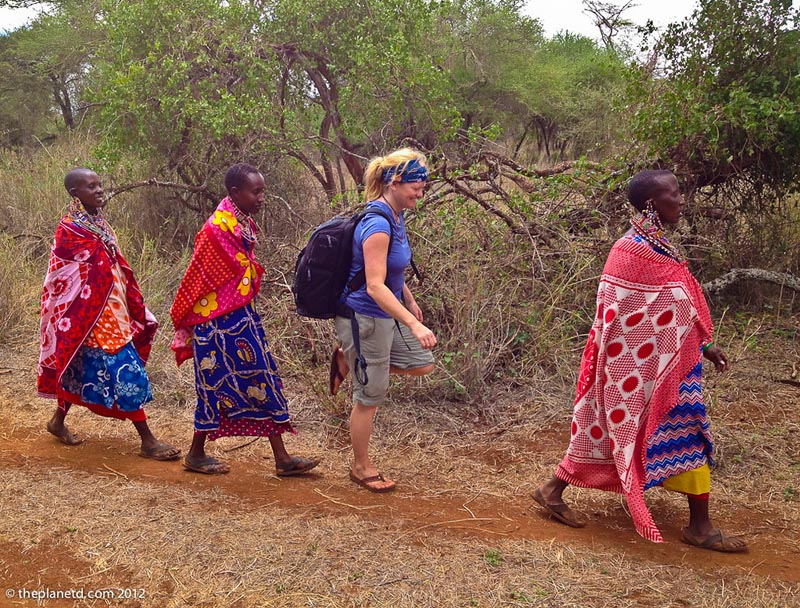
- Think about your impact. How are you affecting the community you visit.
- Will you traveling there enrich their lives?
- Will you have the opportunity to experience the culture, nature, environment? Or will you be isolated and cut of from truly experiencing the destination?

Meaningful travel is not as daunting as people think

When it comes to adventure travel, we always say, start with baby steps. The same can be said when it comes to making your travels meaningful.
It may be as easy as asking a local person at your destination where you can volunteer for a day, or where you can visit children, or donate money to a school or organization. Once you take that first step, you’ll learn and discover more opportunities.
Our first foray into more meaningful travel happened in 2003 in Cambodia. We were sitting on a beach and a man asked us if we could come to his class to speak English to his students for an afternoon. He said that while he can speak English, it helps to have the students hear a proper accent. It was one of the most fulfilling things we had ever done and it kick-started our desire to do something wherever we went. We learned so much that day.
We were humbled, inspired, and moved by their stories and struggles. They enriched our lives as much as we helped them with their English.
What way do you make your travels more meaningful?
- Importance of Responsible Tourism in Chiang Mai
- Best Travel Tips From 20 Years Traveling the World
- Best Adventure Quotes For Outdoor Lovers
Travel Planning Resources
Looking to book your next trip? Why not use these resources that are tried and tested by yours truly.
Flights: Start planning your trip by finding the best flight deals on Skyscanner
Book your Hotel: Find the best prices on hotels with these two providers. If you are located in Europe use Booking.com and if you are anywhere else use TripAdvisor
Find Apartment Rentals: You will find the cheapest prices on apartment rentals with VRBO .
Travel Insurance: Don't leave home without it. Here is what we recommend:
- Allianz - Occasional Travelers.
- Medjet - Global air medical transport and travel security.
Need more help planning your trip? Make sure to check out our Resources Page where we highlight all the great companies that we trust when we are traveling.
You May Also Like
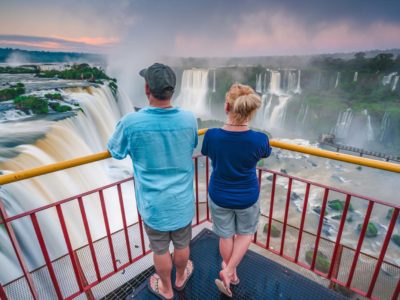
41 Best Travel Apps In 2024 You Need To Download Today

Expert Family Travel Tips – Traveling With Kids
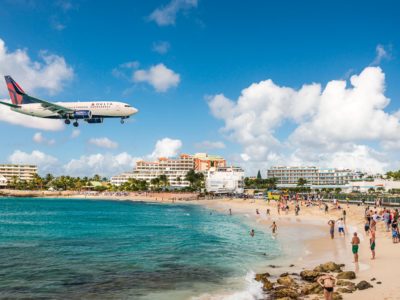
11 Things to Make You Feel Safer Traveling Now
About The Planet D
Dave Bouskill and Debra Corbeil are the owners and founders of The Planet D. After traveling to 115 countries, on all 7 continents over the past 13 years they have become one of the foremost experts in travel. Being recognized as top travel bloggers and influencers by the likes of Forbes Magazine , the Society of American Travel Writers and USA Today has allowed them to become leaders in their field.
Join thousands of others who get our monthly updates!
Leave a comment cancel reply.
Save my name, email, and website in this browser for the next time I comment.
10 thoughts on “How to Make Your Travel Meaningful”
Some great ideas on making your travel meaningful. Shopping local and using local tourism companies is really important, volunteering is amazing though making sure you do it the right way and aren’t taking jobs off locals. I love doing cookery classes in different countries too 🙂
If I ever get a vacation time, Before Going somewhere I will read this post again and then plan my traveling schedule.
Meaningful travel is indeed a two-way street where the travelers’ lives are enriched while stimulating the local economy. One thing, I believe, is also important in achieving meaningful travel is to keep an open mind. The traveler must think that the people as well as each place he/she visits have their own beliefs, culture, traditions and lifestyle. It is a mistake to think that people in one place share the same lifestyle as that of a neighbor.
I think the best way to make your travels more meaningful is to support the local economy and small businesses. I mean do you really need to go to McDonald’s or Outback Steakhouse in (enter location here)?
I also have to agree with Brayan above, about that volunteering causes people to depend on handouts. There are however, some organizations out there that show people in third world countries how to be self reliant by teaching them the skills they need. Some of those organizations are: Pencils of Promise, Heifer Foundation, etc.
Meaningful travel is definitely more than just volunteering – this article is an excellent example of this. I also took a tour with Intrepid tours, I found they were awesome at keeping me mindful of the culture around me, and of ways to help the community and such. I especially love going to local festivals to understand the culture better – I also believe that learning the local language is an excellent tour for creating a more meaningful experience, connecting more with the people around you and understanding the culture of where you are.
I think festival is a good way to meet people if they have activity for you to play with others.
Otherwise, festival is really boring if you go along by yourself.
For example, I went to the bar and club one night, I have no friend going with me.
It is really boring, I don’t even want to dance.
It is just like looking at people.
If I have friend, I will be the wild one.
It is the same for festival, it is like a dance at bar or club.
Great suggestions! I love volunteering- especially with wildlife, and just simply interacting with locals.
I’m so happy you wrote and shared this article! I really want to make my travels from January more meaningful by stopping at volunteer projects on the way, perhaps finding a way to raise money for charity and just simply connecting and supporting local communities. For someone who’s not travelled long-term I sometimes feel like I don’t know where to start to achieve this, this article is great inspiration! I never thought about doing something to raise money for charity at the same time as stopping at their projects on the way, I really like that idea. Hope the show went well!
As you said, meaningful travel is so much for than volunteering. In fact, I’ve been reading a lot lately that some volunteering actually hurts because it causes dependency. Building a house for someone may meet an immediate need, but it also creates an expectation of entitlement. Mentoring that same person on how to get a job, develop a craft, or start a business? That will teach them how to build their own house.
But this doesn’t answer your question. My biggest way to support meaningful travel is to shop local businesses. It’s an enrichment for both sides of the party. I try new things, and they earn revenue.
Great post. I love traveling too and it makes me hard on how to take my travel so meaningful. Thanks for the tips.
8 Reasons Why Traveling Is Good for Your Health
[email protected]
26 Min Read
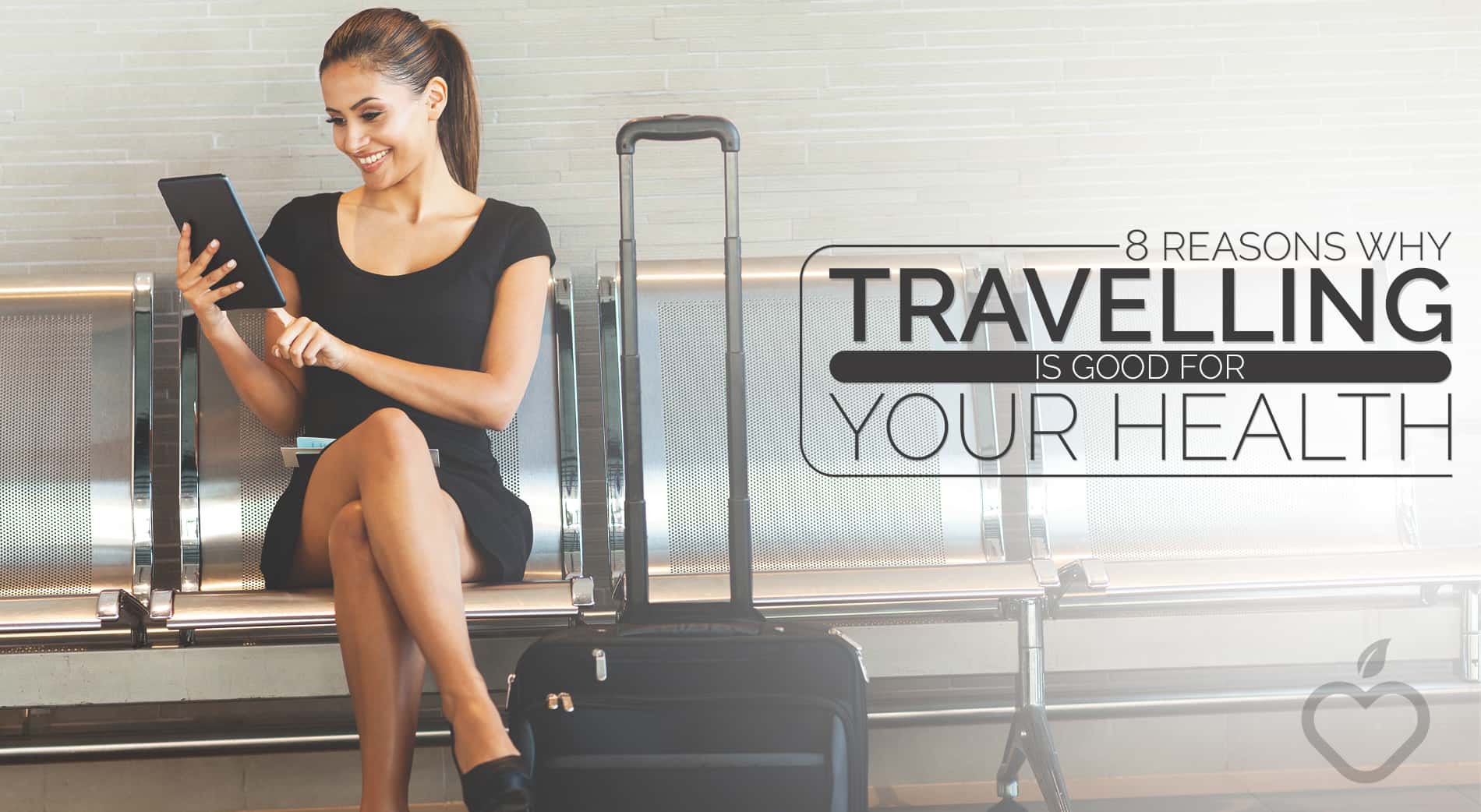
Traveling is one of the best things that you can do for your health. It helps your physical and mental health, with many travelers saying that it’s also excellent for the soul.
Sure, there are some stressful and worrying moments. But overall, when you get out on the road and visit new countries you gain in far more ways. This isn’t about just international travel, either. Traveling your own country and being a tourist in your own town can be so beneficially at the same time.
There are no limits when it comes to traveling, except for what you can afford. You can sight-see around some of your most dreamed about countries or choose exotic adventures. Go by rails, car, or even by boat. There are just so many options, and they will all help you in ways that you have never imagined.
It’s time to save up and plan your next vacation (before you check your rehab report). Get out the itinerary and start enjoying your life in ways so many travelers do. Here are eight reasons traveling is so good for the health, both mentally and physically.
You’re Able to Get Moving

The biggest benefit of traveling is the amount of movement that you will do. You will constantly be on the go, even if you are taking a trip on a cruise. There are sights to see and things to do!
You know just how important constant movement is, right? You know that this is the best way to improve your health. Not only will you help yourself lose weight , but you’re creating a healthier heart and healthier lungs. Your whole cardiovascular system will thank you, along with your blood pressure.
The more activity you do, the more you get your heart pumping. Remember that the heart is a muscle, and it needs to be worked at constantly to grow faster. Making it work harder temporarily will build the muscle and keep it working for longer. You’ll also support your arteries, which means you lower the risk of high cholesterol problems and high blood pressure.
Walking around will help you reduce your stress levels , too. You get the release of the happy hormones, which will mean the worries and difficulties of life will go away. You’ll find other ways to deal with the stress, so it doesn’t cause as many health complications in the future. You’re at a lower risk of having a heart attack or a stroke because of your way of life.
Did you know that studies support the idea of traveling regularly? If you think that your once-a-year holiday is perfect for you, think again. Those who take more holidays in the space of a year have a healthier life. They’re less likely to suffer many of the health complications in the future because they are far more active.
It really doesn’t matter where you go for this benefit. You could spend your whole time in one country. What you really want to focus on is getting the steps in each day. If you are going to take a cruise, you’ll get the activity in when you dock and go sightseeing. Of course, you can also add in more exercise by walking around the ship’s deck and other places. Don’t use your vacation as an excuse to sit around and do nothing the whole time!
If you do take medication, you may find that you need less of it on a daily basis. The activity that you get will help you to improve your whole body’s health, as your heart grows stronger. Your normal high blood pressure reduces to the point where you no longer need to take the medication to keep it down. Your doctor will be more than happy to take off a regular prescription from your list for this reason!
There are going to be times that you need to push your activity levels. While you will have days where you tour a city on a cruise, there are other days where you will be stuck on the ship. Most of these cruises will have somewhere to go where you can exercise. There may be swimming pools up on the deck or a fitness suite with state of the art equipment. Make an effort to use them while you’re stuck on the ship for a few days. After all, you’re paying for the luxuries of the fitness equipment, so you may as well get your full money’s worth!
Challenge Your Brain to Improve Its Health

The brain is another muscle that needs strengthening and challenging. While it doesn’t necessarily work in the same way as other muscles in the body, it can be developed and improved over time. Unfortunately, it can also deteriorate quickly. It is one of those parts of the body that researchers don’t quite fully understand. Just look at The Big Bang Theory at how difficult it can be to understand everything about it.
The great news is that travel has been shown to help improve the brain health. There’s the ability to challenge yourself daily, making you think of alternate options and learn new things. You constantly expand your horizons, meaning that your brain is constantly on the go. This isn’t a bad thing. In fact, training your brain regularly helps to improve its longevity.
Doctors regularly recommend that people do puzzles daily. They encourage Sudoku and crosswords regularly to make sure your brain constantly has to work. By doing this regularly, you help to support the mental health and reduce the risk of dementia or Alzheimer’s in later life.
While traveling isn’t quite the same as crosswords, it does offer many of the same benefits. This is especially the case if you go to new places and visit new places. You take in new cultures and learn all about history and plans for the future. There’s something new to remember, meaning that your brain is getting some sort of workout, even if it’s not exactly what the doctor ordered.
On top of all this, scientists have found that walking or hiking is excellent for physically growing the brain. As we get older, our hippocampus gets smaller. We have two hippocampi on either side of our brain, which are responsible for the retention of information. The smaller they get, the less information they are able to take in. They control the short and long term memory, so you want to keep them as big as possible.
When we get more activity, our hippocampi both grow instead of shrink. It will be much easier to take in all the information that we’re learning throughout our travels. Studies have actually shown that those who walk regularly grow their hippocampi by two percent every single year. Just imagine what it will be like over time!
Wouldn’t you love to prevent memory and cognitive issues in your later years? Your family certainly would!
There is another major benefit of traveling to the brain. Not only do you improve memory and cognitive abilities, but you also boost a number of positive thoughts you will get. Your whole mental health is support through getting out and seeing the sights.
One of the biggest ways you benefit is through the fresh air. You spend more time outside, getting different scents and just benefitting from the extra oxygen in your body. Of course, there’s also the walking that will help you gain some other oxygenated benefits. Your heart pumps more oxygen around the body, especially into the brain.
When you spend all your time at home or at work, you will find the stress hormones release. With the fresh air, your happy hormones are boosted. They keep the stress hormones to a minimum. You feel less tired, and you can find the positives in your life so much easier.
You also get to do something fun. You remove the problems from home, so you can actually do something that you want. By doing something fun, you’re increasing a number of happy hormones that are released into your body further.
More happy hormones mean that you will feel less pain and starve off depression. If you do suffer from depression, you may find that you limit the relapses that you have. There is something new and exciting. The exercise becomes addictive, and you want to see more and do more. You don’t give the negative thoughts a chance to cloud your judgment.
At the same time, your body is able to fight off chronic pain issues. You find it easier every day to walk around and do more. Chronic pain is one of the most common reasons for people to not move around, but this can make it all worse!
Get Away from the Everyday Stresses in Life

The more you get away, the more you move away from the everyday stresses of life. You get to take your mind and body out of work, family life, and other problems.
Of course, this works better if you’re not putting yourself into financial trouble by traveling. If you’re on the road and constantly worrying about money, then you will find it harder. This is one of the reasons some people will work while on the road. They choose to spend some of their time writing about their traveling adventures or cover topics for a blog or make money through internet marketing. They then get to gain the benefits of traveling without having to worry about their finances too much.
Getting away from the stresses of everyday life is important to protect your overall health. Stress is a silent killer. It raises your blood pressure, and your whole mental health will be affected. The stress hormones cloud the judgment and affect the release of happy hormones.
When you travel, you are boosting the release of happy hormones to take over the stress hormones. You take yourself out of the situations that are harder for you to struggle. You also find enjoyment in life that you haven’t had before.
You’re also finding ways to unwind. It’s no secret that we all need a work life balance. We need time away from work to be able to spend time with our family. Travelling offers this chance. This is one of the reasons why scientists have found that those who travel regularly improve their overall health. They’re able to get that work-life balance and ease the everyday stresses.
It’s easier to get out of the drudge of regular routines. You’re not constantly looking at the clock to work out how much time you have until you have to get the kids from school. There’s no need to worry about what you will make for dinner or question if you have all the ingredients in the house. The mad morning rush to get everyone ready for school and work is eliminated.
Travelling allows you to take things at your own pace. Sure, you may be stuck to an itinerary if you book some type of group travel, but you will find that it is still lighter than the routine you have at home. It’s also something different and new and exciting to deal with while you’re away.
When you do return to your everyday life, the stress of your everyday life doesn’t seem as bad. You return to an old routine that is different from the last week or month (depending on how long you’ve been away). You’ll find that the everyday routine is something that you don’t mind as much anymore. That is until you get fed up of it again and are ready to travel again!
You’ll Find It Much Easier to Cope with Stress

Whether you are worried about someone’s health or just have a high-stress job, trying to deal with everything going on in your life isn’t going your health any good. Getting worked up about everything is causing your heart and other organs to fail. You won’t be happy, and you’ll feel exhausted every single day.
You need to step away and start traveling. Getting away from the everyday stresses isn’t just a way to unwind. You’ll find that traveling helps you cope and deal with stress so much better. In fact, you can find that situations that were once a nightmare are those that you breeze through when you return.
Travelling does bring its own stress. You have to make sure you stick to a travel agent itinerary or get through airport chaos. You may have to deal with delays and flight changes. Then there are the stresses of other travelers around you and fitting into a new culture as a tourist. There’s the uncertainty of what you will do the next day or what will happen in your life.
Initially, this can sound like it will make your life worse, but really it will boost your health. You start to realize that there are new ways to deal with a situation. You find that stress is arbitrary and your tolerance for certain situations will grow. The situations that you face on your travels may be worse than those that you face in your everyday life, so you start to deal with those situations in a better way.
You develop new coping strategies when on the road. You want to be able to enjoy your trip and not look back at how much of a nightmare it was. There’s also the adrenaline rush that you gain from getting through the situations. This is especially the case if you tackle an adventure holiday. There’s an adrenaline rush when you push yourself out of your comfort zone.
Coping with stress is essential. You will find that your overall health benefits because you don’t get the regular release of stress hormones. You’re not always looking out for the downsides in life and will find it easier to find enjoyment in everything that you do.
Research backs this up. When you start to accept deviations and problems, you start to deal with them much better. The deviations you accept can be completely different in everyday life, but your new mental attitude will benefit work, family life, and more.
Boost Your Creativeness to Boost Your Health

Did you know that more creative people are healthier? Okay, so this isn’t in every single case, but you will help to improve your life and health by focusing on a more creative approach. The great news is that traveling will help to improve just how creative you are in life.
Let’s look at authors and painters. Before they start on a new project, they will usually travel. This could be to the area that they want to write about or just to an area that somehow links to their ideas. Sometimes they’ll just go somewhere because they want to experience a new culture. They build ideas from the area that they are.
This is especially the case for writers. When they get out of their own location, they witness far more and build ideas from their experiences. They see how people interact, learn new things, and see new sights. They can create a full story idea within a day because of the new sights, sounds, and experiences they gain.
When you travel, you can take advantage of this in life. While traveling, you pull yourself out of your comfort zone. You force yourself into situations that you wouldn’t usually experience; situations that you don’t necessarily have control over.
Remember the deviations and stressful situations that we’ve already mentioned? Well, there are times that you will have to think ahead. You need to focus on how you can get out of the situation that you’re in and that leads to some creative thinking. This type of thinking is then remembered for your every day in your life, linking into building tolerance over and finding new ways to handle stressful situations.
There’s then the experience of the new cultures. You see how other people handle life and stress. You see what they do to get through their day—and even the types of situations they will find themselves in. There’s the appreciation of a new culture, which gives you a new method of handling your own problems.
It’s not just the traveling aspect that will help to boost creativity. The planning stages can help. While planning, you look for new places that you want to go and things that you want to see. You look at the adventures that you want to take part in and the things on your bucket list that you want to do. This is a chance to dream, and you get to think about what you’d do when you’re in a new country.
There’s the chance to develop a dream board and create stories about what you would do while somewhere. When you’re there, you can follow your dreams, or you can find something else that you want to do. You open yourself up to far more situations that will fuel future desires and dreams.
How does all this help your health? You constantly push your mental state and yourself out of your comfort zone. You create new situations and build new connections, improving your mental health incredibly. You’re at a much lower risk of developing depression, and you can control your anxiety issues immediately.
The new creativeness will also boost your confidence. You know that you can deal with anything that life throws at you, so are willing to take on more risks. This can also help your overall life, rather than just your health.
Boost Mood and Thoughts Through Social Connections

Isolation is one of the worst things in life. While you think that you may like the quiet, it can be draining on you emotionally. Humans aren’t isolated creatures. We crave the social interaction of others. Maybe not every day, but we do benefit from some social interaction regularly—and definitely not just with kids!
When we don’t get that social interaction, we tend to feel alone in the world. We can have friends everywhere, but they’re no good if they don’t talk to us. Isolation can lead to depression and dark thoughts. We’re more likely to have suicidal thoughts. Those who do already have problems with depression and suicidal thoughts are more likely to give into them. After all, who will really miss you?
Traveling helps to cure this problem. You are forced into situations where you need to talk to others. This is something that happens even if you decide to travel alone and backpack around a country or a continent. You spend time in youth hostels and on cruises, where some of the only entertainment is with the strangers that you meet.
Sure, there is a danger in some of this, so it is important to have your wits about you. Therefore, traveling with someone else is often a better idea.
When you do travel with someone else, you both find yourself having nothing to do but talk to each other. The connection that you have will be deeper, as you find out more about each other and build on the experiences together. You find joint ways to deal with the deviation from various plans and delays that you may have in traveling.
You start to pick each other up when you’re down. You’ll notice the early signs that there is a problem, meaning that you can nip it in the bud quickly.
Connecting to strangers is much easier as you look for guidance in a new area. You want to know the best places to go and need help with various situations. There’s the ability to see how different cultures celebrate holidays and handle various stressful events that occur.
Some of these connections that you build will be connections for life. You may find that the people come back into your life in the future, allowing you the chance to build the connections deeper.
There is also the ability to push your beliefs and understandings. What you once thought was dark and twisted may become a new normal. What you once accepted by the people around you are now a view or belief that is frowned upon, and you can see both sides to an argument.
The more connections you make, the more confidence you gain. You start to push yourself more and force yourself to make more connections. When you return home, you are more likely to rebuild connections with people you’ve lost. As you find what you need to improve your mental health, you make sure you get it daily.
You never know what those social connections could lead to. Plenty of people has fallen in love while traveling, which has helped support their love for traveling since they meet like-minded people.
Find It Easier to Boost Weight Loss Efforts

If you’ve ever wanted to lose weight , you want to look at traveling more. Sure, you must eat out more, and you don’t always get to control a number of calories you eat, but you will find it much easier to create a calorie deficit.
Let’s focus on the activity element that was our first main benefit of traveling. When you do more activity, you instantly burn more calories. You make it easier to get rid of the excess calories that you eat on a daily basis. This doesn’t matter if you take a cruise holiday or you backpack around the Amazon! You can take one of the calmest of vacations, and you will still find it easier to lose weight.
There’s no need to do anything majorly special either when it comes to activity. You’ll find that you want to make the most of your time in a new country or around a new culture so you will push yourself more to getting around all the sights. You spend all your day out of the house and get home realizing that you’ve walked 15,000 to 20,000 steps—at least!
This can depend on where you go and what you do. If you’re on a cruise ship, there may be days where you don’t get to dry land. However, these types of ships tend to have swimming pools and fitness suites. Make sure you use them to help boost your weight loss efforts—what else are you going to do?
But yes there is the issue of food. All that walking won’t necessarily work off a number of calories you consume, right? Well, this depends on the type of food that you choose to have. Enjoying that one authentic Belgian waffle or trying out the deep-fried delicacies of The South aren’t going to make you pile on the pounds suddenly. It’s about all the food you eat while away and not just one particular meal.
In fact, trying out the local foods is something that you want to do. This is the way to experience the new cultures and immerse yourself in your travels.
The trick is to follow a healthy and balanced diet still. While you can’t completely control everything you eat, you still have some control. You can choose the better restaurants to get all your food groups and even go out and buy fresh fruit and veggies from local market stalls to make sure you get your five a day. You’ll soon find that you have far more control than you thought you did.
This can also depend on where you go. If you travel around Asia, you’ll find that sticking to a calorie deficit diet is much easier than before. This is especially the case of Japan and parts of China, where there is a major focus on a healthier and more fulfilling diet.
You’ll also find that the more activity you do, the less you want or crave the junk. You can try out local delicacies now and then but will find it easier to opt for the healthier choices on the menus.
And then there’s also the water. This is something you need to work on actively.
We tend to drink less, especially when traveling. We find it harder to stop for a drink and don’t always buy the right options. After all, there are so many new cocktails that you want to try!
It’s important to make sure you carry a bottle of water around with you at all times. It doesn’t matter where you are or what you’re doing, have that bottle of water. And then keep topping it up! If you are in an area where the tap water isn’t great, make sure you set a budget that allows you to buy bottles of water regularly to keep your water intake up.
When you lose more weight, you instantly boost your health. Your heart doesn’t have to work as hard to do everyday things. Your blood pressure and cholesterol levels will drop. You’ll find that it’s easier to breathe and your chronic pain starts to disappear. Doing more is something that you love the idea of, and you’ll want to get out and travel more.
Of course, weight loss also leads to more confidence. You know that you can do more and you aren’t ashamed of or afraid of what people would think of your weight. This instantly helps to boost your mental health, as you’re less likely to allow the depression or anxiety to seep through.
Try Out Alternative Lifestyles and Health Remedies

When you visit new cultures, you get to experience how other people live. This isn’t just about developing new social thoughts or beliefs, but also about witnessing health remedies and different types of lifestyles.
Traveling will let you try out the alternative lives safely and without too much commitment. It’s possible to get away from the touristy areas and focus on how the real people live. This is a chance to experience what it would be like to live there. This is definitely something to do before you take the permanent step of moving somewhere.
One of the benefits of traveling is the freedom. You don’t have to stay where your friends once did. There’s no need to go to the tourist hot-spots that the travel guides say. You can look at doing a month or two in an area where you teach and actually live, especially in Asian communities.
It’s possible to shed the familiarity of people like you and focus on building the right type of social connections. This is the chance to immerse yourself in a new culture.
There’s certainly the benefit of the alternative health remedies. This is the chance to see how herbal remedies really help to cure ailments and soothe problems. You get to try the remedies from the original place they were created, by practitioners who know what they’re doing. You’re not worried about health shops at home adding other chemicals to them or selling them at overrated prices.
If you decide that they do work, you can take some back with you. You also get to find out about the real ingredients so you can make them at home.
This could be your ability to step away from the pharmaceutical medications. There are so many that certain help ailments but can cause other health problems. Just look at the list of side effects that are common in some of the everyday medications. Some of the medications can also affect the balance of your hormones, which is a problem that you will avoid completely when you opt for natural remedies. These remedies have worked for others for centuries, so why not for you right now?
You also help to support your mental health. You know that you have a natural and healthy way to support your body. You feel more in control, especially financially when the pharmaceutical remedies can be so expensive.
Where Will You Travel First?

Traveling really is one of the best things that you can do for your health. This is something that supports both your physical and mental health. You will get to support your emotional health and life a better and more natural life, even when you’re not traveling.
The eight reasons to travel more above are a snapshot of the way you will benefit. There are just so many more reasons to travel to help protect your health. They all link some way into the reasons above but deepen your benefits considerably.
Just think about the social connections you can make and the way that you will feel. You get to escape the isolation, especially if you currently don’t work or your job involves a work from home element. This is your chance to step out of the rat race and take on cultures that you’ve only ever heard of.
There are some steps that you’ll need to take to look after your health. One thing that you don’t want to do is give up your current medications for the herbal remedies. You need to make sure they work and improve your health for the better. It’s also important to watch out for bacteria in the water or any problems with cooking certain types of foods to keep your overall health safe.
When you do decide to travel, make sure you’re getting plenty of activity. While cruises give you the chance to sit back and relax, you want to take advantage of the swimming pools and fitness suites onboard. There are going to be days where you don’t see dry land, but you still want to walk around and do some sort of exercise.
But then the relaxation is also important. You want to unwind from the everyday stresses of your life. You need to spend time seeing how others deal with stress and push yourself out of your comfort zone. Build a tolerance and find a new way of handling stress every day.
Traveling really is one of the best things that you can do. All you need to decide now is where you will go first.
Originally published at www.positivehealthwellness.com

What is travel? We answer the big, burning question
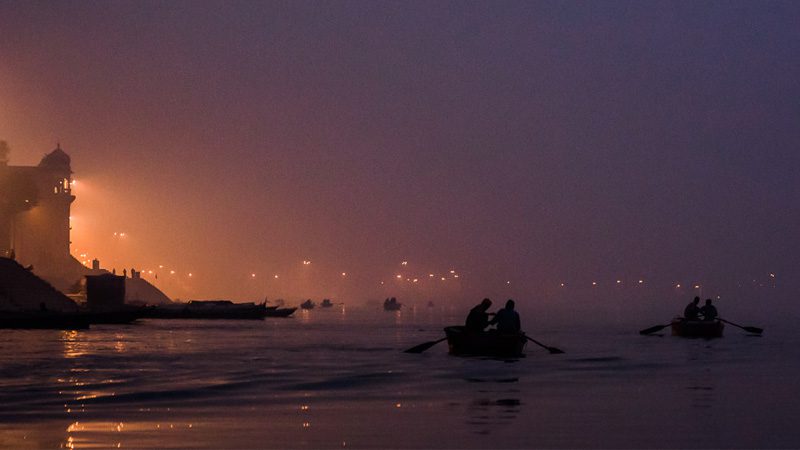
‘What is travel?’ is an interesting question, but more for what it tells you about the people doing the asking. The meaning of travel, despite ‘definitive’ articles to the contrary, is pretty subjective. And your relationship to it changes as you get older and begin to spend your weekends doing things like browsing health insurance policies. Reasons and motivations begin to wrinkle, just like us, revealing character.
Because when you’re young travel is sensory and simple. It’s that white-knuckle feeling of a plane taking off for the first time, when your stomach drops and your ears pop. The sustained hyper-real sensation when everything is new and brightly coloured. Ice-creams taste sweeter, smells are stranger. You can almost feel the synapses firing, taking it all in.
By middle age the motivations behind travel get more complicated, like your tax returns. It becomes an escape from cubical drudgery, a sun-soaked interlude from Real Life, or an existential change of perspective: the cultural equivalent of surfacing for breath. There’s more awareness about where you’re going, and what’s waiting for you when you get back home.
In his famous essay Why We Travel , Pico Iyer said , ‘We travel, initially, to lose ourselves; and we travel, next, to find ourselves.’ And to be honest, he kind of nailed it. The very fact that people dwell on the nature of travel, try to get at its secret truth like hungry kids scrabbling at a piñata, is because we feel deep down that there’s something magic in there: it makes us happy . And not just happy in the way you feel when you upgrade your iPhone. A more deep-seated, integral sort of happiness (maybe ‘content’ is a better word – more wholesome, less fleeting).
This happens even when we’re uncomfortable on our travels – perhaps especially when we’re uncomfortable. When we lose the map in Hanoi and have to improvise with pigeon-Vietnamese and hand gestures. When the tent leaks in Yosemite and we wake up with wet socks. When our legs ache on the Inca Trail and we’re pretty sure the small Peruvian porter is judging our lack of fitness. All temporary discomforts that somehow add up to…what? Personal discovery? A sense of accomplishment? A good over-dinner anecdote? It’s hard to pin down why, but we know instinctively that there’s gold there.
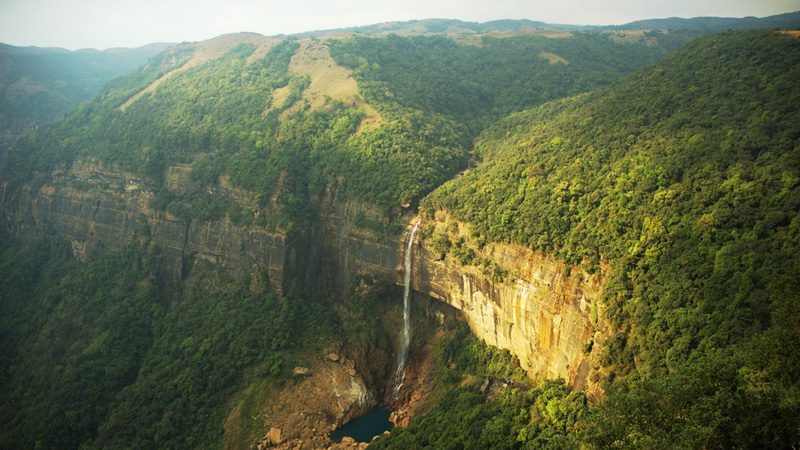
Image Pankaj Kaushal, Flickr
I think it’s got something to do with the way we live now. Most things in our lives are geared towards convenience and gratification, which is another way of saying most things are predictable. We spend a lot of energy trying to eliminate discomfort from our meals, television watching, phone calls, work spreadsheets, morning commute. Basically deleting anything resembling a surprise. Is it any wonder we’re so bored?
But travel isn’t like that. When travelling, discomfort finds you . The whole thing is unpredictable at a fundamental level. That’s kind of the point. When you order chargrilled gizzards in Tokyo’s Memory Lane or fight for seat space with chickens on a bus in Ecuador, you don’t know what’s going to happen next. And isn’t that incredibly liberating in a way? It’s like a search for something that can’t be Googled. Something that has to be earned through effort, not given by chance.
There’s a great quote from Robert Pirsig in Zen and the Art of Motorcycle Maintenance that goes: ‘It’s the sides of the mountain which sustain life, not the top.’ Which is a pretty apt description of travel, all things considered. Life occurs in the hard uncomfortable bits, not the breezy view from the summit. And sometimes the old chestnut is true after all: the destination doesn’t matter, all we want is somewhere to get lost on the climb.
Feature image c/o Karl Grenet, Flickr
Feeling inspired?
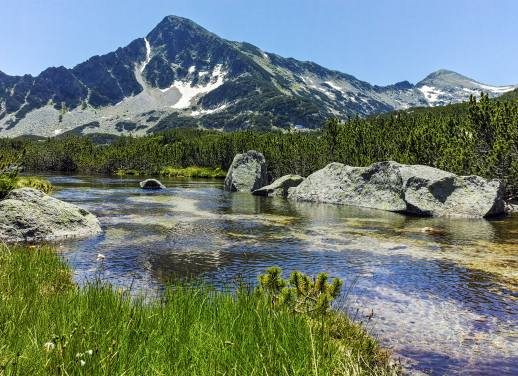
James Shackell
I was born in 1987 and aged from there. I like the sound of pop-rocks and dislike the sound of styrofoam. The length of my forearm is approximately the same as the length of my shin. My favourite Beatle is Ringo. I believe that junk food tastes so good because it’s bad for you and that your parents did the best job they knew how to do. If Johnny Cash wrote a song about my travels it would be called ‘I’ve been to several places but still have many other destinations on my to-do list, man’. Sometimes I have trouble finishing sen
You might also like
The 7 best places to go on a..., galapagos or madagascar which unique destination should be..., travelling to chile here’s the best time to..., 10 reasons to visit samoa, the 10 antarctica questions you want answered, australia or new zealand where to go on..., 10 epic spots to stop at on your..., small group travel vs coach tours: which style..., costa rica or mexico: which country to check..., 7 of the best destinations for solo travellers..., machu picchu or chichen itza which historical site....
17 Reasons Why Around the World Travel is Good For You
Why travel around the world.
We’ve compiled a list of the best reasons why everyone should enrich their life with around the world travel. And while we’re at it…all these reasons can also be taken as our motivation for doing what we do at AirTreks.
1. Traveling is easier than you think.
We believe that traveling around the world shouldn’t be hard: it’s actually something everyone should be able to do at least once in their lives. Whether you choose to spend a few years or just a couple months traveling this beautiful planet, it’s important to see what’s out there. It’s up to you to make the dream come true and take the first step. Launch TripPlanner to piece together and price your ideal route. Not sure where to start? You can always call one of our travel consultants and get some complimentary advice!
2. Travel opens your eyes.
If you’re open and willing, travel will make you an incredibly more well-rounded human being. And that’s really the goal, isn’t it? If you don’t know where to start, check out our Around the World planning guide .
3. Traveling helps you learn who you are.
All the challenges and opportunities travel lays at your feet help you discover who you are in a way that’s only possible on the road.
4. Travel creates meaningful relationships
People you meet while on the road become some of the most valued names on your contact list. They become places on the map to visit later on. These folks give you a glimpse outside your hometown circle of friends, and force you to take in new and refreshing perspectives, and ultimately realize that everyone is the same.
5. Traveling develops skills you didn’t know you had
Sometimes it’s only far from home that you realize you you’ve got skills you’ve never used. It’s travel that brings them to the surface and makes you smile, satisfied to have reached the mountain top, or crossed a gorge or helped a villager clean up after a storm, or even to have successfully ordered a meal at a rural Chinese restaurant.
6. Travel helps you learn new languages
There’s something satisfying about being able to throw around a few words of Greek, knowing how to say thanks in Thai, pulling out that long dormant Spanish to book a room in Santiago, or simply hearing a language you didn’t know existed just a few weeks before.
7. Travel means adventure
Zip-lining over the jungle canopy in Peru, successfully navigating the maze-like streets of Venice, bartering for the best price in the traditional markets of Marrakech, taking a speedboat ride in New Zealand, or hopping in a Land Rover and heading out to watch animals grazing in Tanzania: these are adventures worth having. People are hardwired for the excitement of adventure and travel may just be the best way to tap into it.
8. Traveling gives you perspective
Meeting people from other cultures will teach you that the way you’ve been looking at the world isn’t the way everybody else does. In fact, your point-of-view might have some major blind spots. Seeing the world for yourself will improve your vision and your grip on reality.
9. Travel helps you move forward
If you’re between jobs, schools, kids, or relationships, around the world travel can be a perfect way to move from one of these life stages into your next great adventure. A big trip won’t just ease your transition into the next stage of your life , it’ll give you a chance to reflect on where you’ve been, where you’re going, and where you want to end up.
10. Travel is education
Seeing the world provides an education that’s absolutely impossible get in school. Travel teaches you economy, politics, history, geography, and sociology in an intense, hands-on way no class will. Fortunately, the school of travel is always taking applications , no entrance exam required.
11. Travel challenges you
Getting your daily latte at the same place and staring at your screen at your nine-to-five every day not nearly interesting enough? Even if you choose to work on the road (and keep staring at the screen), you’ll have to find a new place to drink your latte, and depending on your destination, finding coffee, and foamy milk or a good place to sip them could prove to be a sizeable challenge. Travel is full of moments of joy and challenges. Overcoming the challenges gives you some of the greatest joys of all.
12. Travel shakes things up
It sucks to be stuck in a rut. Everyone knows what that’s like. A big trip can be your perfect solution. Fly around the world, stopping over in all of the places you’ve always wanted to visit. Go ahead and plan your ideal route around the world (it’s easier than you think!)
13. Traveling proves that dreams do come true
You imagined it, daydreamed about it, envisioned it. Guess what? It can be done. Around the world travel is possible, you just have to decide you’re willing to take the first step and start planning your itinerary. What are you waiting for? We’ve put together some specials to inspire you to live your dream .
14. Travel gives you cool stories
Let’s face it. Even for folks who can’t tell a story, just the words “last year in Mongolia” get you instant party points. Even when events seem trivial, nostalgia and distance create an irresistible spin that makes mundane things like getting your laundry done in Zanzibar, entertaining. Just don’t be that person and overdo it!
15. Travel is literally food for thought.
You’ll be constantly surprised at the flavors the world has to offer. The way people in other cultures and countries prepare food, and break bread together (not that all cultures even eat bread) will astound you.
16. Travel gives you a sense of accomplishment
If you’re the kind of person that dreams big, you’re probably one to reach for new challenges. Finishing a trip gives you the satisfaction that you were able make a goal to travel and accomplish what you set out to do–see the world.
17. Traveling for the hell of it
Why travel? Because you can. Because you want to. Because it beats the alternative (staying home). Why not pick up your tickets and get the ball rolling!
Build Your Trip


Why philosophy is an ideal travel companion for adventurous minds
Associate Professor of Philosophy, Durham University
Disclosure statement
Emily Thomas receives funding from the AHRC.
Durham University provides funding as a founding partner of The Conversation UK.
View all partners
In 2019, there were 1.4 billion international tourist arrivals globally – and, given that the planet only holds 7.7 billion humans , this figure alone suggests that a lot of us are travelling. The World Tourism Organization reports two major motivations for this – “travel to change”: the quest for local experiences, authenticity, transformation and “travel to show”: the desire for Instagramable moments and destinations.
I think both trends are fuelled by curiosity about the unknown, the unfamiliar. Humans have always looked for new experiences, ways to live, things to show to others. Travel magazines are strewn with articles about visiting “ overlooked ” and “ unknown ” places – and this curiosity has a long history.
Throughout his Antarctic explorations , Apsley Cherry-Garrard yearns for “unknown” places. Mary Kingsley describes the “sheer good pleasure” of canoeing down an “unknown” West African river by moonlight, and delights in places “not down” on maps. A character in Joseph Conrad’s Heart of Darkness describes how “inviting” the “blank spaces on the earth” seem and tells us about his hankering for “the biggest, the most blank”.
Philosophy can also be about exploring the unknown. In one of his groundbreaking books on idealism, 18th-century Irish philosopher George Berkeley likened his investigations to a “long Voyage”, involving difficult travel across “wild Mazes of Philosophy”. Scottish Enlightenment philosopher David Hume offers similar reflections halfway through his most radical sceptical work A Treatise of Human Nature .

He imagines himself as a sailor who has struck shallow water, narrowly escaping shipwreck. Safety tempts him to remain perched on the rocks, rather than venturing out onto “that boundless ocean, which runs out into immensity”. Yet Hume decides he will put out to sea again, in the same “leaky weather-beaten vessel”.
Wild mazes of thought
The “philosophy of travel” isn’t a thing. It isn’t the subject of lecture courses, or conferences – there are no lists of great philosophical travellers. But, as I argue in my new book The Meaning of Travel: Philosophers Abroad , travel and philosophy have enjoyed a quiet love affair for centuries.
Travellers and philosophers can both aim at pushing the limits of their knowledge – at seeing how the world is. Adventurous travellers covet new places – even Earth’s unexplored oceans and planets around distant stars. Radical philosophers crafts new questions and shake old assumptions. What is time? Or matter? Or goodness?
You might think wishing for the unknown is the only thing philosophy and travel have in common. Travel involves trains, passports, luggage. Philosophy involves books, ethics, bearded Greeks. But despite their differences, travel and philosophy are tangled together. Travel has affected philosophy, and philosophy has affected travel.
Travel can help philosophers develop new questions. For example, 17th-century European travellers began bringing home, en masse, reports of foreign customs and beliefs. John Locke, the “father of liberalism” – and a voracious reader of travel books – discussed practices that Europeans found shocking. His Essay Concerning Human Understanding describes cannibalism among peoples in Georgia, the Caribbean and Peru; the immodest sex lives of Turkish saints; and atheism running rampant throughout China and Thailand.
Some of these reports were erroneous: reports of cannibalism were exaggerated , while – even then – China and Thailand had long religious traditions. But it was becoming clear that people across the planet disagree about ethics and religion. Locke used these disagreements to raise a philosophical question. Are there any innate ideas that all humans are born knowing? (For Locke, the answer was “no”.)
New questions
Travel is still prompting new questions today. What are the ethics of doom tourism, to places affected by climate change? Can we imagine what other, non-human minds are like? How might space travel affect us?
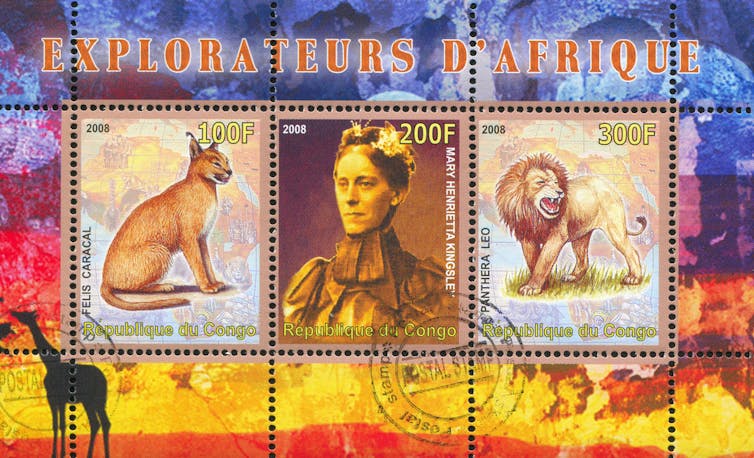
Just as travel has moved philosophy forward, philosophy has sometimes pushed travel practices in new directions. Every so often, a new philosophical idea impels travel to particular places, or in particular ways. For example, American literary scholar Marjorie Hope Nicolson’s Mountain Gloom, Mountain Glory argues that, from the late 17th century, a new theory of space incited tourists to visit mountains. On this “ Absolute ” theory, space is God’s immensity or infinite presence.
Nicolson argues this led to people perceiving big, infinite landscapes such as mountains as divine. “Great cathedrals of the earth” – as the Victorian thinker John Ruskin wrote of the Alps – “altars of snow”. Once mountains had become cathedrals, everybody wanted to visit them.
Similarly, the philosophy of wilderness set out in American philosopher Henry Thoreau’s Walden started a craze for solitary wilderness travel – and cabin porn .
What counts as unknown depends on your starting point. For British sailor James Cook, Alaska and Australia were “new” lands – but their indigenous inhabitants knew them well. Roman Syria would have been unfamiliar to Chinese explorer Gan Ying, but not to the Syrians. Sometimes journeys explore places unknown to all human beings: the depths of Son Doong caves , the under-snow mountains of Antarctica , the Moon and Mars .
Philosophers can also venture into areas of thought that are new to them but familiar to others. I would have this experience if I began researching medieval German philosophy, or contemporary Chinese philosophy. And philosophers can attempt to strike out into wholly new areas of thought. I think this is when philosophy and travel are at their most fascinating: when they look to the borders of what humans do not know.
- Joseph Conrad
- Travel writing
- Philosophers
Want to write?
Write an article and join a growing community of more than 182,800 academics and researchers from 4,948 institutions.
Register now
28 Beautiful Travel Words that Describe Wanderlust Perfectly
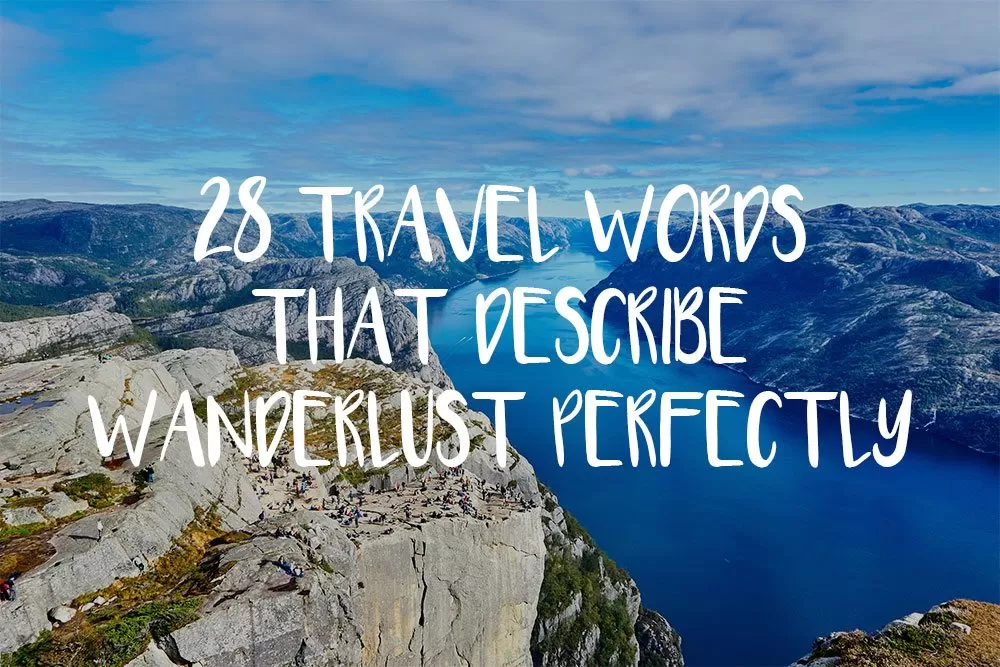
Describe your travels with these unique and beautiful travel words from different languages around the world.
I love travelling and I love languages, so imagine my excitement when I came across a treasure trove of travel words and wanderlust synonyms that describe how we feel before, during, and after we travel.
Just like a photo can’t fully capture what it feels like to stand on the edge of a fjord , neither can ‘wanderlust’ fully express how we feel when we crave our next adventure. These travel words are literary gems which have been gathered from languages around the world. From Japanese to Swedish , Latin to Greek , travel brochures of the future will be peppered with travel words like of resfeber , livsnjutare, and coddiwomple .
Wanderlust meaning
As you’ll see in the list below, every language has its own variation of how it explains and defines what wanderlust is. In English, wanderlust means to have a strong desire for or impulse to travel, wander and explore the world.
Learn a language from home
During these times it can be bittersweet to think about travelling when we have to stay at home and practice social distancing, let this list of wanderlust-filled words inspire you to a learn a language from home and prepare yourself for your next trip. Being travel fluent is the best way to enrich your travel experiences.
Without further ado, here are 28 beautiful travel words you should slip into your vocabulary. When you’re done, take and look at this collection of inspirational travel quotes . I’d love to hear which ones are your favourites in the comment section below.
Table of Contents
- Eleutheromania
- Quaquaversal
- Schwellenangst
- Strikhedonia
- Livsnjutare
- Novaturient
- Coddiwomple
1. Resfeber (n.)
Origin: Swedish
Definition: The meaning of resfeber refers to the restless race of the traveller’s heart before the journey begins when anxiety and anticipation are tangled together.
It’s that moment just after you buy your plane tickets and excitement and fear floods in all at once, creating a mixture of emotions that make you feel anxious or physically ill.

For more inspiration, don’t miss my guide to cool gifts for language learners and the best travel accessories and travel gadgets here.
2. Sonder (v.)
Origin: Unknown
Definition: The realisation that each passerby is living a life as complex as your own.
The full definition, taken from The Dictionary of Obscure Sorrows reads:
[Sonder is] the realization that each random passerby is living a life as vivid and complex as your own—populated with their own ambitions, friends, routines, worries, and inherited craziness—an epic story that continues invisibly around you like an anthill sprawling deep underground, with elaborate passageways to thousands of other lives that you’ll never know existed, in which you might appear only once, as an extra sipping coffee in the background, as a blur of traffic passing on the highway, as a lighted window at dusk.
I often feel this way when I pass groups of strangers, speaking a language that is completely foreign to me, and realise just how incredibly big the world is. We all have a life that is full of different connections, memories and possibilities. That’s sonder.
The internet suggests this may not be a real word, either way, the concept is beautiful.
3. Solivagant (adj.)
Origin: Latin
Definition: Wandering alone. A solitary adventurer who travels or wanders the globe.
Not all those who wander are lost, but all those who wander alone are definitely solivagants . From the Latin word solivagus , meaning lonely or solitary, solivagant describes anyone who enjoys meandering around new countries, alone, in order to take it all in.
4. Fernweh (n.)
Origin: German
Definition: This German word,means an ache to get away and travel to a distant place, a feeling even stronger than wanderlust. If wanderlust wasn’t poetic enough for you, allow me to present fernweh , a German word that literally translates to “distance-sickness.”
While someone with wanderlust might sit at home and happily fantasise about all the places they might visit, someone with fernweh would feel a deeper sense of longing, a sort of homesickness but for foreign lands. For me, it’s wanting to be back in Rome . Fernweh is one of most those beautiful untranslatable words I’ve ever come across.
Carry this beautiful word with you with my Fernweh T-Shirt available in men’s and ladies styles and black or white. Buy it here.

5. Sehnsucht (n.)
Definition: A wistful longing and yearning in the heart for travels past and future.
One author translated it as the “ inconsolable longing in the human heart for we know not what .” Another compared it to “ a longing for a far-off country, but not one which we could identify.”
When you return from travelling and wish you could do it all over again and experience every moment like it was the first.
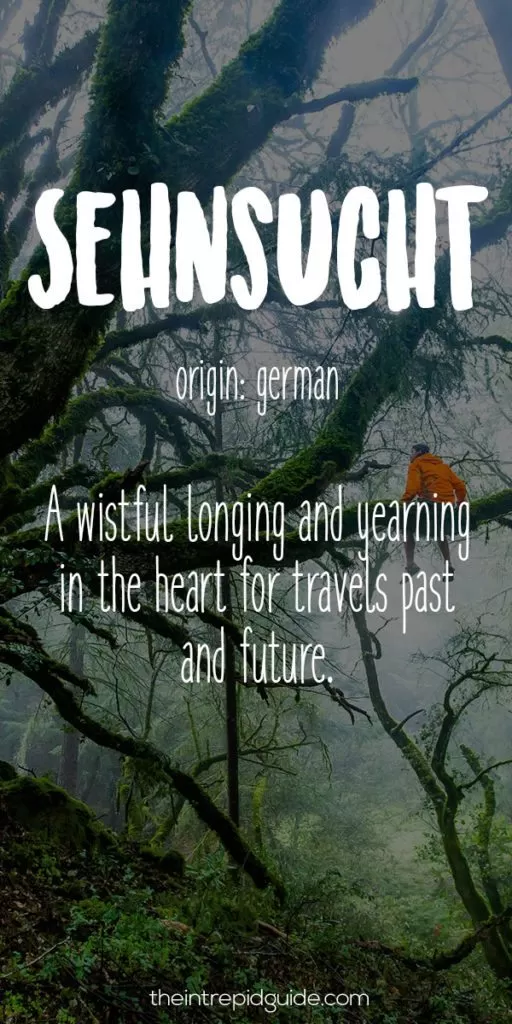
6. Eleutheromania (n.)
Origin: Greek
Definition: An intense and irresistible desire for freedom.
We all want to be free, and travelling shows us how the freedom in the lives of others that is different from our own. Eleutheromania describes a person who has a strong desire and obsession for freedom.
7. Cockaigne (n.)
Origin: French , Middle French
Definition: An imaginary land of luxury and idleness.
Every destination seem like a wonderland or cockaigne before you set foot there and see it for yourself.
The term c ockaigne ” comes from the Middle French phrase pais de cocaigne, which literally means “the land of plenty.” The word was first popularised in a 13th-century French poem that is known in English as “The Land of Cockaigne.”
8. Quaquaversal (adj.)
Definition: Moving or happening in every direction instantaneously.
This perfectly describes my state when I’m in a new place and want to see and do everything at once.
9. Dérive (n)
Origin: French
Definition: A spontaneous and unplanned journey where the traveller leaves their life behind allows themselves to be guided by the landscape and architecture.
Literally translated as “drift”, dérive is the idea that even if you drift you will end up on the right path. This could describe life in general, but it also describes small journeys. When you’re wandering through a new city and you just happen to wander on a path that takes you to great discoveries.
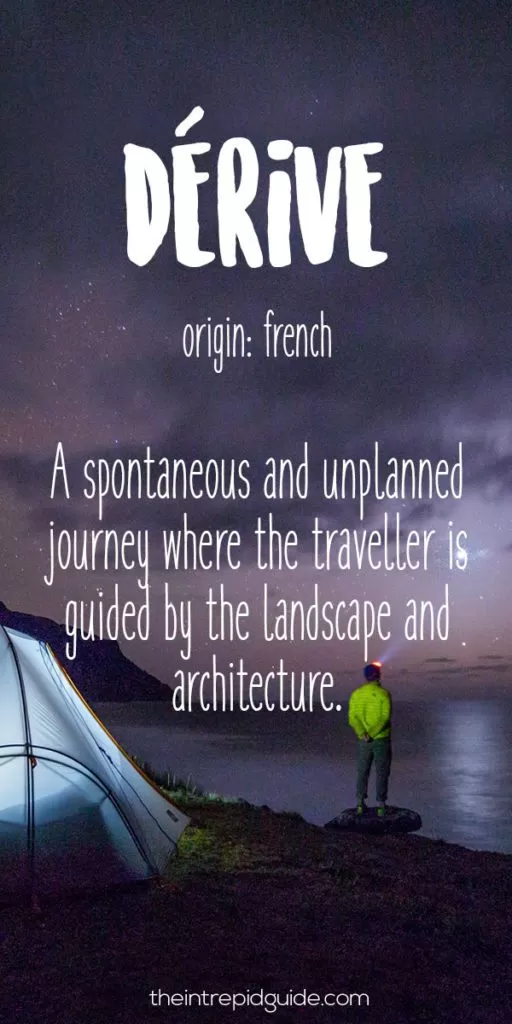
10. Ecophobia (n.)
Origin: English
Definition: This word came into English word via Greek and means a fear or dislike of one’s home.
I don’t dislike my home, but recently I can’t stop thinking about going back to Lofoten, Norway.
11. Numinous (adj.)
Definition: A powerful feeling of both fear and fascination, of being in awe and overwhelmed by what is before you.
Originally, this word refers to having a strong religious or spiritual quality; but it can also be used to describe how you feel when you see things that are so beautiful that you realise how wonderful the world is and the small part you play in it. Hiking Trolltunga was a numinous moment for me.
12. Schwellenangst (n.)
Definition: Fear of crossing a threshold to begin a new chapter.
From s chwelle (“threshold”) and a ngst (“anxiety”), this word explains that feeling you get before deciding to set out on a new journey. Argh! Did I make the right decision?
13. Strikhedonia (n.)
Definition: The pleasure of being able to say “to hell with it”.
Another personal favourite word on this list. Not only is it the joy I feel, but the freedom to be able to say “to hell with it” and book that next trip and embark on your next adventure.
14. Vagary (v.)
Definition: A whimsical or roaming journey.
From Latin, vagārī meaning “ to roam”, is an unpredictable idea, desire or action to travelling without knowing the destination, and not caring.
15. Livsnjutare (n)
Definition: Literally meaning, “enjoyer of life”, this describes a person who loves life deeply and lives it to the extreme.
If you’re reading this, that’s probably you! Need more inspiration?
16. Commuovere (v.)
Origin: Italian
Definition: To stir, to touch, to move to tears.
Just like the euphoric emotions I felt whilst whale watching.
17. Sturmfrei (adj.)
Definition: The freedom of being alone and being able to do what you want.
Literally translating to “stormfree”, this describes the freedom of not being watched by others and being alone in a place where you have the freedom and ability to do what you want.
Another great German word. Travelling solo can be especially rewarding because you have complete control. No compromises, no one else to please. Just you and the big wide world.
18. Saudade (n.)
Origin: Portuguese
Definition: This Portuguese word describes the emotional state of nostalgia and longing for someone or something distant. S audade was once described as “the love that remains” after someone is gone.
Saudade is the recollection of feelings, experiences, places, or events that brought excitement and happiness but now triggers the senses and makes one live again.
19. Yūgen (n.)
Origin: Japanese
Definition: A profound and mysterious sense of the beauty of the universe.
An awareness of the Universe that triggers emotional responses too deep and powerful for words.
20. Acatalepsy (n.)
Definition: The impossibility of comprehending the universe.
Henry Miller said “ One’s destination is never a place, but a new way of seeing things. ” Do we ever really understand the world and what we see on our travels, and how they mould us? Sometimes, if at all, it takes time to discover how these things change our lives.
21. Trouvaille (n.)
Definition: A chance encounter with something wonderful.
Whether it’s stumbling across a hidden back street, a quaint cafe, or connecting with a local, trouvaille describes those magical moments we experience in our journeys.
22. Hygge (n.)
Origin: Danish
Definition: Pronounced hue-guh , hygge describes the warm feeling you get while enjoying the company of great friends and all life has to offer.
Hygge is the conscious appreciation of recognising everything you have and enjoying to the present moment.
23. Onism (n.)
Definition: The world is a big place as not everyone will get to see it. Onism describes understanding that we’ll never get to see it all. It’s the frustration of being stuck in just one body that can only inhabit one place at a time. I felt this way before going to Copenhagen !
Similar to the Swedish word ‘resfeber’, onism describes the feeling of knowing that you’ll never be able to see it all. They say that the more you travel, the harder it gets to stay in one place.
24. Novaturient (adj.)
Definition: A desire to change and alter your life.
This was exactly how I felt when I quit my job and moved to Rome . There was this strong urge that pulled me towards my dream of pursuing a life of speaking Italian and travelling. I knew I wouldn’t be living my life if I didn’t go.
25. Yoko meshi (n.)
Definition: This untranslatable gem describes the stress of speaking a foreign language .
The Japanese word ‘meshi’ literally means ‘boiled rice’ and ‘yoko’ means ‘horizontal,’ together it means ‘a meal eaten sideways.’ The Japanese have created a beautiful way of describing the unique kind of stress you experience when speaking a foreign language. Furthermore, ‘yoko’ also references the fact that Japanese is normally written vertically, whereas most foreign languages are written horizontally. Clever, right?
Related: 69 Wonderful Japanese Expressions That Will Brighten Your Day
26. Selcouth (adj.)
Origin: Old English
Definition: When everything you see and experience is unfamiliar and strange, yet you find it marvellous anyway.
It’s that feeling you get when you travel to a foreign land and food, culture, customs, or language, is strange and different to everything you’ve experienced before, yet you love it and find it fascinating.
27. Eudaimonia (n.)
Definition: A state of being happy whilst travelling and everything feels great.
That intense excitement and appreciation when you travel and everything feels great. Seeing the Northern Lights was one of the best experiences of my life, a feeling I won’t forget.
28. Coddiwomple (v.)
Origin: English slang
Definition: To travel purposefully towards an unknown destination.
A brilliant word, coddiwomple is when you have a vague idea of your destination within a care for how long it takes to arrive. A great example is when you go hiking, you know you’ll eventually reach the summit, but every part of the trail along the way is just as beautiful. Like the time I hiked Norway’s Trolltunga.
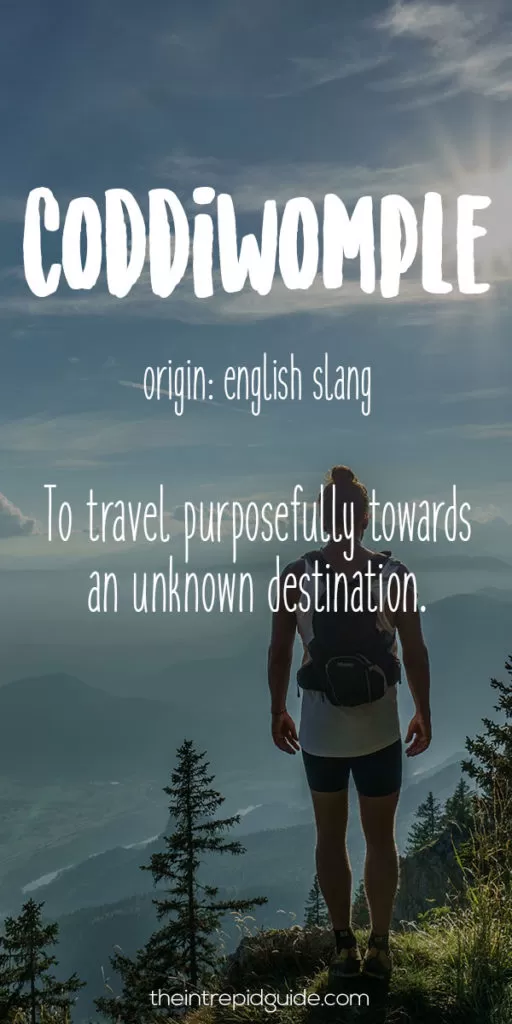
If you enjoyed these words, then let wordsmiths Stephen King, Mark Twain and the Dalai Lama transport you around the world with these inspirational travel quotes or start using some of the beautiful untranslatable words from other languages.
Want to know more about learning languages? Start here!
- 18 Unexpected Advantages & Health Benefits of Learning A Foreign Language
- The World’s Most Beautiful Untranslatable Words from Around the World: The Ultimate List A-Z
- 13 Ways to Seamlessly Integrate Language Learning into Your Daily Life
- What Type of Language Learner Are You? Your 4-Step Personalised Learning Plan
- 15 Top Language Learning Resources You Should Use
- 7 Reasons Why You Should Go on a Language Holiday
- 11 Life-Changing Reasons Why You Should Learn a Language
- How to Learn Your First Foreign Language in 8 Simple Steps: A Beginner’s Guide
- 42 beautiful Inspirational Quotes for Language Learners
- Language learning tips: 11 Polyglots Reveal The Secrets of Their Success
- Top 10 Best Ways to Learn a Language Better and Faster
- How to Learn Italian Before Your Trip
- Free Travel Phrase Guides
- How a ‘Potato’ improved my French Pronunciation
- How Many Languages are there in the World?
- Hilarious Idiomatic Expressions that Will Brighten Your Day
- 78 FREE Dictionaries to Learn a Language Fast [Free eBook Download]
- 22 KEY Travel Phrases That Will Transform Your Travels [Free Guide]
Over to you!
Which one of these travel words do you identify with the most? What others would you add? Let me know using the comments section below or join me on social media to start a conversation.
Thanks for reading and I hope you enjoyed this post.
Like what you see? Subscribe using the form below to have all of my posts delivered directly to your email.
Success! Now check your email to confirm your subscription.
There was an error submitting your subscription. Please try again.
Get my best language and travel tips FREE by email...
Subscribe to my newsletter to receive detailed travel guides, exclusive travel and language learning tips, priority access to giveaways and more!
I will never give away, trade or sell your email address. You can unsubscribe at any time.
Michele creates language learning guides and courses for travel. What separates her from other instructors is her ability to explain complex grammar in a no-nonsense, straightforward manner using her unique 80/20 method. Get her free guide 9 reasons you’re not fluent…YET & how to fix it! Planning a trip? Learn the local language with her 80/20 method for less than the cost of eating at a tourist trap restaurant Start learning today!
Italian Cognates & Loanwords: 17 Rules to Expand Your Vocabulary + FREE PDF
124 inspirational travel quotes that’ll make you want to travel in 2022, 12 comments.
Amazing list! One word I’d add is the Dutch word “gezellig” or “gezelligheid” – similarly to hygge, it describes a feeling of warmth/comfort/coziness/quaintness in certain settings or around certain people.
Thank you so much for sharing this Heba. So interesting to learn that Dutch has a similar word 🙂
This is such a fun article! Love these words and phrases!
Glad to hear it! Thank you so much, Eric 🙂
So many of these describe me or my feelings about seeing the world. But, if I had to pick one, the one that best describes how I choose my destinations would be “selcouth”. I so want to be a stranger in a strange land. To have my belief that there is no such thing as “normal” affirmed again and again and over again.
What a beautiful word. Thanks for sharing, Janet 🙂
Thanks Michele what a wonderful list of inspirational words. It nearly made me cry as I realised that I suffer from acute eleutheromania! ha
Thanks Juliana 🙂 I’m so glad you enjoyed this list. Eleutheromania? I know how you feel hehe
Unique list i must say – If you want to add one more word than check this !
In Hindi language (India) traveler called as “Musafir”
thanks Niraj 🙂
Thanks for sharing this! Really enjoyed it a lot ❤
Thanks Donah, I’m so glad you enjoyed it 😉
Leave a Comment Cancel Reply
Save my name, email, and website in this browser for the next time I comment.
This site uses Akismet to reduce spam. Learn how your comment data is processed .

If you don't know where you are , how do you know where you're going? Find out how well you know Italian grammar today!
- NEW COLOURS
- Classic Tech
- Classic Plus
- Classic Pro
- Classic Flight
- Military Backpack
- Underseat Bags
- Laptop Backpacks
- Gym and Work Backpacks
- Minimalist Backpack
- > Show All
- Classic Cross Body Bags
- Packing Cubes
- British Airways
- Backpack Size Guide
- > More Backpack Guides
- Carry On Luggage Size Guide
- > More Cabin Bag Guides
- Travel Gift Guide
- Digital Nomads Hub
- Travel News
- Destinations
- Product & Style
- Travel Light
- Packing Tips
- Packing Lists
- Air Travel Tips by Airlines
- Luggage Tips
- Pre-flight Checklist
- In-flight Checklist
- Layover Tips
- CABIN MILES
- Backpacks CLASSIC NEW COLOURS Classic Classic Tech Classic Plus Classic Pro Classic Flight ADVENTURE NEW COLOURS ADV ADV Pro ADV Dry MILITARY Military Backpack SIZE 28L 30L 32L 36L 42L 44L SHOP BY FUNCTION Cabin Bags Underseat Bags Laptop Backpacks Daypacks Gym and Work Backpacks Minimalist Backpack
- Shoulder Bags > Show All SHOULDER BAGS Sidekick Flipside Flapjack Classic Cross Body Bags
- Bum Bags > Show All BUM BAGS Hustle Hip Bags
- Accessories > Show All ACCESSORIES Rain Cover Packing Cubes Gift Cards
- Blogs Product Guides Backpack Size Guide > More Backpack Guides Carry On Luggage Size Guide > More Cabin Bag Guides Travel Gift Guide Our Journey Digital Nomads Hub Travel News Destinations Product & Style Cabinzero Travel Tips Travel Light Packing Tips Packing Lists Day Trips Air Travel Tips Air Travel Tips by Airlines Luggage Tips Pre-flight Checklist In-flight Checklist Layover Tips
15 Benefits of Travelling and Why Travel Is Good for You
What comes to your mind when someone asks you about “travel”? Does travel mean a vacation on the beach while sipping some margaritas, an adventure to the unknown, or an Instagrammable sunset destination? The idea of travelling varies from person to person, but the advantages of travelling are unbounded.
When you travel, not the trip or the vacation itself, but the whole process of planning, exploring, and returning from a trip is important. When you realise how the benefits of travelling can do wonders for you, you definitely will have the motivation to pack your bag and start travelling more. What is it about travelling that always makes you feel good after coming back from a trip? There are so many advantages behind travel, but here are the top 15 benefits.
The Health Benefits of Travelling: Travelling Improves Your Health and Mind
Improving your well-being is one of the fundamental benefits of travelling. Travelling helps to decrease the risks of heart attack and anxiety, while developing our brain health. There have been studies proving that travel can place a positive impact on our heart health. One study from Framingham Heart Studies Organization published in the American Journal of Epidemiology shows that women who would travel at least twice a year had a significantly lower risk of developing coronary heart disease or heart attack compared with those who would only be able to travel once in every six years.
One of the health benefits of travelling is that when you travel to new surroundings, you press a restart button to your body and mind, which brings in fresh energy when you get back to your regular activities. It keeps you physically fit by being active on the journey, exploring nature, hiking, or strolling the local markets. A healthy body means a healthy mind, and the stimulation you get from travelling can boost your productivity and effectiveness in your daily work.
Exploring a new place, trying new things, and pushing yourself out of your comfort zone can increase the level of dopamine in your brain. This will contribute to how we strive, focus on things and find things interesting. Remember, “Travel and change of place impart new vigor to the mind,” said the Roman philosopher Seneca.

Source: unsplash.com
The Advantages of Travelling: Travelling Improves Your Communication and Language Skills in Many Ways
Some people enjoy the idea of travelling because it allows them to meet new people from all walks of life. Speaking to new people and getting new perspectives will change how one perceives the world and easily get engaged in various topics of conversation. Travel really helps in consolidating both effective communication and social skills as you are exposed to different cultures and outlooks. This benefit you get from travelling can be applied not only to your personal life but your work life also .
Setting foot in a new part of your country or a new part of the world means you are out of your ordinary comfort zone. Everything is new and captivating to your curiosity. The benefit of this is you are eager to learn new things and open to new ideas and concepts. This will naturally lead to the urge to open your mind and practice your people skills, whether you travel alone or with someone else.
Travelling is when creativity comes into play in your daily communication. When you travel to a new country, there are situations where you would have to use not only verbal communication but also gestures and other non-verbal ways to express yourself. Whether you ask for directions, buy ingredients at a local market or have a conversation with a local, be prepared to utilize your body language skills!
The Benefits of Travelling: Hedonistic Travel Ensures Peace, Calms Your Mind and Encourages Positive Feelings
When going on a holiday, we often tend to be stimulated, present and be in the moment, which brings us a step closer to achieving mindfulness. Travelling alone brings in the feeling of solitude that we don’t often get enough of. Travelling allows us to be disconnected from people, and even technology, for a while, and be more connected to our own mind and self, which leads us to our inner peace.
Whether it is domestic or international travel, travelers step out of their habitat and get exposed to other conditions of life. We find ourselves more thankful for our life and realise what we have might be what others desire. Appreciation to every little thing in life is one way or another a course for happiness.
Travelling also changes our attitude towards life and people in a more positive way. We observe things and think from a broader perspective when our mind is open to the outside world. The benefit of travelling helps us embrace cultural and social differences more when immersing ourselves in a different environment with new people and perspectives. Moreover, coming back from a journey means ticking off one goal and proving our ability to overcome challenges. This forms the positive attitude that helps us tackle the hurdles.
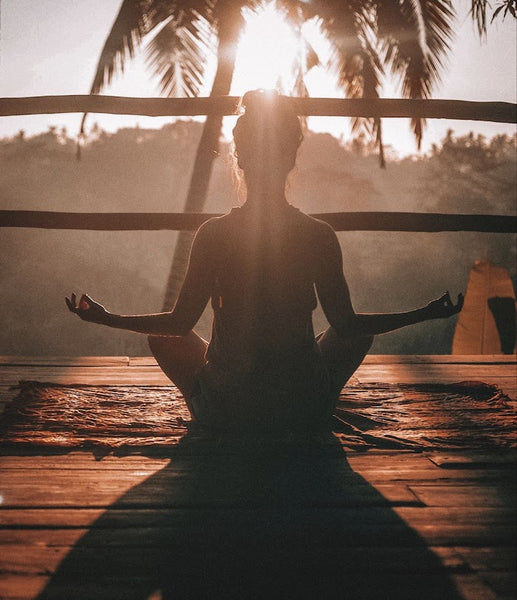
Why Travelling is Good? International Travelling Boosts Creativity through Experiences
“Why would travel have anything to do with creativity?” you may ask. First of all, it is associated with the sense of being innovative. When we travel, we try the local cuisines which we might have never tried before, get exposed to new customs and culture, and get introduced to unfamiliar ideas and beliefs. This stimulates creativity within our thinking, our methods and how we deal with certain situations. It is easier for us to come across new ideas when we get out of our usual surroundings. If we are put in boxes, how can we think “outside the box”?
Travelling teaches you to be creative and that everything has an alternative. What if you bump into a toilet that only has a hole on the ground, or a bathroom without a shower but only a bucket of water? That is travelling forces you to use your creativity to roll along with it.
What you might have experienced but not have realised when you travel is that travelling touches your every sense. Ask yourself this question, do you feel a strong sensation by a mellow sound you have never heard, an exquisite taste from local cuisines, an evoking smell from a street food vendor, or a remarkable sight of a magnificent mountain range? If the answer is yes, then this effect of exploring a new place can be an attribute to revitalize your mind and make you more creative when you travel.
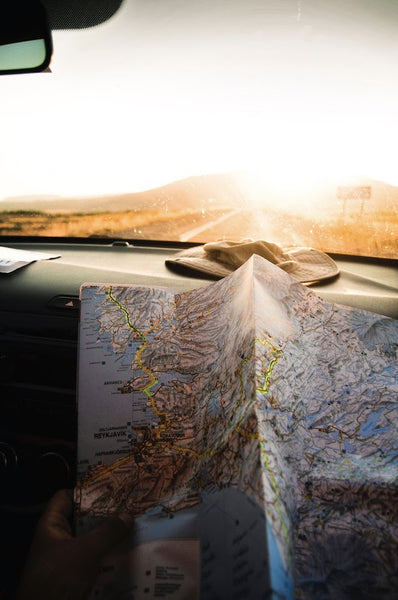
Not only does travelling help with our creativity, but it also enhances our cognitive ability, sometimes referred to as general intelligence. This ability includes the capacity to “reason, plan, solve problems, think abstractly, comprehend complex ideas, learn quickly, and learn from experience” (Plomin, 1999). These attributes are all connected to travel. The more you travel, the wiser you become. Adam Galinsky , a professor at Columbia Business School has stated “Foreign experiences increase both cognitive flexibility and depth and integrativeness of thought, the ability to make deep connections between disparate forms.”
The Benefits of Travelling Abroad: Travelling Enhances Your Tolerance towards Different People and New Cultures
Travelling is more than just about exploring new places. It also allows you to become more tolerant and open towards new cultures and people. It is a great opportunity to connect with locals and other like-minded people from around the globe. When you are willing to strike up a conversation with someone from a different background, the more you understand them and accept diversity, the better your tolerance level gets. Travelling teaches us to appreciate and value cultural diversity, traditions and appearances.

Not only does travelling help us embrace cultural, social and racial differences, travelling also increases our tolerance towards tough conditions and uncertainties. When we throw ourselves into an unfamiliar or less developed locality, we begin to become more accepting. It is not always a bed of roses everywhere we travel to, and things do not always go as planned, however, when we are aware of this, we get less bothered and enjoy the journey as much as we want.
Cabinzero’s CEO Neil Varden shared with us some stories about a time when he traveled to India - a country of hues and colors, and on top of all, a country of kindness. He was deeply touched by how friendly and greathearted local people were when he found out a notion followed in their mind, which is “Guest is God”. As he was travelling to Diu - a very small and unfamiliar town in India - on a bus, he happened to have a conversation with an Indian doctor. And since there was no direct bus to the town and it was very late at night, the doctor then invited him for a stay with his family for the night and offered him the surprisingly good generosity that he had ever received.
Another time when he was on a bus, and there was this Indian woman who offered him some biscuits when he was hungry, while she might not have enough to eat for herself and her children. Those are just among many warmhearted stories that he stumbled upon during his travel that made him realise one thing: you can really meet people who have almost nothing but still are generous with what they have.

The Benefits of Travelling: Travelling Is a Great Way to Boost Your Confidence
Neil also shared an example of how travelling can be a motivation for us to gain more confidence in ourselves and our passion. “Unbeknown to me, travelling when I was 22-26 changed my life long term, even today. The confidence gained by travelling to an unfamiliar country/culture gave me huge benefits when I started my business. I never had much fear knocking on doors of factories or visiting trade shows in countries I had never been to before. AND, for sure, my business and the brand would not exist if I hadn’t travelled. Since I travelled I spent all my time after trying to figure out how I could make travel a permanent fixture in my life and the business was built around this need, it is truly a lifestyle business.” - Neil Varden, CEO of Cabinzero .
Regarding this advantage of travelling, Mary Helen Immordino-Yang, an associate professor of education and psychology at the University of Southern California, says “What a lot of psychological research has shown now is that the ability to engage with people from different backgrounds than yourself, and the ability to get out of your own social comfort zone, is helping you to build a strong and acculturated sense of your own self.”

Stepping out of your bubble to travel, especially alone, is one way to prove that life has no limits. Travelling makes us realise that difficulties and obstacles can be handled well without the help of friends or family. When you see the powerful force within you, you start to build more trust in yourself and fear less. You believe in the certainty that things can be tackled one way or another, and it comes with the creative mind you get from travelling - nothing can stop you from achieving your passion and goals in life!
The Importance of Travelling: You Get Real-life Education from Travelling to a New Place
Real-life education comes naturally when you travel. Think about when you plan for a trip, when you solve a problem, or when you come across a situation that you have to use your body language to communicate. Those circumstances train you to be skillful as you travel. This benefit of travelling helps in your planning skills, problem-solving skills, improvising ability, and such. As you learn from your own experiences, these lessons are what you can equip yourself with and make use of in the long run.
What you learn in books is great, but travelling offers you the opportunity to learn more about something new every day. The moment you step out of those hotel doors and go out on the street, you learn at least one new lesson. Simple things like how people greet and talk to each other, how they behave tell you a bit about their culture. What’s more, travelling teaches you failures can turn into great hands-on lessons. It is true that travelling is not always glorious and can be hard at times. Let’s say the language barriers, for instance, it is surely possible to make mistakes with words here and there. Imagine going to the market and getting mixed up with the words for tomatoes and fish, this could be a bit embarrassing, but that’s where you get to learn.
The Benefits of Travelling: Travelling Make Memories from New Experiences
Do you usually take photos during your travel, or collect items like currencies or souvenirs after the trip? If not then we strongly suggest you to, as this is one of the benefits of travelling that could be valuable to you. Photos, or videos, that are taken from a trip, whether you keep them on your phone or post on social media, can remind you of the good time you have spent. Even an object you take home from the trip can really awaken your memories and feelings.
Memories from travelling are often connected with positive emotions, when you try something new, or the excitement you get from going to a new place that makes you feel at one with yourself and others around you. There are definitely times when you face unexpected obstacles on the journey, however, after you figure how to settle them, those memories are the life lessons that you have got a chance to learn.
If you travel in a big group, special memories from the trip can be turned into engaging stories that can last for a lifetime. When we travel, we are relaxed and open to show our true colors, which even adds more spices to the fun. This is the reason why travelling can be such a great bonding activity for families or groups of friends.
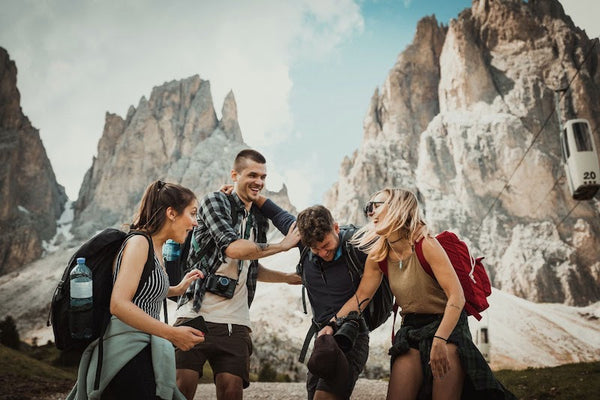
Why Travel is Good for You - How Travelling Helps You Understand Yourself More is Very Important
Travelling alone facilitates a process of introspection, allowing you to reflect on your own emotional and mental well-being. This is a wonderful benefit of travelling that you might not have thought of. When you are away from the stress of your daily life, be present and live in the moment, you are more likely to be conscientious about how you think and feel.
When you travel internationally, you get to observe how you feel being far away from your own culture. You observe the differences in people’s manners and behaviors, how people think and react to specific situations. From there, it is human instinct to compare the differences. You then start to explore and compare how it is different from your own culture and mindset, how other people are different from you, and why. Eventually, travelling will help in the process of understanding yourself more and give you a reflection on how you feel and think.
On the other side of this self-discovery process, travelling even changes you. You are not the same person after returning home from a journey. You have tons of intriguing stories to tell, you are more open and accepted. Moreover, travelling helps you reinvent yourself and re-evaluate your values in life after the lessons you learn on the road. Travelling teaches you to be more patient and curious about the world around you. This benefit undoubtedly helps in understanding and developing yourself.
The Benefits of Travelling: Travelling Helps Reduce Stress and Eases Anxiety
When you choose to leave your daily work to travel, you give yourself an opportunity to be more connected with nature. Fresh air and sunshine are a benefit to your health, fresh air boosts oxygen in your body and sunshine provides you with vitamin D. Being connected to these elements of nature makes you feel calmer, which definitely helps with stress and anxiety.
Whether you are a fan of hiking, cycling, climbing or diving, they are all a cure for depression while you travel. Fun and adventurous activities help you to relieve stress as you get to live and enjoy the moment. Leave your daily hassles away, pack your bag, go on a trip and get some air!

Why People Are Travelling - Travelling Gets You out of a Rut of Daily Life
Travelling is one of the great ways to get out of the hustle and bustle of your everyday life. It frees you from your daily schedule and allows you to have time for yourself to relax and explore. To some people, 9-5 jobs are occasionally mundane and repetitive, which makes a break from work totally a must. It is easy to get stuck in the workload and forget about our purposes and direction in life. Therefore, travelling gives us a pause from ordinary life and helps us get more focused on ourselves.
The Benefits of Travelling: World Travel Teaches Us to Appreciate the Beauty and Fragility of Nature and the Earth
If you ever wander off the rice terraces in the Philippines and Vietnam, dip in the Blue Lagoon in Iceland, or fall in love with the cherry blossoms season in Japan, you definitely feel a great sense of appreciation and gratitude for what Mother Nature has offered. Travelling opens your eyes to the absolutely breathtaking wonders of the Earth, especially if you gaze upon them with your own eyes.
World travellers are people who have witnessed the diversity of nature and wildlife, and how fragile this Earth can be. Travelling is eye-opening and enriching our responsibility of protecting the planet that we are living on. It makes us realise that nature and animals are suffering from human activities and raises more awareness about our crucial role in developing a more sustainable future.

Why Is Travelling Important? Travelling Helps You Find a New Purpose and Forces You to Take Action
For some people, travelling can be a life-changing experience. If you are at an important transition in your life and thinking of making a decision, travelling is a breath of fresh air to slow things down and it gives you time to think it through. If you are looking for a purpose and direction in life, try planning a trip to unfamiliar surroundings and experiencing it as much as you can. What if you see a meaning out of it and figure out what you are looking for?
Believe it or not, travelling can turn you into a better decision-maker. Travelling is about decision-making in the whole process, from planning a trip, to deciding a place to eat, or where to go, you need to be determined and actively leading the way. If you are confident in making those little decisions, it will build up your determination in bigger decisions in life.
Travel Makes You Embrace Your Home and Ordinary Life More - One of The Advantages of Travelling
We often tend to dream of travelling and those days off hitting the road while we’re working 9 to 5. However, when we travel, there are certain situations that you may find yourself miss the feeling of home and how convenient it is to be in your own comfort zone. You will begin to appreciate the essentials you have at home when you travel. The feeling of a comfy bed and pillows at home may pop in your mind when you spend days and weeks sleeping in hostels or camping tents. You may miss your own bathroom when you share it with other travellers in dorms and hostels. Those are the little things that you will appreciate when you are back home from a long journey.
What’s more, the language barrier is another aspect that can make you miss home when you travel. Of course, during the trip, you might be able to use some basic communication with the locals and can pick up several phrases here and there. However, you will definitely miss the feeling of being able to join in a more in-depth conversation, discussing politics, or expressing your opinions at some point.
The Benefits of Travelling: You May Find the Love of Your Life When You Travel and Meet New People
“Could you find love on the road?” Yes, it is possible. You meet plenty of like-minded people when you spend days hitting the road. Someone who shares the same values and mindset as you might come along unexpectedly and suddenly you feel connected to them. Especially when you travel, you open your mind and heart to new experiences, therefore, falling in love with someone is very likely to happen.

Travelling can indeed bring people closer, which is why couples choose to spend time together on a vacation to spice up their relationship. But what about meeting a total stranger and falling head over heels unexpectedly, while strolling on the riverside or a random beach? That sounds more intriguing. That random stranger might just be a fling or can turn into the love of your life, who knows?
It caught my attention when you said that you can get helping reducing stress when you engage in fun and adventurous activities while you travel. As you said, traveling gives you an opportunity to be more connected with nature. With this in mind, I will consider finding great travel ideas so I can plan my vacation. Since December last year, I have been feeling so stressed due to the divorce process that I had to go through, so it is important for me to find places where I can feel recharged and relaxed. Thanks for sharing this. https://www.homegrowngreat.com/discover/attractions/
It’s great that you mentioned that one of the health benefits of travelling is that when we travel to new surroundings, we press a restart button to our body and mind, which brings in fresh energy when we get back to our regular activities. My husband and I will go on vacation to a family resort this weekend with our family. I’ll share this with him since we really need to travel more often and destress from work. Thanks! https://edgeofthewilderness.com/resort-lodging-minnesota-northern.html
Interesting article. So many reasons to travel!
Leave a comment
Please note, comments must be approved before they are published
This site is protected by reCAPTCHA and the Google Privacy Policy and Terms of Service apply.
You may also like

- travel for wellbeing
10 Reasons Why Travel is Good for the Soul
- 3 years ago
- Read Time: 5 minutes
- by beblissfultravel
- Leave a comment

People travel for many reasons – to see new things, to experience different cultures, or even just to relax. Whatever your reason for travel may be, know that it is so good for the soul. Traveling can help you learn about yourself and others. It can also help with mental health by giving you a break from stress.
Traveling is good for the soul because it expands your perspective on life, helps build confidence, increases self-esteem and empowerment that will stay with you even after travel ends, introduces us to new ideas that improve our lives or the world around us.
Why Is Travel So Important to Individuals’ Wellness?
Individual wellness and travel go hand in hand. Travel is all about the traveler and their experiences – which in return, can have a big impact on their wellness. Travel allows one to explore who they are and what matters most in their life. Others travel because it can help them grow as individuals and become better people. One common thread in both of these reasons is – these are all great for the soul!
Here are 10 reasons why travel is good for the soul.
10 Reasons Why Travel is Good for the Soul
1) traveling expands your perspective on life..
Traveling helps you gain a better understanding of yourself, which is good for your soul. It allows you some space to reflect on what’s important to you. It can also help you discover new things about yourself and can give you a chance to learn what’s important in life. It may even give you the courage to live your dreams.
Traveling helps broaden your perspective on life by showing different viewpoints of what it means to live in this modern world we call home. It might change our views on materialism and promote gratitude for what we have at home.
2) Travel encourages you to learn about new places and cultures.
Learning about new places and cultures is good for the soul because it can increase your knowledge and open up new possibilities. Traveling gives you a chance to experience different cultures, which is good for the soul because it brings us closer together as humans.
When travel exposes you to new ideas or ways of thinking about the world, we are introduced to new ideas that help improve our lives or the community around us.
3) Travel allows you to meet people from all over the world.
Meeting people while traveling provides well-rounded energy and growth for the soul – you’re more likely to have fun and it can also be an excellent opportunity for cultural exchange.
Travel can create strong social bonds because travel brings people together. Travel helps break down barriers by encouraging exchanging ideas and helping us get out of our comfort zone. Crossing borders helps us cross the mental borders that divide people. It allows us to meet new friends or even find love at any stage in life.
4) Travel helps grow relationships with your friends and family.
Traveling creates social connections that help boost happiness. It helps us connect on deeper levels, which leads to better relationships. When traveling with loved ones, we can strengthen family relationships. Traveling brings families together because it’s something everyone can enjoy – no matter the differences. It’s a great way to create memories that will last a lifetime.
Traveling also helps strengthen bonds between friends. Traveling together provides the opportunity to connect over shared experiences and stories. You’ll have memories that last a lifetime with your travel buddy.

5) Travel helps you to disconnect.
Traveling helps you disconnect from work or even just the daily grind of life. It gives us a chance to recharge, catch up on sleep, or even go back to our normal routine. It also gives you the opportunity to focus more deeply on things that make us happy like family, friends, hobbies, etc. Stepping away and disconnecting gives us time to reflect on what’s important in life and focus on living in the moment.
6) Solo travel gives you new challenges and self-growth.
Solo travel is good for the soul because it gives you an opportunity to connect with yourself. Traveling alone provides time for self-reflection and introspection, which can be healthy. It’s also a chance to try new things by yourself and build more independence. You have the freedom to do so at your own pace and have the opportunity to make decisions without consulting anyone else.
Solo travel helps build confidence, which is good for the soul because it boosts self-esteem and increases feelings of empowerment that will stay with you even after travel ends.
7) Traveling helps you discover new things about yourself.
Travel is essentially an inward journey of self-discovery, which can be extremely rewarding and enlightening for the soul. Travel allows us to get in touch with our spiritual side. There are endless possibilities for your soul to discover when traveling.
8) Traveling is good for mental health.
Travel is good for your mental health. Studies show that traveling can help decrease anxiety and depression symptoms. Going on vacation may improve feelings of well-being. It gives us a chance to relax which in return can improve our mood. Travel has been shown to boost creativity and productivity.
Traveling has the power to turn a bad day into an amazing one! It gives you more energy, which helps boost your happiness levels as well as your health.
9)Travel can increase our wellbeing.
The healthier you are the more your soul will flourish. Travel helps us to relax, sleep better and be more productive. Everyone should find opportunities to disconnect and recharge their batteries. Walking around a new city or trying exotic fruits and vegetables can aid our health and send good vibes to our souls.
10)Travel is good for your spiritual side.
Traveling helps you get in touch with your spiritual side. Whether it’s traveling to a holy site, the travel itself, or time spent meditating, travel allows us to reconnect spiritually. It allows us to travel with the mind and travel through experience. It helps you connect more deeply with yourself, others, and your surroundings.
Travel is good for the soul! I hope this blog post makes you want to travel more often, if not just go on a short trip in your city – it’s important that everyone experiences traveling at least once in their life.
While travel is good for many reasons, be sure to pay attention to your own needs and follow the travel that best suits you.
What are some of the reasons travel is good for your soul? Share them with us! We’d love to hear from you in the comments section below!
beblissfultravel
Related posts.

75 Beach Instagram Captions to Fuel Your Summer Adventures
- 2 years ago

100+ Travel Affirmations to Inspire Your Next Journey

15 Beach Aesthetic Ideas to Help You Relax and Unwind

11 Reasons Why Solo Travel Boosts Your Confidence
Leave a reply cancel reply.
Your email address will not be published. Required fields are marked *
Save my name, email, and website in this browser for the next time I comment.

Please note: Our website no longer fully supports IE11 , as such you may encounter issues using our website, please try an alternative browser such as Google Chrome, Mozilla Firefox, Microsoft Edge (Windows) or Safari (Mac).

Tourism for Good
A roadmap for rebuilding travel and tourism.
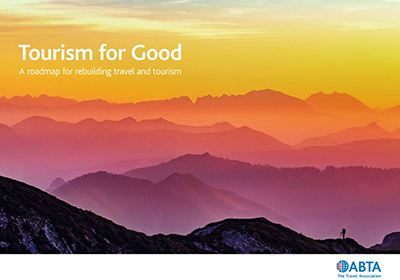
At ABTA we believe that travel and tourism is a powerful force for good: creating economic and social value, sustaining jobs,supporting businesses and boosting inward investment not only for destinations where many livelihoods depend on tourism, but also here in the UK, where it makes a significant contribution. Tourism will also increasingly play a unique and strategically important role in our global trade and diplomatic relationships.
As a sector we also face challenges, including the need to accelerate decarbonisation and to ensure that tourism generates greater benefits for the UK, destinations and local communities. We believe that the best way to make progress, and to maximise tourism’s benefits, is to do so together.
This report recognises the devastating impact of COVID-19 – the travel industry’s biggest ever disruptor. The immediate focus is naturally on business survival and recovery. However, we must not lose sight of the urgent challenges that we faced before the pandemic and will continue to face.
The universal and global nature of the crisis has reminded us of how we and our world are interconnected, necessitating a concerted worldwide response and a willingness to share and learn from others. This experience should now shape how, as an industry, we approach the other common challenges we face.
Tourism’s unexpected standstill has given us a unique chance to reflect on the type of industry we want to rebuild. Future prosperity depends on putting sustainability at the heart of tourism’s recovery. This can only be achieved by operators, governments, destination managers, partners and communities working together. This is an opportunity to purposefully build back better for a responsible and resilient tourism industry, fit for the challenges we face and a contributor to the global good.
Building on ABTA’s long-standing work on sustainability, this report therefore provides a framework to guide ABTA’s activities to support its commitment to continue to champion sustainability with its Members, the wider travel industry, destinations and customers, as well as ways in which this can be supported by policies and action by the UK Government.
Mark Tanzer, Chief Executive
You might be interested in...
Sustainability.
Synonyms of travel
- as in to trek
- as in to traverse
- as in to fly
- as in to associate
- More from M-W
- To save this word, you'll need to log in. Log In
Thesaurus Definition of travel
(Entry 1 of 2)
Synonyms & Similar Words
- peregrinate
- road - trip
- knock (about)
- perambulate
- pass (over)
- cut (across)
- proceed (along)
- get a move on
- make tracks
- shake a leg
- hotfoot (it)
- fast - forward
Antonyms & Near Antonyms
- hang (around or out)
- slow (down or up)
- collaborate
- take up with
- keep company (with)
- rub shoulders (with)
- fall in with
- pal (around)
- rub elbows (with)
- mess around
- be friends with
- interrelate
- confederate
- cold - shoulder
Thesaurus Definition of travel (Entry 2 of 2)
- peregrination
- commutation
Articles Related to travel

Is it ‘traveling’ or...
Is it ‘traveling’ or ‘travelling’?
A tale of two variants

Noah Webster's Spelling Wins and Fails
Some of his biggest successes and defeats

8 Ways to Get Away From It All
Whether it's a jaunt or a junket, remember sunblock.
Thesaurus Entries Near travel
Cite this entry.
“Travel.” Merriam-Webster.com Thesaurus , Merriam-Webster, https://www.merriam-webster.com/thesaurus/travel. Accessed 1 May. 2024.
More from Merriam-Webster on travel
Nglish: Translation of travel for Spanish Speakers
Britannica English: Translation of travel for Arabic Speakers
Britannica.com: Encyclopedia article about travel
Subscribe to America's largest dictionary and get thousands more definitions and advanced search—ad free!

Can you solve 4 words at once?
Word of the day.
See Definitions and Examples »
Get Word of the Day daily email!
Popular in Grammar & Usage
What’s the difference between ‘hillbilly’ and ‘redneck’, more commonly misspelled words, commonly misspelled words, how to use em dashes (—), en dashes (–) , and hyphens (-), absent letters that are heard anyway, popular in wordplay, the words of the week - apr. 26, 9 superb owl words, 'gaslighting,' 'woke,' 'democracy,' and other top lookups, 10 words for lesser-known games and sports, your favorite band is in the dictionary, games & quizzes.


IMAGES
VIDEO
COMMENTS
Travel entails wishful thinking. It demands a leap of faith, and of imagination, to board a plane for some faraway land, hoping, wishing, for a taste of the ineffable. Travel is one of the few ...
Getting away from home and stepping outside of your usual routine is beneficial for both mind and body. The long-lasting personal benefits of visiting a foreign country far outweigh the costs and time to get there. The great travel writer Pico Lyer said: "Travel is not really about leaving our homes, but leaving our habits."
You travel to do good in supporting the initiation and playing your role in carving its path to, in return, carve your own. Perhaps the good meaning is how exploring a new destination makes you feel. How stepping foot in a completely different setting ignited by new sceneries, smells and tastes make you feel. You travel for that good feeling.
Why travel is the ultimate test of a relationship. Humans' "nomadic strategy meant that we were constantly confronting new environments," wrote learning expert Alison Gopnik in her book ...
Travel for good. As consumers increasingly make more efforts to travel sustainably, we take a look at the phenomenon of conscious travel and what's behind its rise. By Carolyn Beasley • August 7, 2023. 'Sustainable travel' overlaps with many other terms, including conscious, cultural, slow, and regenerative travel. Image credit: Tourism ...
16. Travel Helps You Get Physically Active. In a world where spending all your time in front of a computer is an acceptable way to lead your life, travel gets us moving. Getting from point A to point B requires that we leave the house and get on a plane (or train, car, boat).
6. Lasting memories and experiences. This is one of the top reasons why traveling is important! Traveling abroad gives you the opportunity to create memories that will last a lifetime. From the new foods you will eat to the people you will meet and the places you will visit, every experience will be unique and special.
Travel writer Paul Theroux claims that "...the wish to travel seems to me characteristically human: the desire to move, to satisfy your curiosity or ease your fears, to change the circumstances of your life, to be a stranger, to make a friend, to experience an exotic landscape, to risk the unknown.". Robert Louis Stevenson says, "I travel ...
Here are some of the most important benefits of traveling: 1. Travel Makes You Happier. Sure, a travel experience easily makes you happier by getting you away from your daily grind. And, if you can get away from your parents, kids, freelance work, pets, homework, piano lessons, part-time job, studying for exams or any other things possibly ...
Here are a few insights to show you how Travel & Tourism truly makes a difference to millions of people's lives and their livelihoods: Travel & Tourism accounted for 10.4% of employment in 2019; that is 1 in 10 jobs on the planet. Globally, for every 34 international visitors to a destination, 1 new job is created.
At AFAR we truly believe in the power of travel as a force for good, fueled by our strong, unwavering mission to inspire, guide, and enable people to have deeper, richer, and more fulfilling experiences. We believe that every traveler is a steward of the world. And that being a good traveler means being a good guest.
9. Helps you stay healthy. Austin Ban / Unsplash. In addition to the excitement and adventure that travel brings, another reason why travel is important is its ability to lower stress levels while improving your physical and mental health. Traveling doesn't just mean visiting exotic destinations.
47. "Travel does what good novelists also do to the life of everyday, placing it like a picture in a frame or a gem in its setting, so that the intrinsic qualities are made more clear. Travel does this with the very stuff that everyday life is made of, giving to it the sharp contour and meaning of art." - Freya Stark. 48.
Many people feel that meaningful travel is strictly about going on a volunteering vacation, but there are many ways to make your travel meaningful. Dave and I have always added meaning to our travels. Be it traveling responsibly, raising money for a cause, stopping at sanctuaries or projects, and interacting with the locals, there are many ways to enrich your travels while making your life and ...
Stress is a silent killer. It raises your blood pressure, and your whole mental health will be affected. The stress hormones cloud the judgment and affect the release of happy hormones. When you travel, you are boosting the release of happy hormones to take over the stress hormones.
'What is travel?' is an interesting question, but more for what it tells you about the people doing the asking. The meaning of travel, despite 'definitive' articles to the contrary, is pretty subjective. And your relationship to it changes as you get older and begin to spend your weekends doing things like browsing health insurance ...
12. Travel shakes things up. It sucks to be stuck in a rut. Everyone knows what that's like. A big trip can be your perfect solution. Fly around the world, stopping over in all of the places you've always wanted to visit. Go ahead and plan your ideal route around the world (it's easier than you think!) 13.
Published: February 27, 2020 10:52am EST. Travels on a 'boundless ocean': Scottish philosopher David Hume. PrakichTreetasayuth via Shutterstock. Travel and philosophy have enjoyed a quiet love ...
4. Fernweh (n.) Origin: German. Definition: This German word,means an ache to get away and travel to a distant place, a feeling even stronger than wanderlust. If wanderlust wasn't poetic enough for you, allow me to present fernweh, a German word that literally translates to "distance-sickness.".
The Health Benefits of Travelling: Travelling Improves Your Health and Mind. Improving your well-being is one of the fundamental benefits of travelling. Travelling helps to decrease the risks of heart attack and anxiety, while developing our brain health. There have been studies proving that travel can place a positive impact on our heart health.
8) Traveling is good for mental health. Travel is good for your mental health. Studies show that traveling can help decrease anxiety and depression symptoms. Going on vacation may improve feelings of well-being. It gives us a chance to relax which in return can improve our mood. Travel has been shown to boost creativity and productivity.
Download Tourism for Good: A roadmap for rebuilding travel and tourism. At ABTA we believe that travel and tourism is a powerful force for good: creating economic and social value, sustaining jobs, supporting businesses and boosting inward investment not only for destinations where many livelihoods depend on tourism, but also here in the UK.
Synonyms for TRAVEL: trek, journey, trip, tour, voyage, roam, wander, pilgrimage; Antonyms of TRAVEL: crawl, creep, drag, hang (around or out), poke, linger, lag, loiter